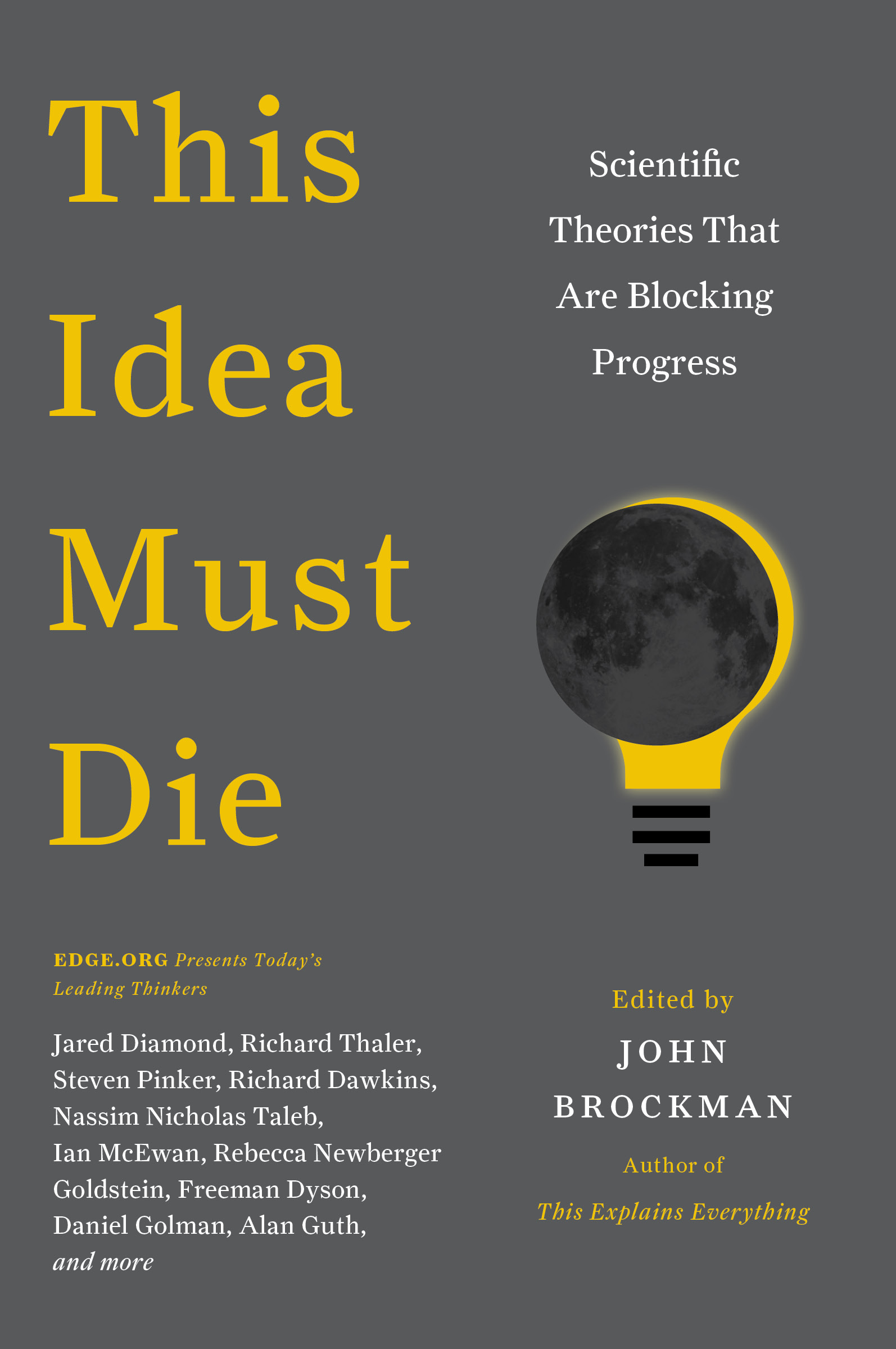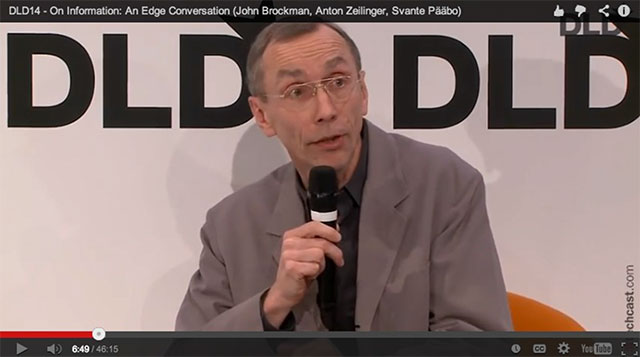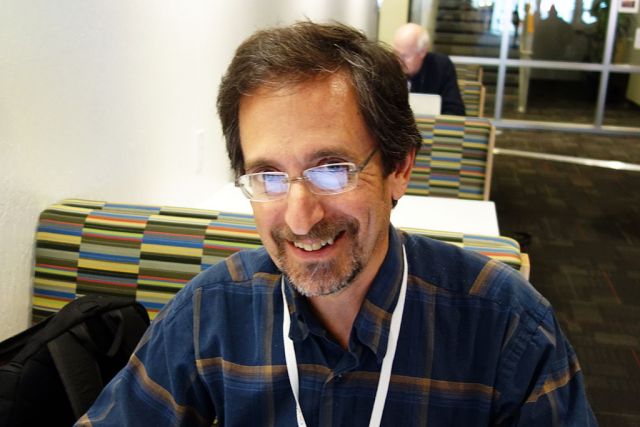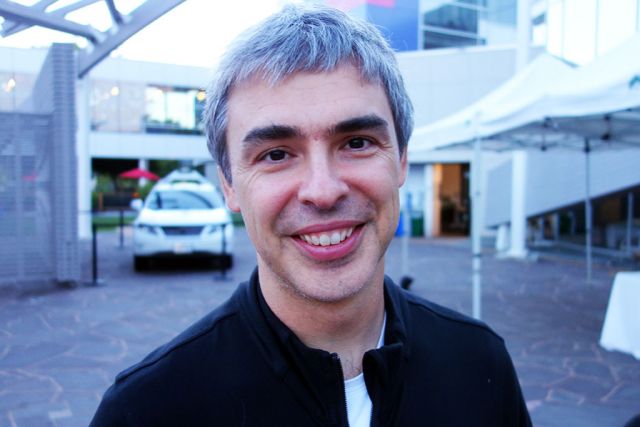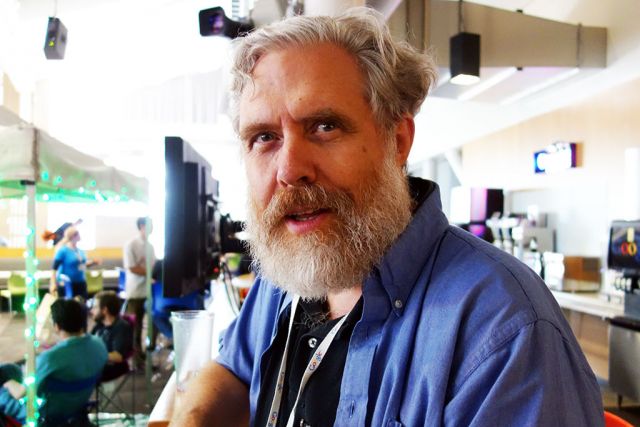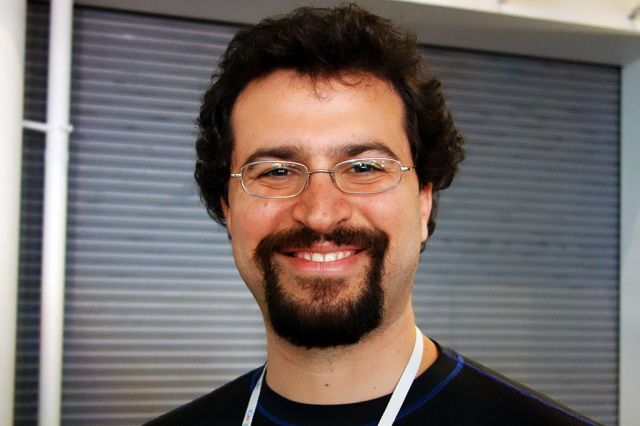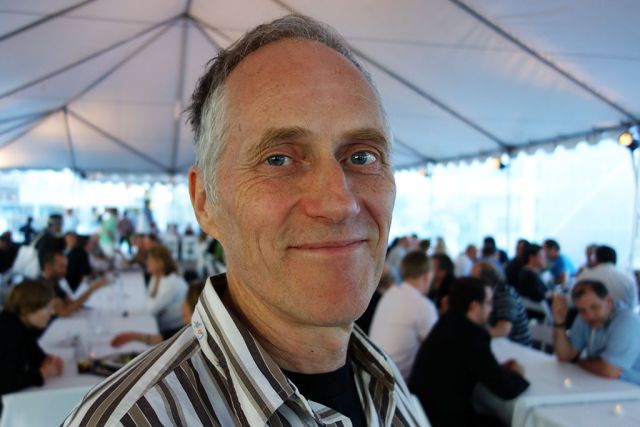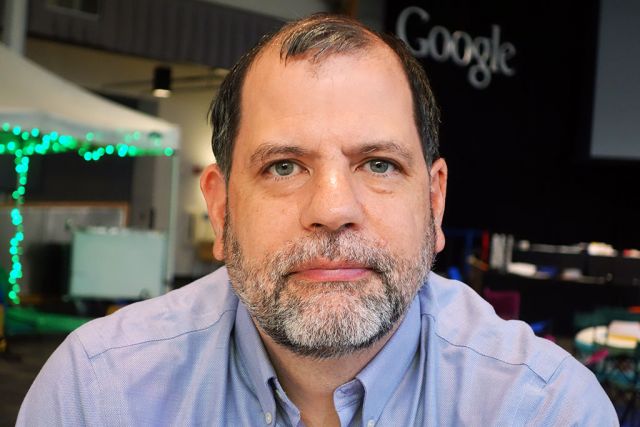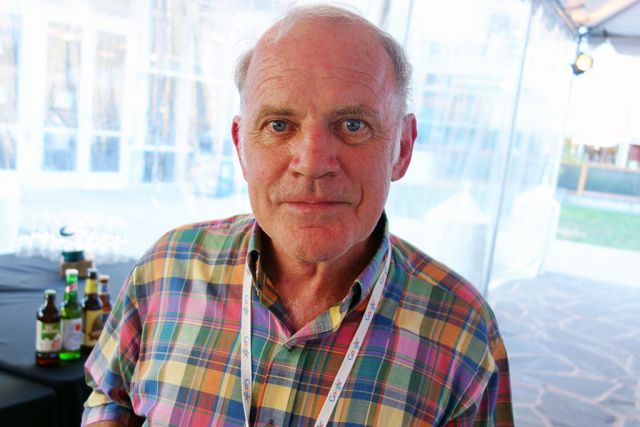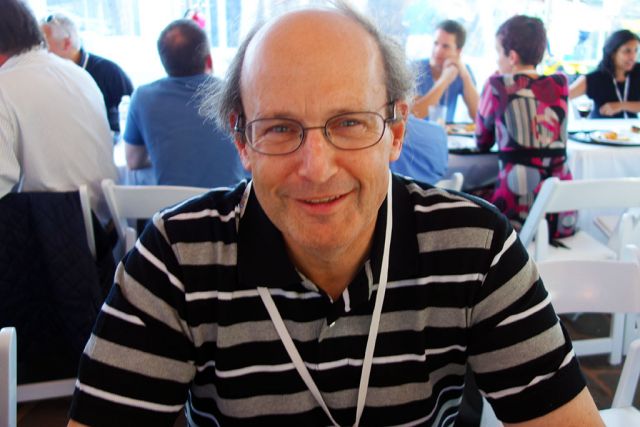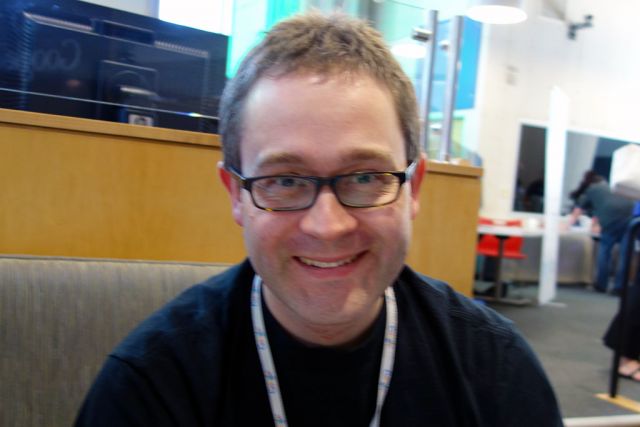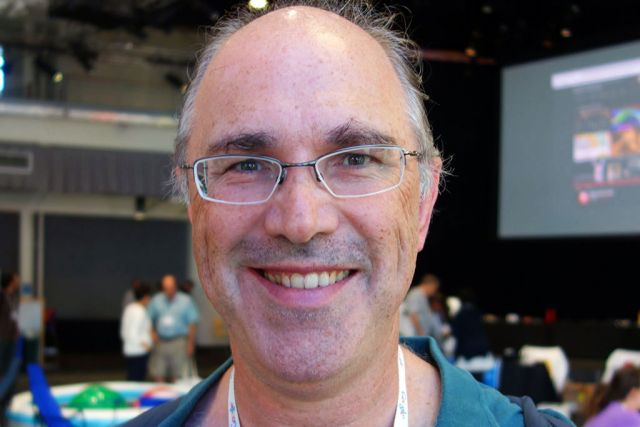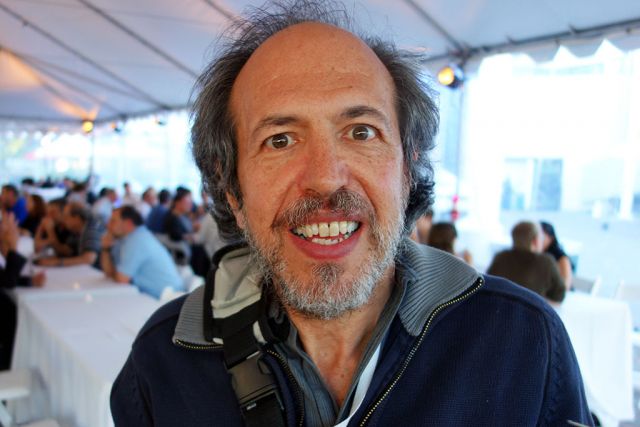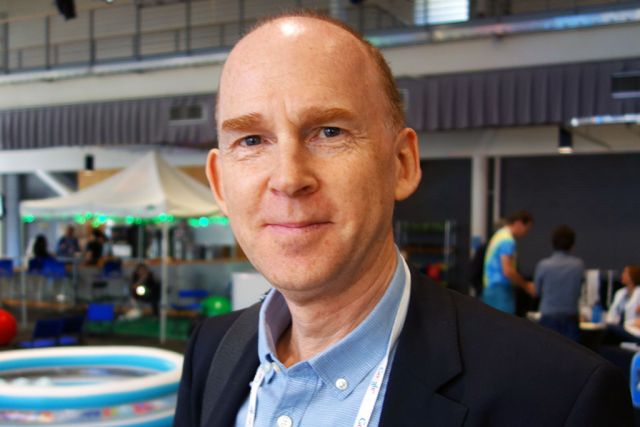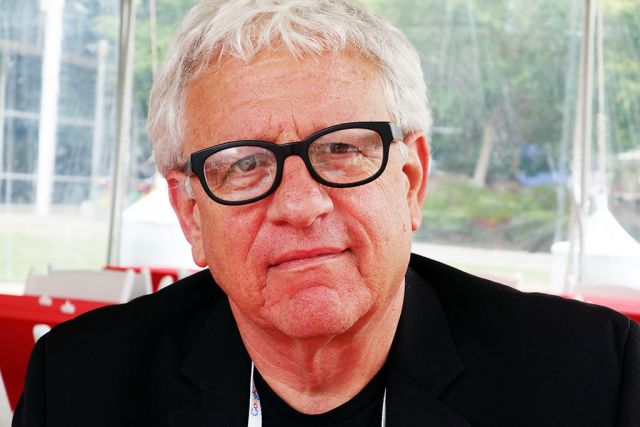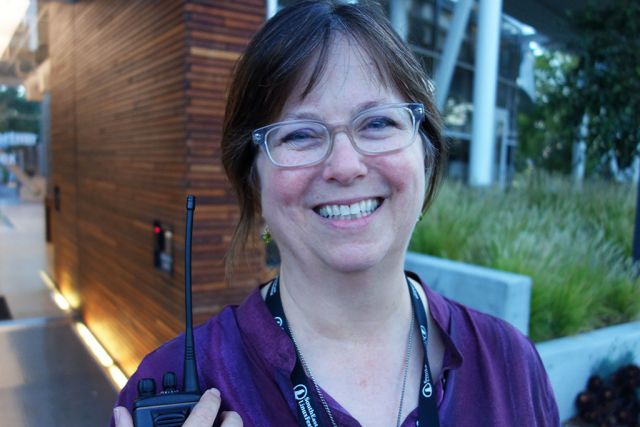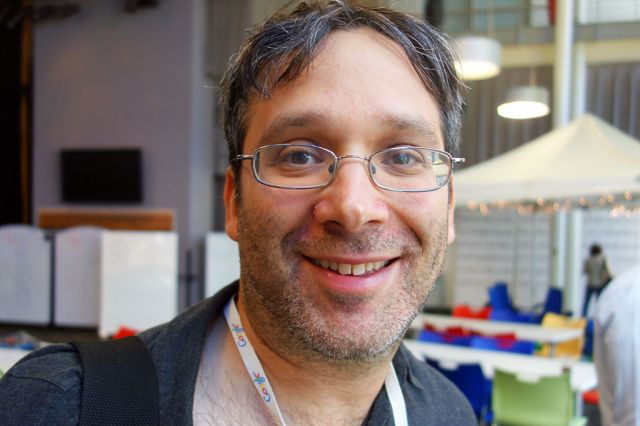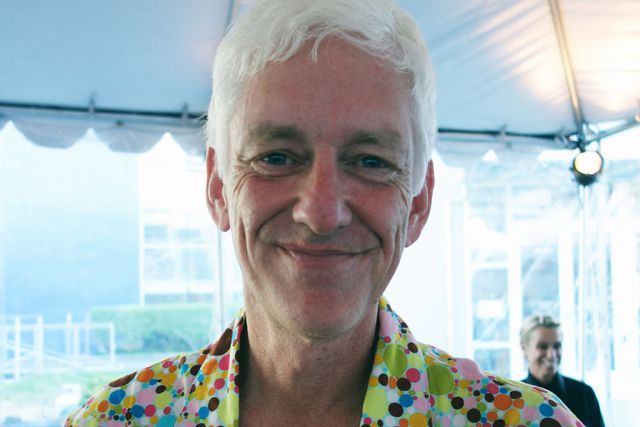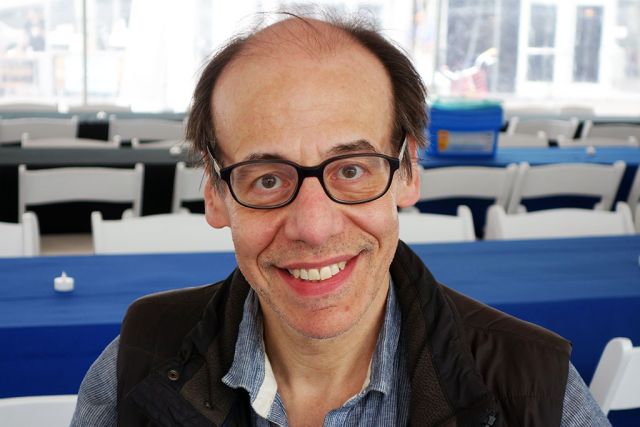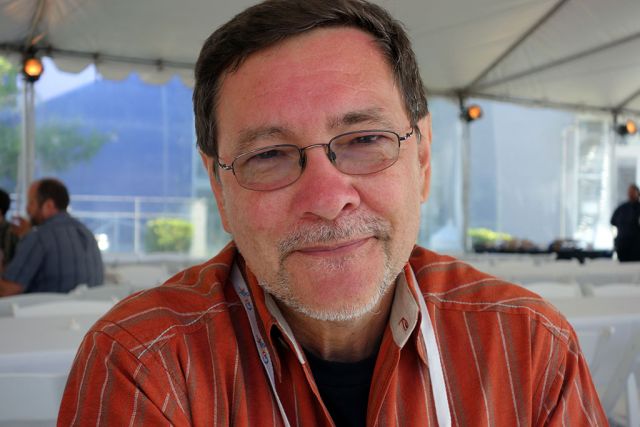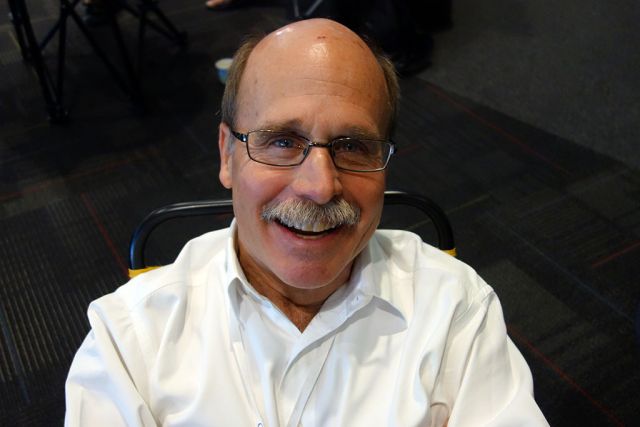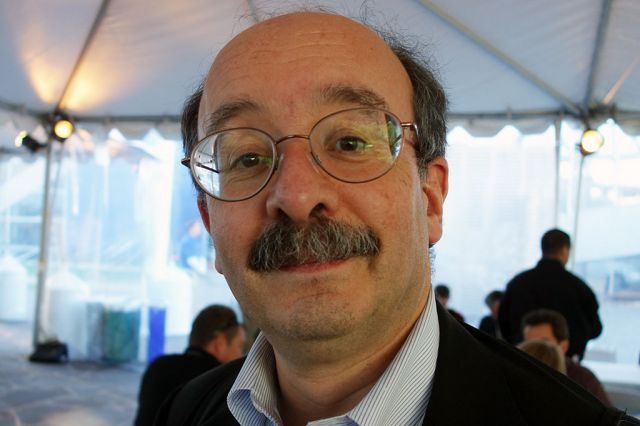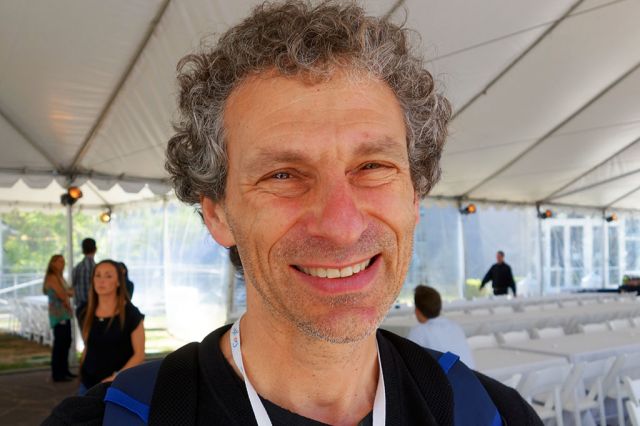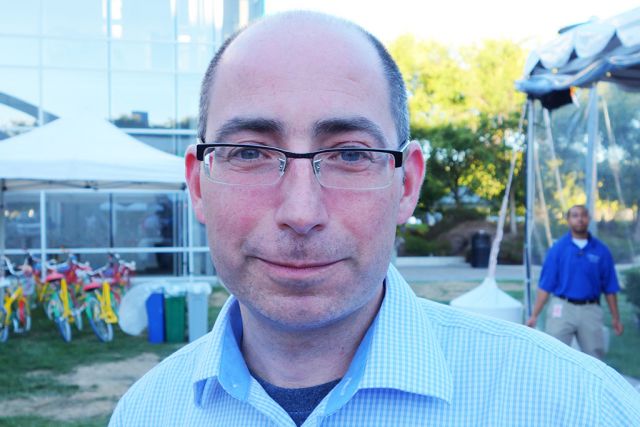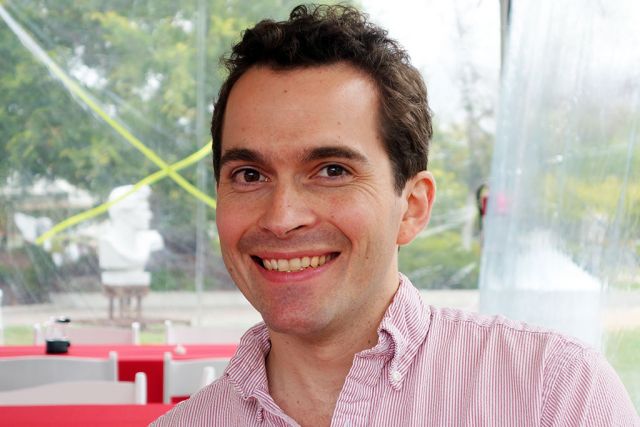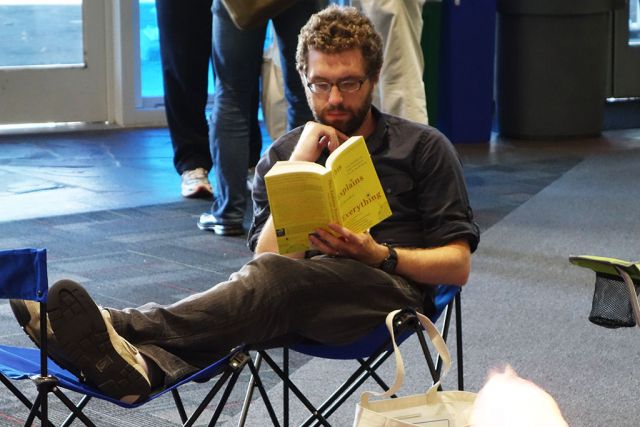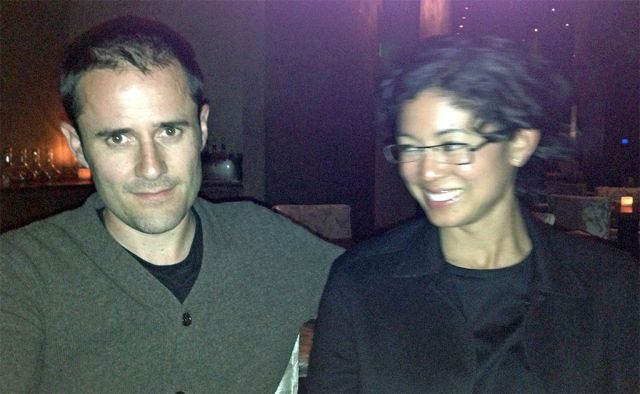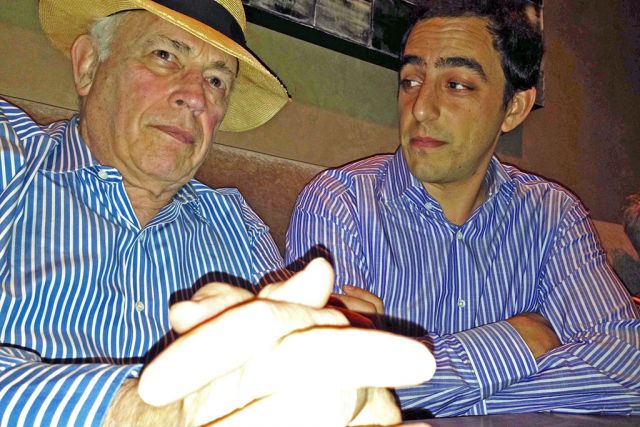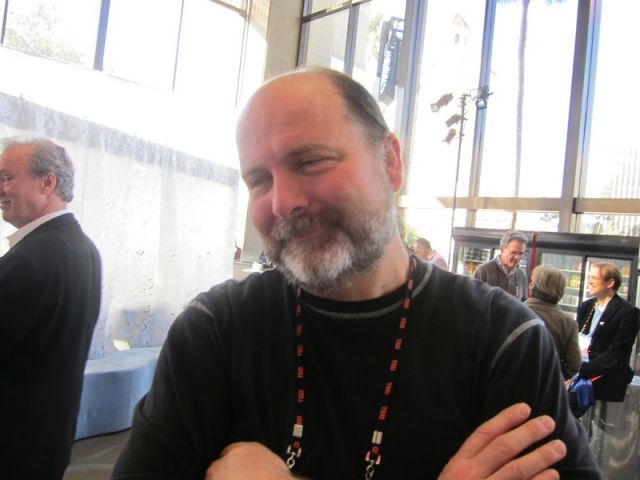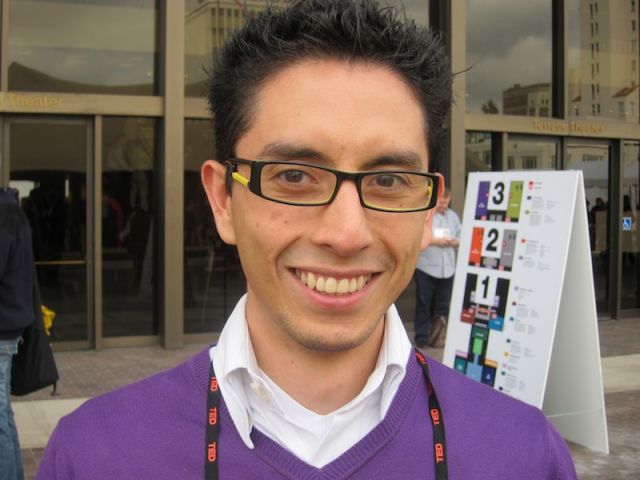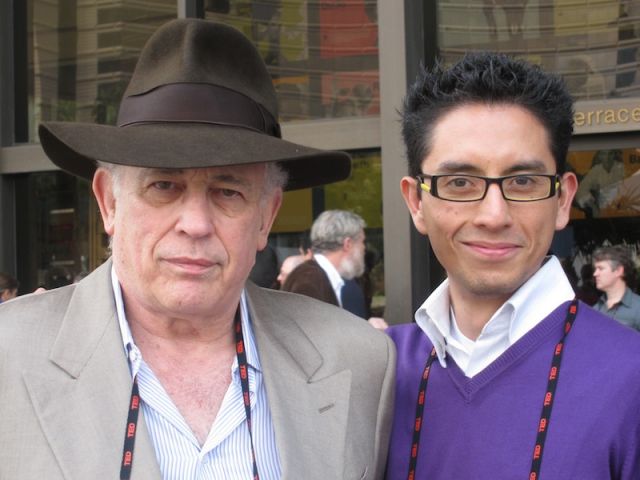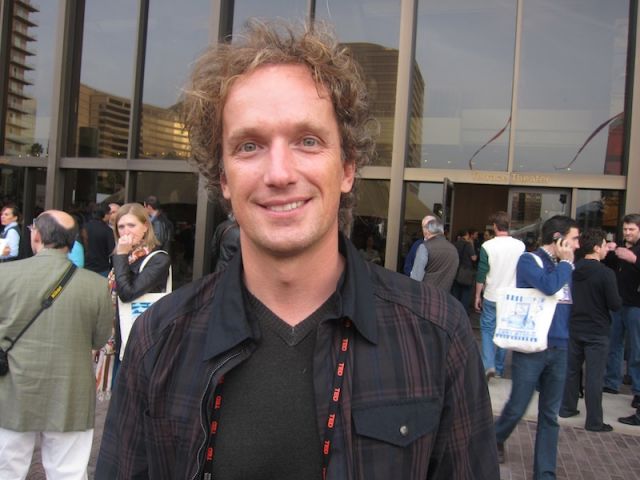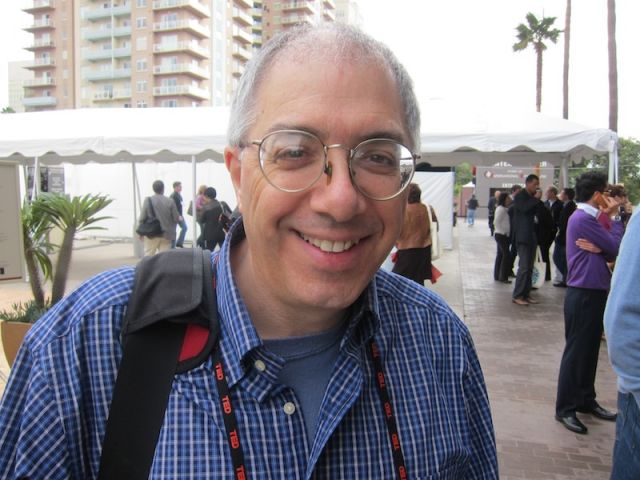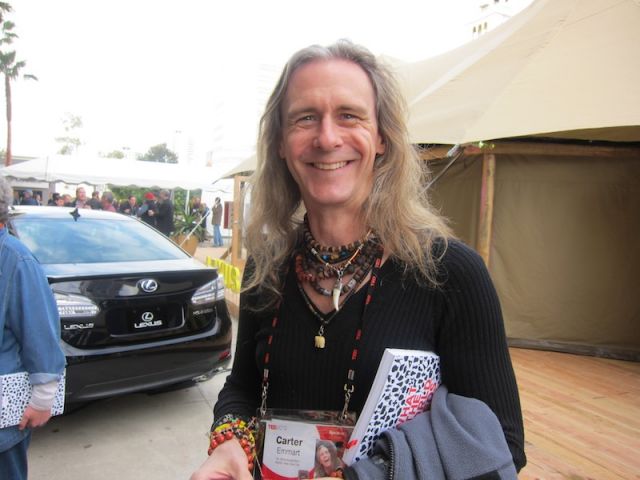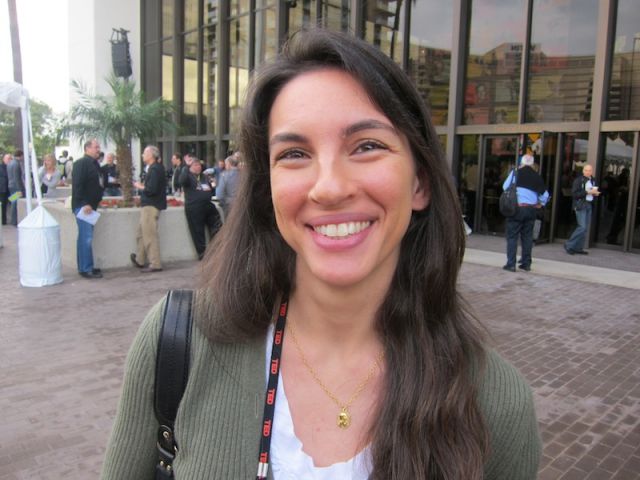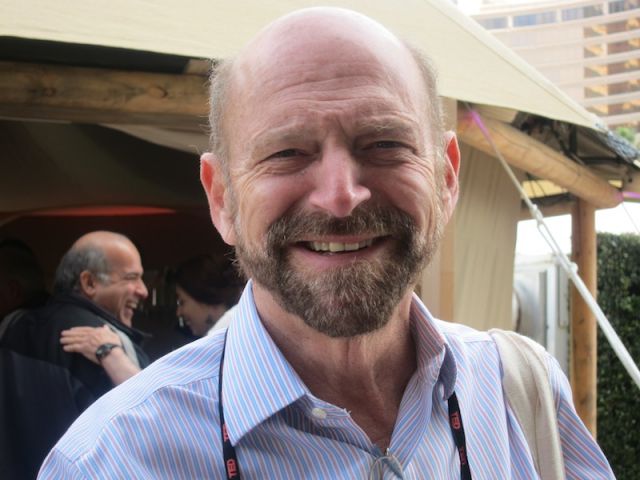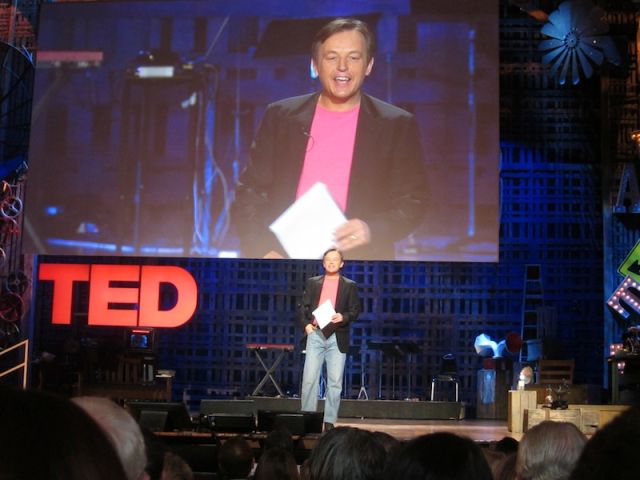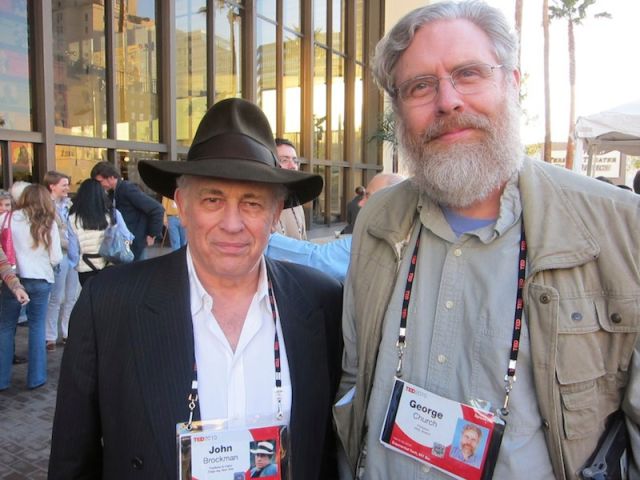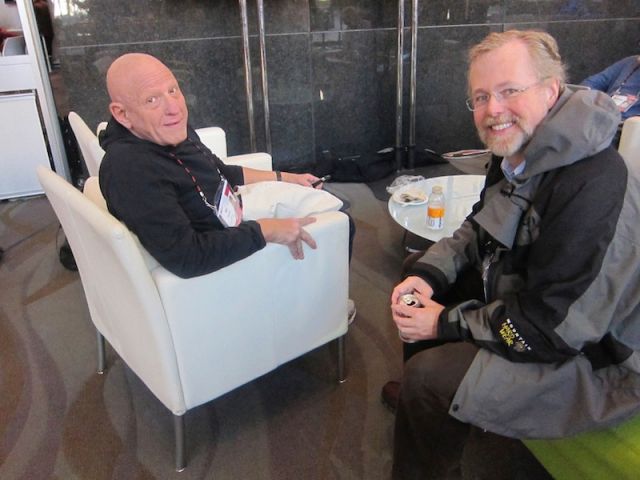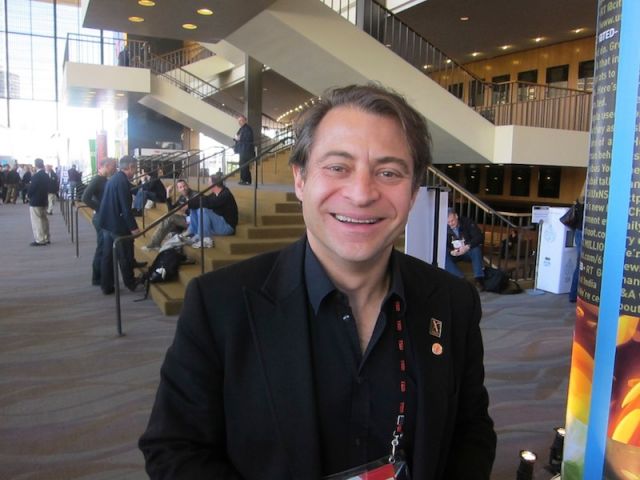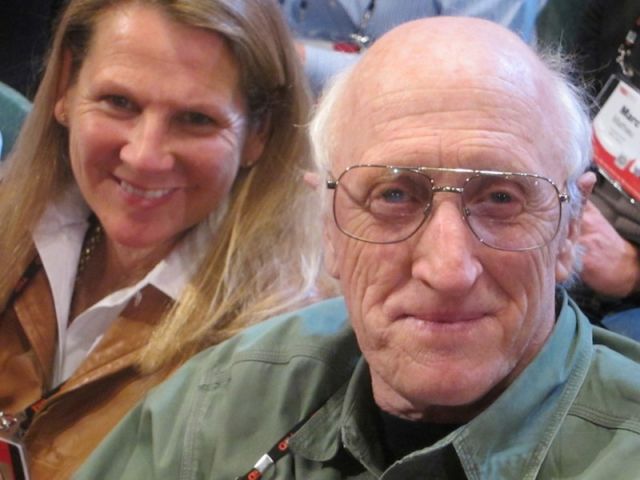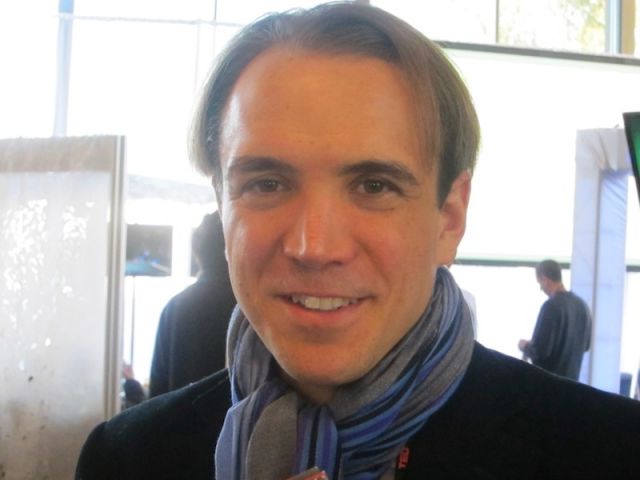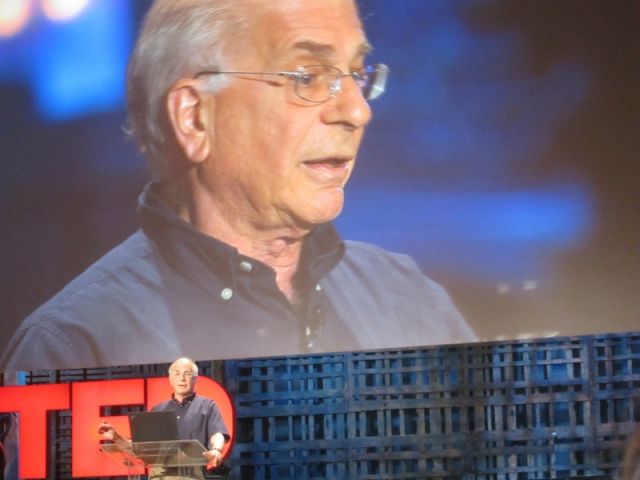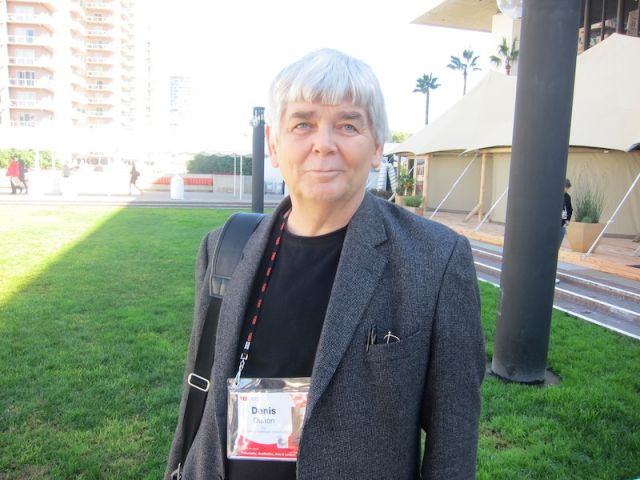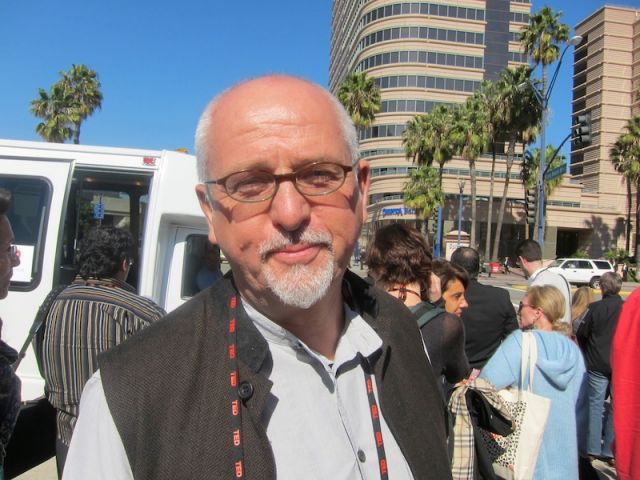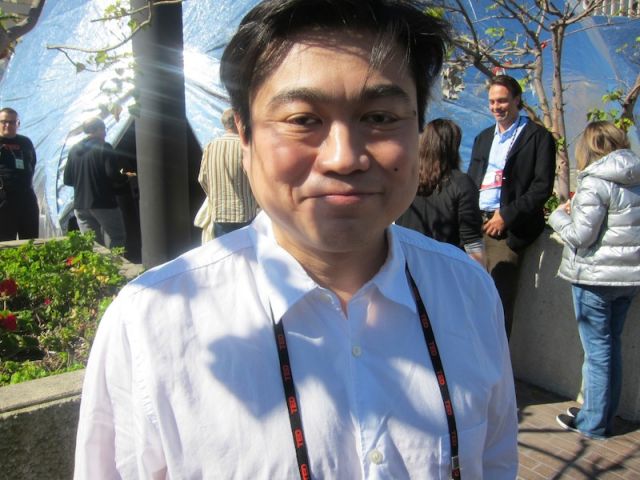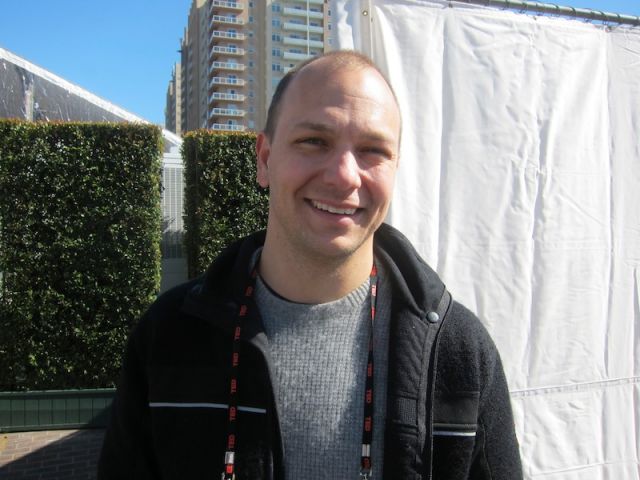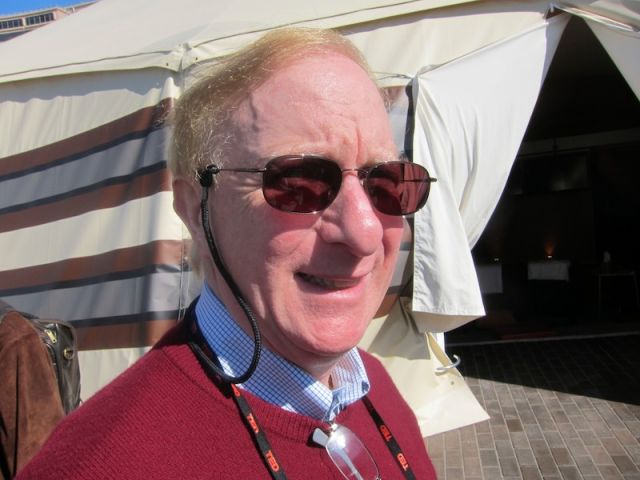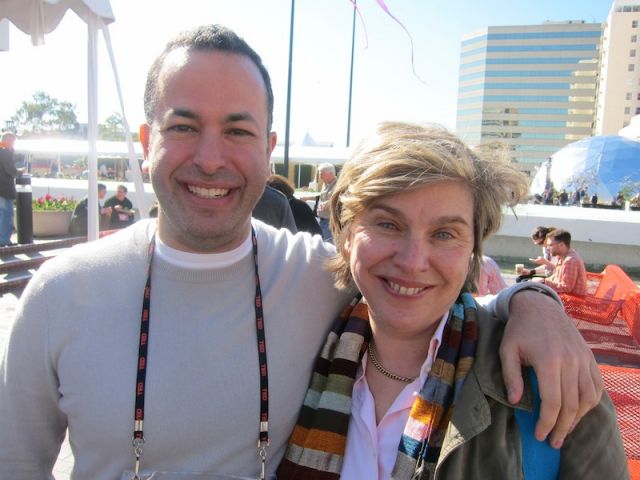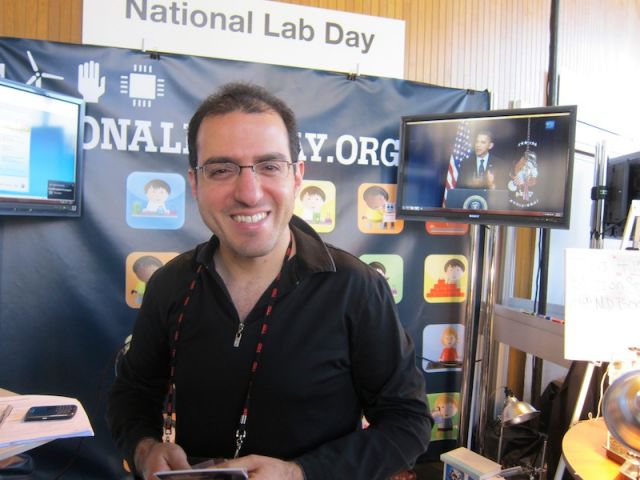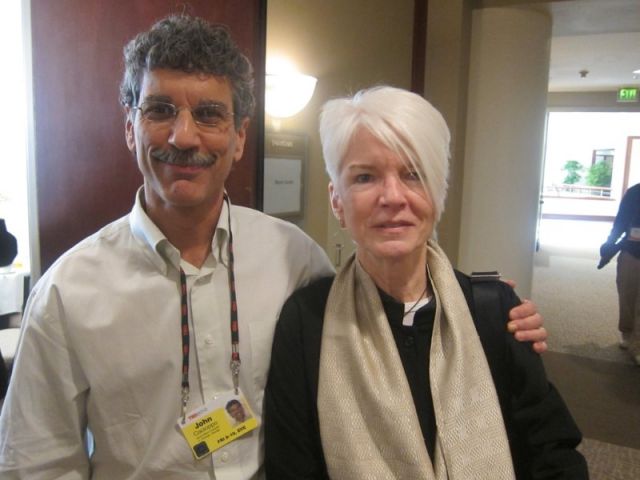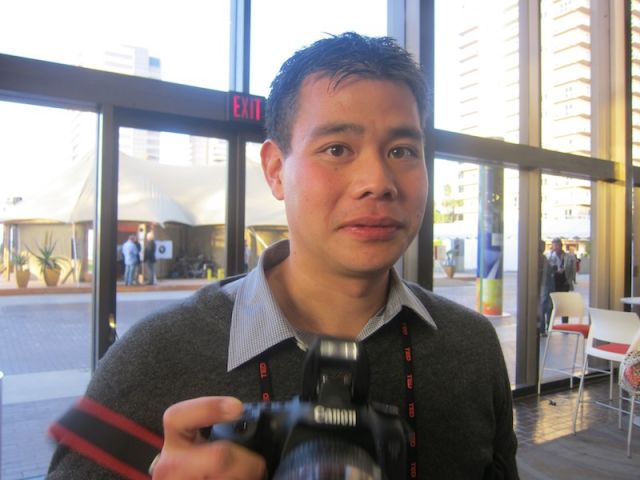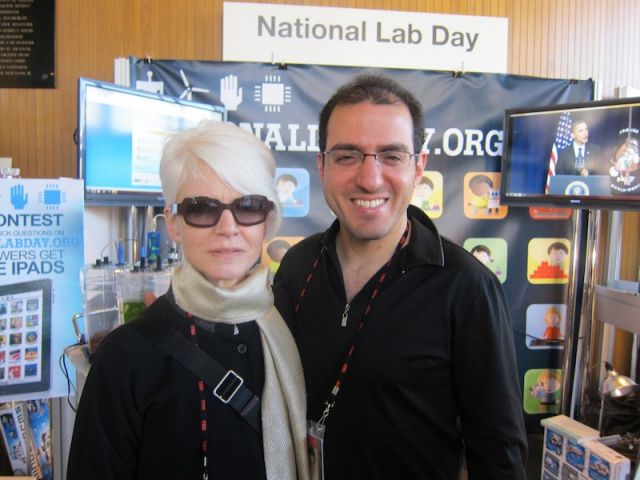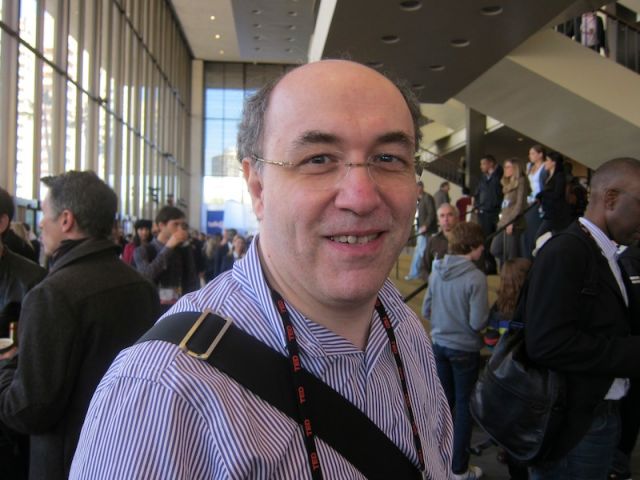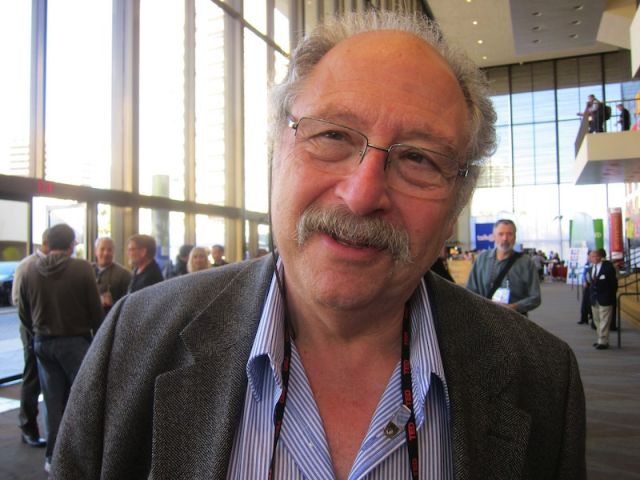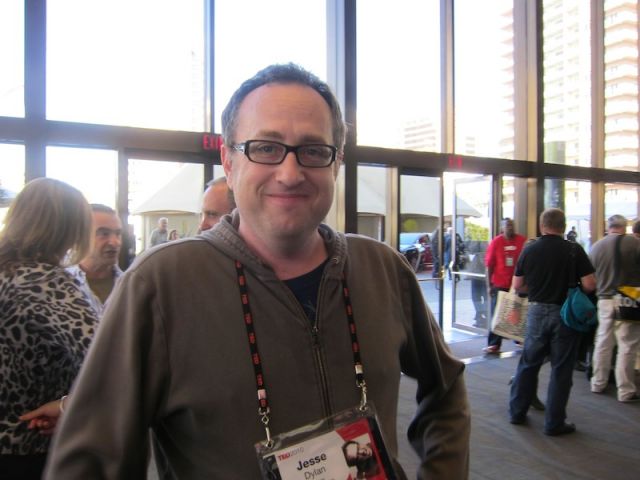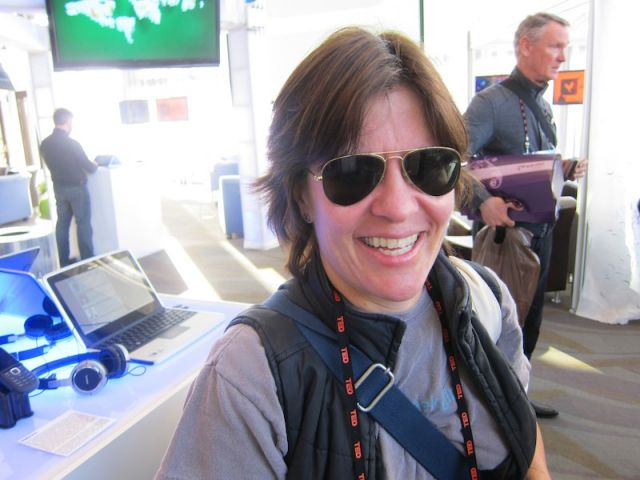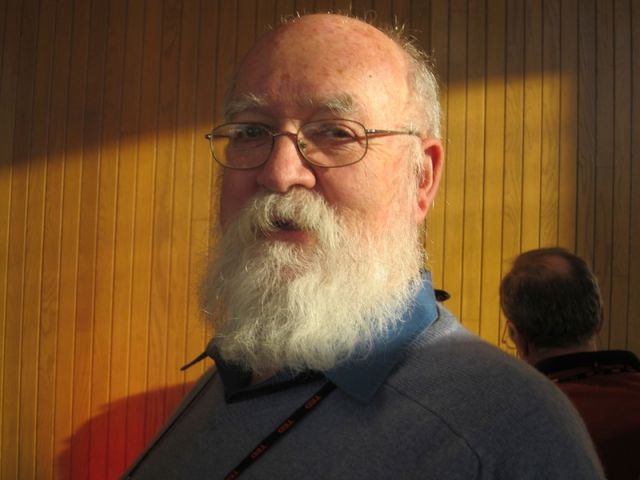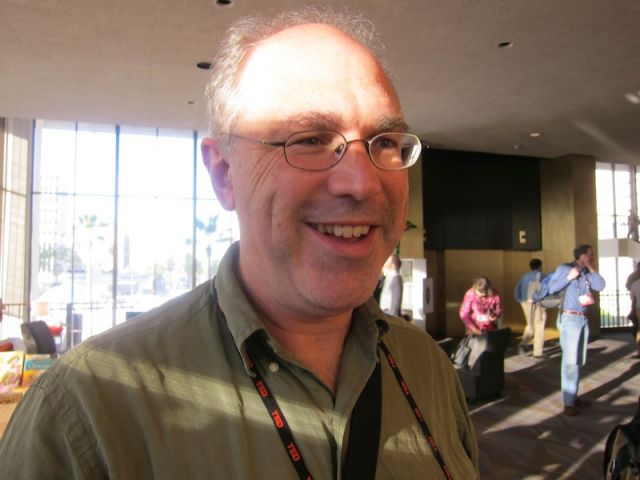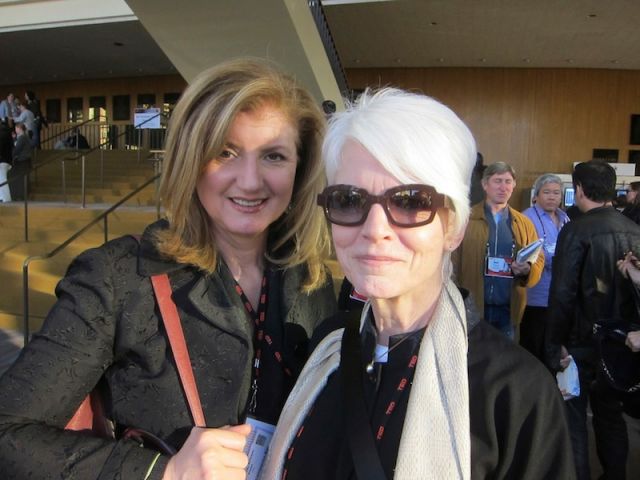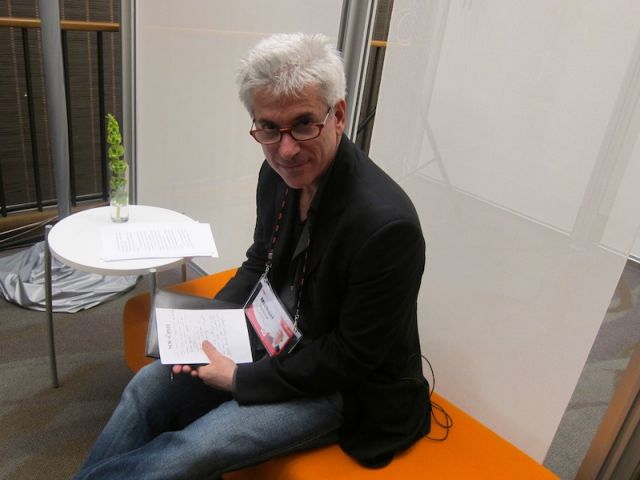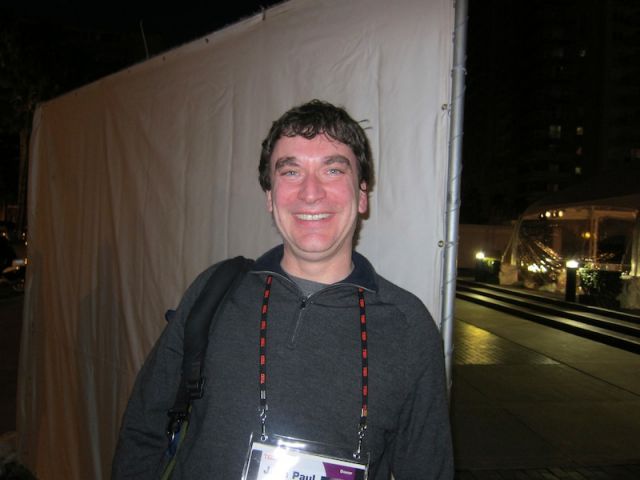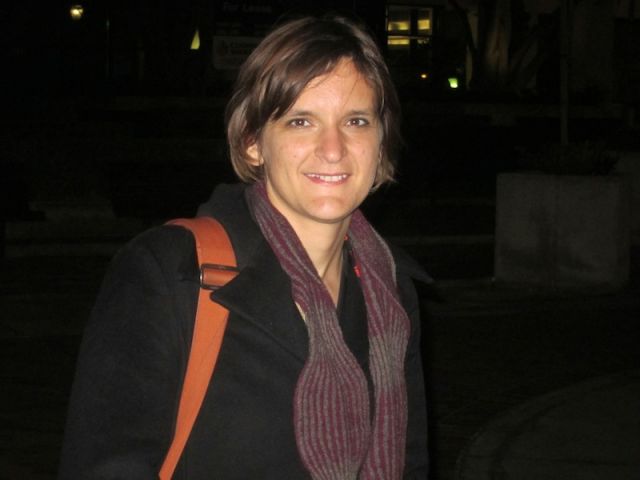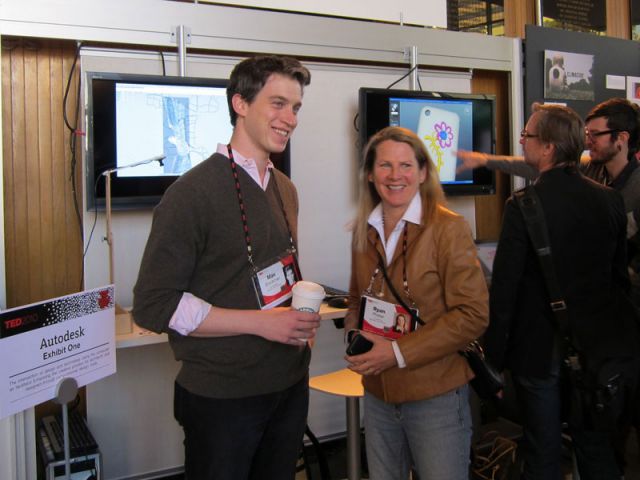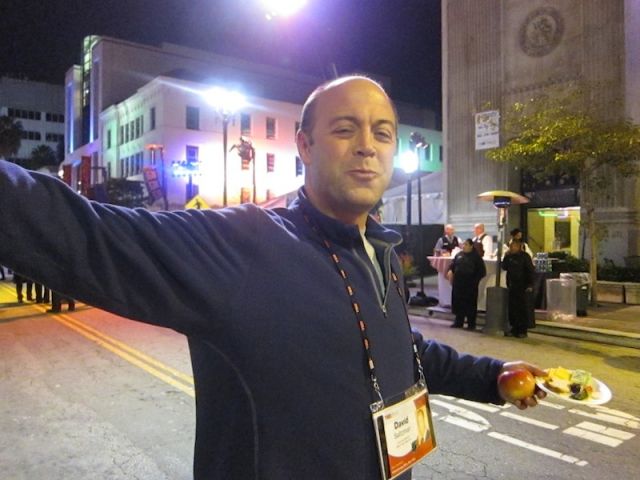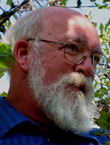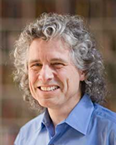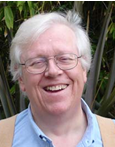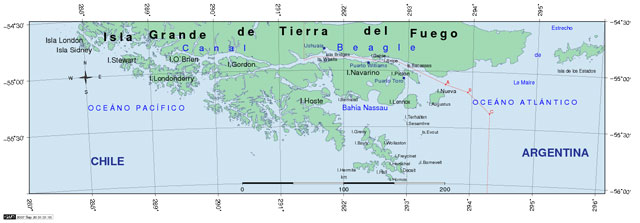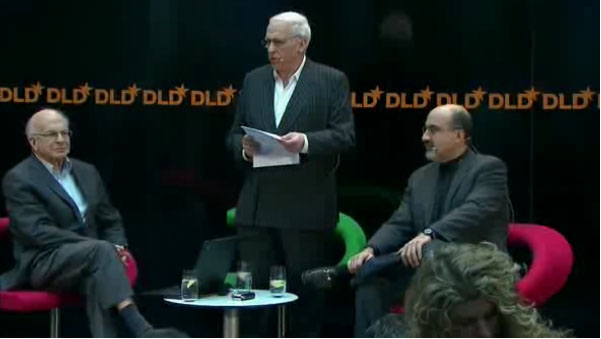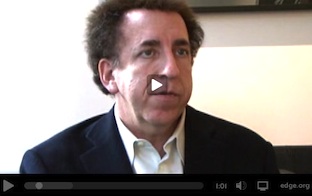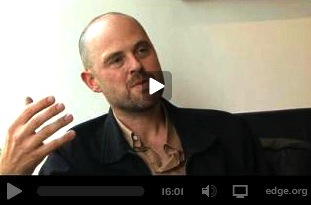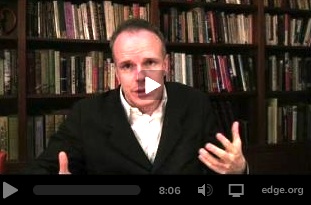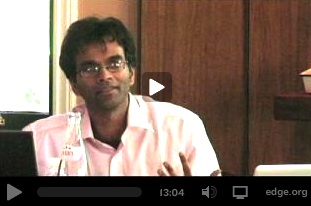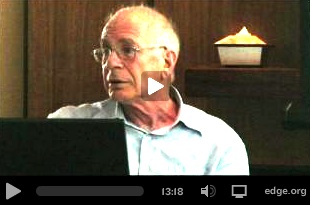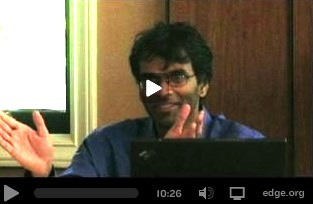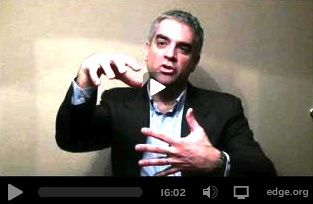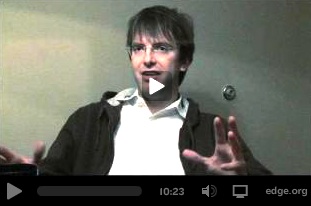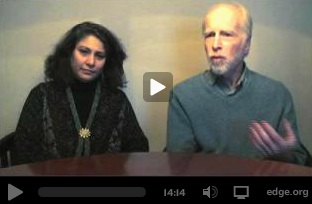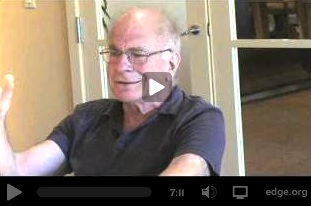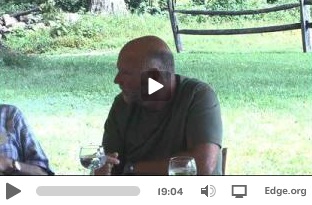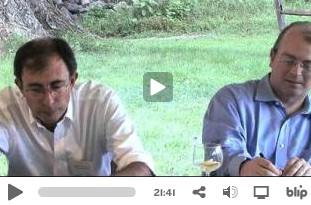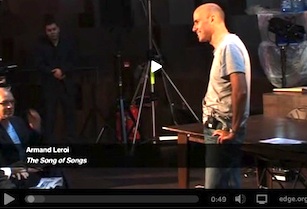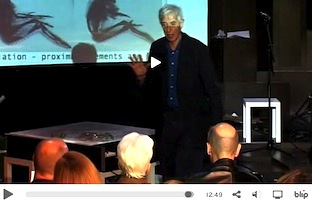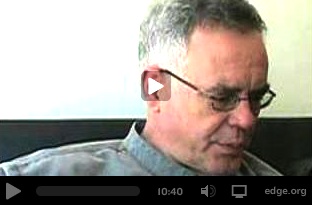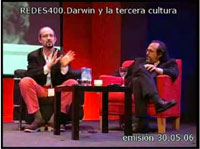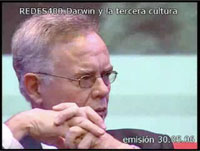Events: On the Road

This year's Edge-Serpentine Gallery collaboration took place in London at part of the Serpentine's "Extinction Marathon: Visions of the Future" event, at the Serpentine Sackler Gallery's extension, designed by Zaha Hadid, on Oct. 18, 2014. The 2-hour event, which was live-streamed, is presented, here in its entiretly, on Edge.
The first hour was a converseation between Stewart Brand and Richard Prum on whether of not the prospect of "de-extinction" changes how we think about extinction. For the second hour, Molly Crockett introduced four Edgies—Helena Cronin, Jennifer Jacquet, Steve Jones, and Chiara Marletto, who gave 10-minute talks with their perspectives on the subject of extinction. This was followed by a panel.
NEW—COMPLETE VIDEO AND TEXT
Part I: "DE-EXTINCTION": STEWART BRAND & RICHARD PRUM
With Hans Ulrich Obrist and John Brockman

Does the prospect of "de-extinction" change how we think about extinction? Conservation science is shifting from being species-centric to function-centric, focussing on the overall health of ecosystems. Does the extinction of a species leave a "gap in nature" that can only be filled by returning the species to life and to the wild? Or will a functionally close relative serve? Is a de-extincted species really nothing more than a functionally close relative anyway? If it is too difficult and expensive to revive every extinct species, what are the criteria for deciding which ones to work on? Humans are the ones deciding. What ethics and aesthetics should guide those decisions?
STEWART BRAND is the Founder of the "The Whole Earth Catalog" and Co-founder of The Long Now Foundation and Revive and Restore; Author, Whole Earth Discipline.
Stewart Brand's Edge Bio Page
RICHARD PRUM is an Evolutionary Ornithologist at Yale University, where he is the Curator of Ornithology and Head Curator of Vertebrate Zoology in the Yale Peabody Museum of Natural History. He is working on a book about duck sex, aesthetic evolution, and the origin of beauty.
Richard Prum's Edge Bio Page
[Continue to Part I—Video & Text]
Part II: "EDGIES ON EXTINCTION"
Molly Crockett introduces and moderates an event of four 10-minute talks by Helena Cronin, Jennifer Jacquet, Steve Jones, and Chiara Marletto, followed by a discussion joined by Hans Ulrich Obrist, and John Brockman.
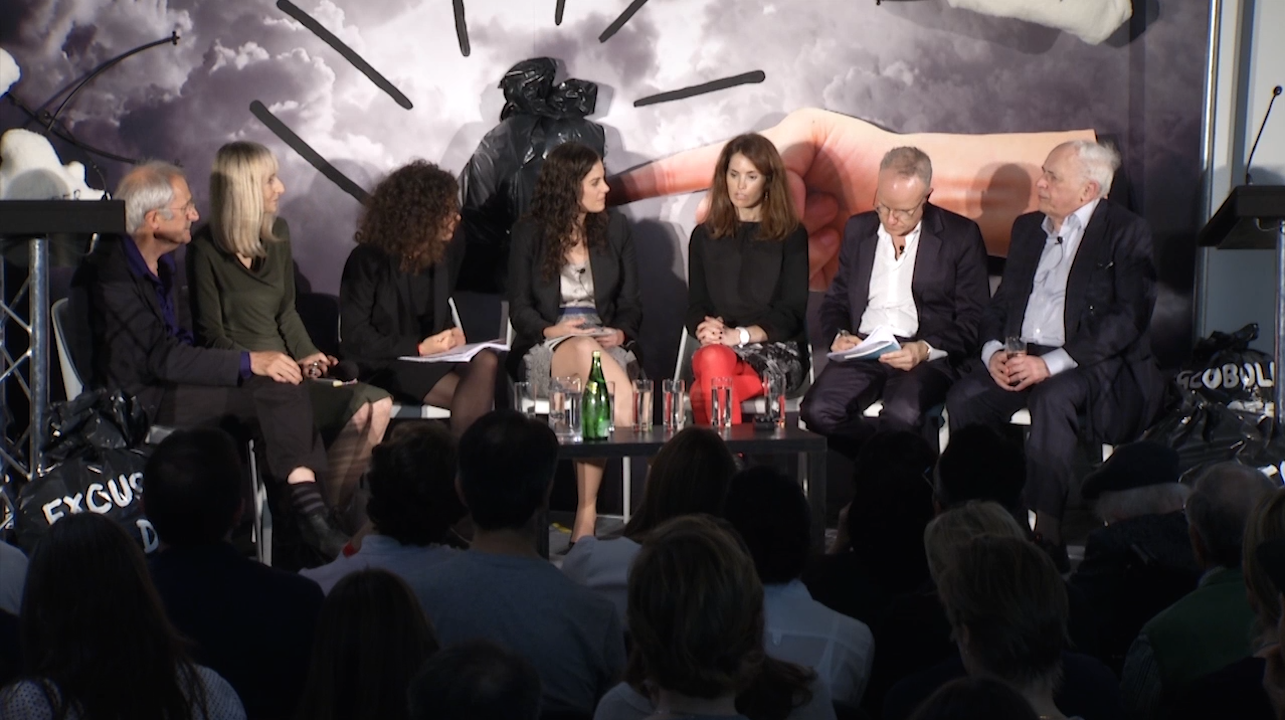
HANS ULRICH OBRIST: When we spoke with John Brockman about the Extinction Marathon he suggested, as a second part—as I mentioned in previous marathons we got the Edge community to realize maps and different formulas, and John thought today it would be wonderful to do a panel with UK based scientists who are part of the Edge community. We are extremely delighted that we now will have four presentations by Helena Cronin, by Chiara Marletto, by Jennifer Jacquet, and by Steve Jones. We welcome Steve Jones back to the Serpentine because he was part of the 2007 Experiment Marathon with Olafur Eliasson. The entire panel will be introduced by Molly Crockett. Molly is an associate professor for experimental psychology and fellow of Jesus college at the University of Oxford. She holds a Ph.D. in experimental psychology from Cambridge and a B.S. in neuroscience from UCLA. Dr. Crockett studies the neuroscience and psychology of altruism, of morality, and self-control. Her work has been published in many top academic journals including Science, PNAS, and also Neuron. Molly Crockett will now introduce Helena, Chiara, Jennifer, and Steve. We then, together with Molly and all the speakers and John, give a panel after that.
MOLLY CROCKETT: I'm very, very pleased to introduce Helena Cronin. She's the co-director of the Center for Philosophy of Natural and Social Science and the director of Darwin at LSE at the London School of Economics. She has many notable publications including the edited series, Darwinism Today, and the award winning, The Ant and the Peacock: Altruism and Sexual Selection from Darwin to Today, that has been featured in the New York Times' Best Books and Nature's Best Science Books of the Year. Her current research interests focus on the evolutionary understanding of sex differences. Let's give a very warm welcome to Helena and welcome her to the stage. ...
 ... A strange thing happened on the way to a better world in pursuit of an admirable quest, that is, a world free of sex discrimination where you’re judged on your own qualities and not your sex. Truth and falsity went topsy-turvy. The truth—the silence of sex differences—became dangerous, unmentionable, and in its place the conventional wisdom, which is a ragbag of ideas that have long been extinct but are kept ghoulishly alive by popularity, became the entrenched orthodoxy influencing public thinking, agendas and policy-making, and completely crowding out science and sense.
... A strange thing happened on the way to a better world in pursuit of an admirable quest, that is, a world free of sex discrimination where you’re judged on your own qualities and not your sex. Truth and falsity went topsy-turvy. The truth—the silence of sex differences—became dangerous, unmentionable, and in its place the conventional wisdom, which is a ragbag of ideas that have long been extinct but are kept ghoulishly alive by popularity, became the entrenched orthodoxy influencing public thinking, agendas and policy-making, and completely crowding out science and sense.
My aim is to show you why the current orthodoxy should be abandoned and why, if you really care about a fairer world, the science does matter. It matters profoundly. I’m going to take two examples, both about the professions, because they very well epitomize the orthodox litany: how society systematically discriminates against women, and how at work they are victims of pervasive sexism. ...
HELENA CRONIN is the Co-Director of LSE's Centre for Philosophy of Natural and Social Science; Author, The Ant and the Peacock: Altruism and Sexual Selection from Darwin to Today. Helena Cronin's Edge Bio Page
 There is a new fundamental theory of physics that's called constructor theory, and was proposed by David Deutsch who pioneered the theory of the universe of quantum computer. David and I are working this theory together. The fundamental idea in this theory is that we forumlate all laws of physics in terms of what tasks are possible, what are impossible, and why. In this theory we have an exact physical characterization of an object that has those properties, and we call that knowledge. Note that knowledge here means knowledge without knowing the subject, as in the thoery of knowledge of the philosopher, Karl Popper.
There is a new fundamental theory of physics that's called constructor theory, and was proposed by David Deutsch who pioneered the theory of the universe of quantum computer. David and I are working this theory together. The fundamental idea in this theory is that we forumlate all laws of physics in terms of what tasks are possible, what are impossible, and why. In this theory we have an exact physical characterization of an object that has those properties, and we call that knowledge. Note that knowledge here means knowledge without knowing the subject, as in the thoery of knowledge of the philosopher, Karl Popper.
We’ve just come to the conclusion that the fact that extinction is possible means that knowledge can be instantiated in our physical world. In fact, extinction is the very process by which that knowledge is disabled in its ability to remain instantiated in physical systems because there are problems that it cannot solve. With any luck that bit of knowledge can be replaced with a better one. ...
CHIARA MARLETTO is a Junior Research Fellow at Wolfson College and Postdoctoral Research Assistant at the Materials Department, University of Oxford. Chiara Marletto's Edge Bio Page
 I dream about the sea cow or imagine what they would be like to see in the wild, but the case of the Pinta Island giant tortoise was a particularly strange feeling for me personally because I had spent many afternoons in the Galapagos Islands when I was a volunteer with the Sea Shepherd Conservation Society in Lonesome George’s den with him. If any of you visited the Galapagos, you know that you can even feed the giant tortoises that are in the Charles Darwin Research Station. This is Lonesome George here.
I dream about the sea cow or imagine what they would be like to see in the wild, but the case of the Pinta Island giant tortoise was a particularly strange feeling for me personally because I had spent many afternoons in the Galapagos Islands when I was a volunteer with the Sea Shepherd Conservation Society in Lonesome George’s den with him. If any of you visited the Galapagos, you know that you can even feed the giant tortoises that are in the Charles Darwin Research Station. This is Lonesome George here.
He lived to a ripe old age but failed, as they pointed out many times, to reproduce. Just recently, in 2012, he died, and with him the last of his species. He was couriered to the American Museum of Natural History and taxidermied there. A couple weeks ago his body was unveiled. This was the unveiling that I attended, and at this exact moment in time I can say that I was feeling a little like I am now: nervous and kind of nauseous, while everyone else seemed calm. I wasn’t prepared to see Lonesome George. Here he is taxidermied, looking out over Central Park, which was strange as well. At that moment realized that I knew the last individual of this species to go extinct. That presents this strange predicament for us to be in in the 21st century—this idea of conspicuous extinction. ...
JENNIFER JACQUET is Assistant Professor of Environmental Studies, NYU; Researching cooperation and the tragedy of the commons; Author, Is Shame Necessary? Jennifer Jacquet's Edge Bio Page
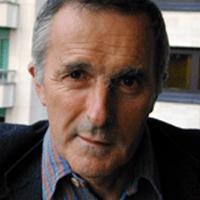 ... A strange thing happened on the way to a better world in pursuit of an admirable quest, that is, a world free of sex discrimination where you’re j
... A strange thing happened on the way to a better world in pursuit of an admirable quest, that is, a world free of sex discrimination where you’re j
What I wanted to talk about is somewhat of a parallel of that in human populations. If you were to go to a textbook on human biology from the time of Darwin or a bit later, you would certainly get an image that looked a bit like this. This is an image of the so-called races of humankind—racial types, as they called them. I’m not going to go into the question of whether there are real races of humankind because there aren’t. It’s interesting to note that until quite recently people assumed, and scientists assumed too, that the human species was divided into distinct groups that were biologically different from each other and had been isolated from each other for a long, long time.
Well, to some extent that was true. Until quite recently, human populations were isolated from each other. That’s changing quite quickly. ...
STEVE JONES is an Emeritus Professor of Genetics at University College London. Steve Jones's Edge Bio Page
 MOLLY CROCKETT is an Associate Professor in the Department of Experimental Psychology at the University of Oxford; Wellcome Trust Postdoctoral Fellow at the Wellcome Trust Centre for Neuroimaging. Molly Crockett's Edge Bio Page
MOLLY CROCKETT is an Associate Professor in the Department of Experimental Psychology at the University of Oxford; Wellcome Trust Postdoctoral Fellow at the Wellcome Trust Centre for Neuroimaging. Molly Crockett's Edge Bio Page
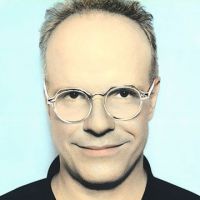

HANS ULRICH OBRIST is the Co-director of the Serpentine Gallery in London; Author, Ways of Curating. Hans Ulrich Obrist's Edge Bio Page
JOHN BROCKMAN is the Editor and Publisher of Edge.org; Chairman of Brockman, Inc.; Author, By the Late John Brockman, The Third Culture. John Brockman's Edge Bio Page
[Continue to Part II — Video & Text]
EDGE & SERPENTINE GALLERY
Previous Edge-Serpentine collaborations have included:
"Formulae for the 21st Century" (2007)
"The Table-Top Experiment Marathon" (2007)
"Maps For The 21st Century" (2010)
"Information Gardens" (2011)
SPEAKING OF EXTINCTIONS....
Edge's own contribution to the conversation will be published in February:
On the road to Munich in January for DLD14, the 10th annual DLD conference (Digital-Life-Day) run by Steffi Czerny and Lukas Kubina for Hubert Burda Media. The theme this year: "Content and Context." It was the fifth time Edge has been asked to participate. (See below for links to our previous DLD co-events.)

Steffi Czerny and John Brockman
This year the Edge conversation was on "information" from the Neandertal DNA sequenced by Svante Pääbo, the founder of the field of ancient DNA, to the multi-particle entanglement states of physicist Anton Zeilinger, which have become essential in fundamental tests of quantum mechanics and in quantum information science, most notably in quantum computation. In addition, Edge's roving editor, Jennifer Jacquet, was present for a session on "Time's Role in the Tragedy of the Commons" in which she developed themes in her work recently presented on Edge.
Svante Pääbo, Anton Zeilinger, John Brockman: On Information
Information is the foundation of our universe—and life itself. Cultural impresario John Brockman hosts a Third Culture conversation, spanning science and the humanities.
SVANTE PÄÄBO the founder of the field of ancient DNA, is Director, Department of Genetics, Max Planck Institute for Evolutionary Anthropology, Leipzig. Among his achievements are the first demonstration of DNA survival in an ancient Egyptian mummy, the first amplification of ancient DNA, the first study of the DNA from the Iceman found in the Alps, and the first retrieval of DNA from a Neanderthal in 1997. Four years ago, he initiated and organized an effort to sequence the entire Neanderthal genome. The first scientific overview of the genome was published in 2009 and was front page news wordwide. He is the author of Neanderthal Man: In Search of Lost Genomes. Svante Pääbo's Edge Bio Page
ANTON ZEILINGER, a physicist, is Professor of Physics at the Quantum Optics, Quantum Nanophysics, Quantum Information Institute of University of Vienna. He is President of the Austrian Academy of Sciences and the author of Dance of the Photons: From Einstein to Quantum Teleportation. Zeilinger is a pioneer in the field of quantum information and of the foundations of quantum mechanics. He realized many important quantum information protocols for the first time, including quantum teleportation of an independent qubit, entanglement swapping (i.e. the teleportation of an entangled state), hyper-dense coding (which was the first entanglement-based protocol ever realized in experiment), entanglement-based quantum cryptography, one-way quantum computation and blind quantum computation. His further contributions to the experimental and conceptual foundations of quantum mechanics include multi-particle entanglement and matter wave interference all the way from neutrons via atoms to macromolecules such as fullerenes. Anton Zeilinger's Edge Bio Page
Jennifer Jacquet: Times Role in the Tragedy of the Commons
How do tensions between individuals and groups play out? Between high-consuming people and low? Between the now and the future? Game theory offers answers.
JENNIFER JACQUET is Clinical Assistant Professor of Environmental Studies, NYU, researching shame, cooperation and the tragedy of the commons. She is also Edge's Roving Editor (see interviews with Adam Alter and Joseph Heinrich).
Her work was recently featured on Edge after Nature Climate Change published a study by Jacquet and her colleagues at two Max Planck Institutes on "Delayed Gratification Hurts Cimate Change Cooperation". Jennifer Jacquet's Edge Bio Page
EDGE @DLD: 2011: AN EDGE CONVERSATION IN MUNICH with Stewart Brand, George Dyson, Kevin Kelly, introduced by Andrian Kreye. A session with three of the original members of Edge who year in and year out provide the core sounding board for the ideas and information we present to the public. I refer to them in private correspondance as "The Council." Every year, beginning late summer, I consult with Stewart Brand, Kevin Kelly, and George Dyson, and together we create the Edge Annual Question which Edge has been asking since 1996. 2010: "INFORMAVORE" with Frank Schirrmacher, Editor of the Feuilleton and Co-Publisher of Frankfurter Allgemeine Zeitung, Andrian Kreye, Feuilleton Editor of Sueddeutsche Zeitung, Munich; and Yale computer science visionary David Gelernter, who, in his 1991 book Mirror Worlds presented what's now called "cloud computing." 2009: REFLECTIONS ON A CRISIS: Daniel Kahneman, the greatest living psychologist, and Nassim Nicholas Taleb, the foremost scholar of extreme events discuss hindsight biases, the illusion of patterns, perception of risk, and denial. 2008: LIFE: A GENE-CENTRIC VIEW: Richard Dawkins & J. Craig Venter. It's not everyday you have Richard Dawkins and Craig Venter on a stage talking for an hour. That it occured in Germany, where the culture had been resistant to open discussion of genetics, and at DLD, the Digital, Life, Design conference organized by Hubert Burda Media in Munich, a high-level event for the digital elite—the movers and shakers of the Internet—made the discussion particularly interesting.
You can answer the question, but are you bright enough to ask it?

INTRODUCTION
by John Brockman
The Edge motto, adopted from the artist James Lee Byars' "World Question Center" is: "To arrive at the edge of the world's knowledge, seek out the most complex and sophisticated minds, put them in a room together, and have them ask each other the questions they are asking themselves." As Wallace Stevens wrote in "Notes Toward A Supreme Fiction" (1942): "The final elegance, not to console / Nor sanctify, but plainly to propound."
It's the quality of the questions that defines the scientific endeavor, not the answers encrusted in stories and narratives. This year, at SciFoo 2013, Edge presented the opportunity to several of the nearly 300 participants to respond to the following: "What is your question from SciFoo 2013?" Watch the 8-minute video below for the responses. This is followed by responses to the question "Who and/or what was fresh and new at SciFoo 2013?", and a photo gallery, which extends to San Francisco the following evening.
But first, what is "SciFoo"?
The annual event is run by three sponsors: O'Reilly Media (Tim O'Reilly is responsible for "FOO," or, "friends of O'Reilly"), Nature magazine (and their spin-off company, Digital Science), and Google. This year 62% of the participants were new. This approach keeps the event new and fresh every year. The ratio of participants to interesting people? 1-to-1.
As theoretical physicist and Nobel Laureate Frank Wilczek noted in his report on SciFoo 2007 for Edge:
"SciFoo is a conference like no other. It brings together a mad mix from the worlds of science, technology, and other branches of the ineffable Third Culture at the Google campus in Mountain View. Improvised, loose, massively parallel—it's a happening. If you're not overwhelmed by the rush of ideas then you're not paying attention."
Also, see George Dyson's report on SciFoo 2007; Photos and comments on SciFoo 2009, and the Edge-SciFoo report on SciFoo 2011.
Tyler Cowen, Joseph "Yossi" Vardi, Carl Page, Fiery Cushman, Lee Smolin, Linda Stone, Paul Davies, Paul Steinhardt, Peter Norvig, Richard Potts, Steve Fuller, Stuart Firestein
WHO AND/OR WHAT WAS FRESH AND NEW AT SCI/FOO 2013?
George Dyson, Esther Dyson, Steve Fuller, Stewart Brand, Paul Saffo, Coco Krumme, John Coates
A fascinating weekend, with one lingering regret—that I missed Rory Wilson’s talk on the use of accelerometers in free living animals. I had to piece together the gist of his talk from scraps given me by others and, fortunately, by Rory himself. In his work as an animal behaviorist Rory has been using actigraphy and accelerometers attached to animals in the wild in order to monitor continuously their energy expenditure. Beyond this, though, the data Rory has collected has uncovered subtle changes in background movement that actually reflect the animal’s motivational state. This finding is tremendously interesting. As we learn more about the brain, the more we see that it is built primarily to plan and execute movement, that activities we—under the influence of our Platonic heritage—commonly viewed as pure thought in fact have a somatic echo. Some scientists working with actigraphy have even found predictors, tremors if you will, of impending neuro-degenerative disease. But background activity changes that may reflect motivational states? The very possibility should tantalize any behavioural scientist.
Serendipity was at work this weekend: I met perhaps the only other person at scifoo (on the entire googolplex?) with a dumb phone. I stubbornly hold onto mine for the very purpose of serendipity, to dampen distraction. Ziyad Marar and I had a wonderful conversation about habits and human behavior, and soon discovered we have in common 1999-era telephones, as well as a healthy skepticism of social media. I hadn't heard of Ziyad's books (Happiness Paradox, Deception, Intimacy), but I picked up two at scifoo and couldn't put them down: his writing mulls human nature, weaving in literature and philosophy without succumbing to the tired conventions of contemporary science writing. A breath of fresh air.
PAUL SAFFO: Kröpelin's Mysteries of the Sahara
The single most astonishing session for me was Stefan Kröpelin's "Miracle of the Sahara." Kroplin compressed 40 years of research and exploration into a whirlwind tour of the Sahara's mysteries and what it is like to do science there. Summarizing conditions, he noted, "Sometimes, you get stuck hundreds of times per day… and the real problem isn't the heat; it's the cold." The size of the U.S, Kröpelin's Sahara is full of mysteries: Gilf Kebir, a sand plateau atop an ancient fluvial system in Southwest Egypt holds rock art from the middle Holocene, over 10,000 figures in one cave alone. The Wadi Howar was thought by Heroditus to be the source of the Nile; now it is vast desert, but in it's heart is the Ounianga Kebir, a cluster of freshwater aquifer-fed "gravity lakes," and home to seven crocodiles, the remnant of an Ice Age population, now isolated from other crocs by hundreds of miles of searing desert.
But the biggest mystery was sitting right in front of Kröpelin as he spoke. It was a chunk of "Libyan Desert Glass," 28 million year-old fused glass the color of pale emerald and the purest natural glass in the world. Discovered by Europeans in 1932, the stuff is strewn across a vast area of desert at the edge of Egypt's great Sand Sea. Kröpelin's chunk looked like a glass meteorite, complete with ablation regmaglypts, suggesting that the glass was created by a meteor strike that liquefied the surface rocks in a process not unlike that which created tektite strewn-fields elsewhere on the earth. Except… no one has found a crater. Perhaps the glass is a radiative melt artifact of a Tunguska-like airburst? Others speculate that it is hydrovolcanic in origin, but no has found a volcanic source.
What we do know is that the Sahara's earliest inhabitants knapped the glass into tools, and that it was prized by the Egyptians—a scarab carved from the stuff is set into a pectoral worn by Tutankhamun. That fact tied nicely with Kröpelin's final and most surprising statement: the origins of the pharonic tradition lie in the Western Desert, not the Nile Valley. And if the Egyptian civilization was born from the Sahara, then by association, Europe's roots are hidden there as well.
STEWART BRAND: What if climate change is good for civilization?
(If it is, it would completely invalidate the first chapter of my Whole Earth Discipline, which spells out how climate change is an apocalypse-in-waiting for civilization. My personal mantra tries to be: "Every day I wonder how many things I am dead wrong about." This might be one of them.)
Climate change apparently ignited civilization in Egypt, said Stefan Kröpelin in a small, intense session at SciFoo. His four decades of insanely adventurous researches in the eastern Sahara—where no one goes—show that people lived all over that region when it was a rich savanna filled with game, before 8,000 years ago. In those centuries people avoided the Nile, which was dangerous with floods and fearsome animals.
In the period 5300-3500 BCE the Sahara gradually but relentlessly dried up. The people from the desert were forced to take on the Nile, first for farming, soon for a river-taming civilization of such durability that it eventually inspired Greece, Rome, and Europe.
Climate change made it happen. The evidence is in the sumptuous cave art at Wadi Sura and the silt of the astonishingly ancient Ounianga Lakes.
What is our unthinkably dangerous Nile that climate change might force us to take on? What abilities might we be forced to acquire?
STEVE FULLER: How must we re-orient ourselves to make the most out of seasteading?
At Sci Foo Camp 2013, David Ewing Duncan and Linda Avey presented a very persuasive case for an indefinite expansion of 'seasteading', a term that I had learned about from Duncan in an earlier session on cognitive and moral enhancement by neuroscientific means. I had been already familiar with Peter Thiel's support for a ship floating just beyond US territorial waters near San Francisco Bay that enabled innovators lacking US citizenship to conduct research outside the gaze of American regulators. However, the session enabled me to see that seasteading, far from being a strategy for avoiding inconvenient forms of regulation, on the contrary might be something that states themselves encourage—though perhaps indirectly, depending on the political climate. However, this proposal would make policy sense only on the following condition: The outcomes of the research conducted in these 'ethics-free' zones would have to be made public, with the understanding that no one would be prosecuted, no matter how bad the outcomes are perceived to have been. In other words, we would need to become sufficiently mature to accept the admission of error in pursuit of a good cause as adequate punishment in itself.
The most wonderful session I attended—and the most meaningful experience overall—was Michael Chorost talking about his own cochlear implant. It was what science really is—the response to curiosity. He told us how it worked, played recordings so we could get some sense of how things sound to people who have an implant. He passed some samples around the room for us to touch and examine. We talked about learning to hear—and how there's a point in childhood after which it gets harder and harder to learn. We got an understanding of the technology, and also of how the technology changes both individual lives and cultural norms—such as sign language, which may become the language of the poor deaf as the rich deaf start using cochlear implants. In theory they can be covered by Medicare, but somehow the rich seem to get them and the poor don't... Is that right?
Is there something similar coming for vision? (Of course, this comment—and the session itsel —raises questions and doesn't answer them all; that's the point of SciFoo...)
This was SciFoo's seventh year, and, in era where the half-life of a conference is measured in years, not decades, it is holding up well. Tim O'Reilly (O'Reilly), Timo Hannay (Nature/Digital Science )and Chris DiBona (Google) have found a formula that works, and are sticking to it. Big Data, once the all-consuming subject, is now just another scientific instrument, like a space telescope or an electron microscope, and the excitement was back to the details of what you can do with it, now that you have it. And how do you encourage scientific thinking in children (and politicians)? Among the people who showed up from left field and stole the show (a regular occurrence at SciFoo) this year was Carmen Medina, who, in her own introductory words, "spent 32 years at the Central Intelligence Agency and decided early on that how we form opinions is much more interesting than any particular opinion. Passionate about empowering heretics in the workplace and attacking conventional wisdom. Believe we need entirely new construct for the concept of national security, perhaps abandoning it altogether. Convinced there is worldwide conspiracy for preservation of Mediocrity." Amen!
A number of Edge contributors were among the speakers at the recent TED conference (TED 2010) in Long Beach: Stewart Brand,Nicholas Christakis, George Church, Denis Dutton, Sam Harris, Daniel Kahneman, Benoit Mandelbrot, Nathan Myhrvold, Michael Shermer, and even one of the first speakers at the Reality Club of the early 80s, Stephen Wolfram. And many more individuals in the Edge community as well as friends were in attendance. Come, take a walk with me.
Below is a link to Daniel Kahneman's recently posted TED Talk — featuring the superb video production values that are becoming the hallmark of the TED Talks — along with links to Kahneman's relevant Edge contributions.
—JB

Edge was in Munich for DLD 2010 and an Edge/DLD event. The event, entitled "Informavore," is a discussion featuring Frank Schirrmacher, editor of the Feuilleton and co-publisher of Frankfurter Allgemeine Zeitung; Andrian Kreye, Feuilleton editor of Sueddeutsche Zeitung, Munich; and Yale computer science visionary David Gelernter, who, in his 1991 book Mirror Worlds presented what's now called "cloud computing."
Gelernter's June 2000 manifesto, published by both Edge and Frankfurter Allgemeine Zeitung, was at the time widely read and debated. In it, he famously wrote: "Everything is up for grabs. Everything will change. There is a magnificent sweep of intellectual landscape right in front of us."
 |
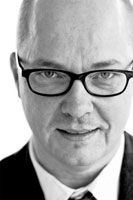 |
 |
 |
FURTHER READING ON EDGE:
The Age of the Informavore: A Talk with Frank Schirrmacher
Lord of the Cloud: John Markoff and Clay Shirky talk to David Gelernter
"The Second Coming: A Manifesto" by David Gelernter
The Edge Annual Question 2010: How Is The Internet Changing the Way You Think?
Edge was invited by Alvaro Fischer, the Director of Fundacion Ciencia Y Evolucion in Chile to attend the Foundation's Darwin Seminar in Santiago, entitled "Darwin's Intellectual Legacy To The 21st Century" and join the eight speakers (all Edge contributors) on a trip to the "extreme south" including a trip along "The Beagle Channel", named after the ship HMS Beagle which surveyed the coasts of the southern part of South America from 1826 to 1830.
|
|
|
|
|
|
The Seminar, which ran for two days, attracted an audience of 2,200 people on each day...
"Our intention is to illuminate and discuss how Darwinian thought influenced the disciplines that focus on the study the individuals (biology, neuroscience, psychology); the individual within their social interactions (anthropology, sociology, economy, political science); and how these concepts pertain, in general, to a moral philosophy."
Ian McEwan Steven Pinker Matt Ridley John Tooby
"We wish to explore how, from Darwinian thought, there emerges a vision of what it is to be a human being. And that this vision is fundamental and coherent with the entire body of accumulated scientific knowledge. With reverence for the details of their application, it is the impact of Darwin's ideas that is the reason we are celebrating Darwin's anniversary."
After the Seminar, the Foundation flew the group to Tierra del Fuego and The Beagle Channel, where we boarded the Chilean Navy Patrol boat SS Isaza at 6am at Puerto Williams the next day for a 19-hour trip to "the end of the world". Charles Darwin, on the second trip of HMS Beagle under Captain Robert FitzRoy, wrote in his field notebook in 1833, "many glaciers beryl blue most beautiful contrasted with snow".
As part of our celebration the three hundredth edition of Edge, we are pleased to present a video record (with accompanying slides) of the eight talks, a video interview with program organizer Alvaro Fischer, and a Photo Galleryof the trip.
— JB
Photo Credits: The Beagle Channel photographs on this page (and releated in the Photo Gallery) are by Steven Pinker. Images in the Photo Gallery are by Pilar Valenzuela (with the addition of the Pinker images and snapshots added by the speakers).

"Mountain In Glow of Sunrise Beagle Channel"
DARWIN'S INTELLECTUAL LEGACY TO THE 21ST CENTURY
A Talk With Alvaro Fischer
ALVARO FISCHER mathematical engineer, entrepreneur and businessman, is President of the Ciencia y Evolución Foundation, organizer of the 2009 seminars on Darwin’s Legacy to the XXI Century , member of the editorial committee of the El Mercurio newspaper, author of Evolution: The New Paradigm.
Further reading on Edge: "Why Chile?" by Alvaro Fischer

"Clouds Over Darwin Range"
Some people think today that it is impossible for a mindless process to produce evolution. ... It isn't. ...There may be an intelligent God hidden in the evolution process, but if so, he might as well be asleep, since there is no work for him to do!
DARWIN AND THE EVOLUTION OF REASONS
DANIEL C. DENNETT is a philosopher; University Professor, Co-Director, Center for Cognitive Studies, Tufts University; Author, Breaking the Spell: Religion as a Natural Phenomenon

"Buff Necked Ibises In Flight"
There's a mismatch between the modern versus ancestral world. Our minds are equipped with programs that were evolved to navigate a small world of relatives, friends, and neighbors, not for cities and nation states of thousands or millions of anonymous people. Certain laws and institutions satisfy the moral intuitions these programs generate. But because these programs are now operating outside the envelope of environments for which they were designed, laws that satisfy the moral intuitions they generate may regularly fail to produce the outcomes we desire and anticipate that have the consequences we wish. ...
EVOLUTIONARY PSYCHOLOGY Cognitive instincts for cooperation, institutions & society
LEDA COSMIDES, is the founder of the field of Evolutionary Psychology. She is he co-director of UCSB's Center for Evolutionary Psychology.

"Chilean Armada Ship PSG Isaza"
The modern social sciences are built on an Aristotlean blank slate foundation. On the Aristotlean view the mind is like a tape recorder or video recorder assumes: the mechanisms of recording (learning) do not impart any content of their own to the signal that it absorbs our mental content is therefore wholly supplied by the senses, especially from social sources (culture). Basing the social sciences on the mistaken theory that the mind is like a blank slate was a fundamental error that has kept the social sciences from being as fully successful as the natural sciences.
THE EVOLUTIONARY APPROACH TO THE SOCIAL SCIENCES
By John Tooby
JOHN TOOBY is the founder of the field of Evolutionary Psychology. He is he co-director of UCSB's Center for Evolutionary Psychology.

"Island Clouds and Mountains"
Language is an adaptation to the "cognitive niche". It facilitates exchange of information, negotiating of cooperation. But indirect speech (polite requests, veiled threats & bribes, sexual overtures) are a puzzle for the theory that language is an adaptation for efficient communication. Language is an adaptation to the "cognitive niche". ...
STEVEN PINKER is a Harvard College Professor and Johnstone Family Professor of Psychology, Harvard University; Author, The Stuff of Thought.

"Upland Goose In Flight"
Farming — a division of labour between humans and other species; Fossil fuels — a division of labour between humans and extinct species?
PARALLELS BETWEEN ECONOMICS AND EVOLUTION, OR — WHAT HAPPENS WHEN IDEAS HAVE SEX
By Matt Ridley
MATT RIDLEY is a Science Writer; Founding chairman of the International Centre for Life; Author, Francis Crick: Discoverer of the Genetic Code.
Further reading on Edge: "The Genome Changes Everything": A Talk with Matt Ridley

"Dramatic Sky Beagle Channel"
If we want to change the world, we need first to understand it. And when it comes to understanding human nature — male and female — Darwinian science is indispensable.
WHY SEX DIFFERENCES MATTER: THE DARWINIAN PERSPECTIVE
HELENA CRONIN launched and runs Darwin@LSE. She is a Co-Director of LSE's Centre for Philosophy of Natural and Social Science. Author,The Ant and the Peacock: Altruism and Sexual Selection from Darwin to Today.
Further reading on Edge:"Getting Human Nature Right": A Talk with Helena Cronin

"Blue-Eyed Comorant In Flight"
...I want to engage you in a discussion of the deep history of beauty. By deep I mean as seen from an evolutionary perspective. I am an "evolutionary psychologist". I believe that to understand and fully appreciate human mental traits, we need to know why they are there — which is to say what biological function they are serving. Evolutionary psychology has been making pretty good progress. But, as we say, "there are still some elephants in the living room" — big issues that no one wants to talk about. And human beings worship of the beautiful remains one of the biggest.
BEAUTY’S CHILD: SEXUAL SELECTION, NATURE WORSHIP AND THE LOVE OF GOD
NICHOLAS HUMPHREY is Professor Emeritus, London School of Economics and author of Seeing Red: A Study in Consciousness.

"Fuquet Glacier Face"
I'm going to talk about some convergences, about arts and science, as far apart as science and religion, two magisteria, if you might say, and yet at some human level they converge.
ON BEING ORIGINAL IN SCIENCE AND IN ART
By Ian McEwan
IAN MCEWAN, novelist, is the author of On Chesil Beach.

"Soft Light Beagle Channel"
REFLECTIONS ON A CRISIS
Daniel Kahneman & Nassim Nicholas Taleb: A Conversation in Munich
(Moderator: John Brockman)
View the complete 1-hour HD streaming video of the Edge event that took place at Hubert Burda Media's Digital Life Design Conference (DLD) in Munich on January 27th as the greatest living psychologist and the foremost scholar of extreme events discuss hindsight biases, the illusion of patterns, perception of risk, and denial.
DANIEL KAHNEMAN is Eugene Higgins Professor of Psychology, Princeton University, and Professor of Public Affairs, Woodrow Wilson School of Public and International Affairs. He is winner of the 2002 Nobel Prize in Economic Sciences for his pioneering work integrating insights from psychological research into economic science, especially concerning human judgment and decision-making under uncertainty. Daniel Kahneman's Edge Bio Page
NASSIM NICHOLAS TALEB, essayist and former mathematical trader, is Distinguished Professor of Risk Engineering at New York University’s Polytechnic Institute. He is the author of Fooled by Randomness and the international bestseller The Black Swan. Nassim Taleb's Edge Bio Page

FOCUS ONLINE
January 28, 2009
ARE BANKERS CHARLATANS
At blame for the financial crisis is the nature of man, say two renowned scientists: Nobel Prize winner Daniel Kahneman and bestselling author Nassim Taleb ( "The Black Swan").
By Ansgar Siemens, FOCUS online editor
Two men sitting on the stage. Left. Daniel Kahneman, 74, bright-eyed, Nobel Prize winner. Right Nassim Taleb, 49, former Wall Street banker, best-selling author. Both speak on the future of Digital Life Design Conference (DLD) in Munich on the financial crisis, about the beginning--mainly they talk about people. They say it is due to human nature, that the crisis has broken out. And they choose harsh words in discussing the scale of the disaster.

Kahneman explains why there are bubbles in the financial markets, even though everyone knows that they eventually burst. The researchers used the comparison with the weather: If there is little rain for three years, people begin to believe that this is the normal situation. If over the years stocks only increase, people can't imagine a break in this trend.
"Those responsible must go--today and not tomorrow"
Taleb speaks out sharply against the bankers. The people in control of taxpayer's money are spending billions of dollars. "I want those responsible for the crisis gone today, today and not tomorrow," he says, leaning forward vigorously. The risk models of banks are a plague, he says, the bankers are charlatans.
It is nonsense to think that we can assess risks and thus protect against a crash. Taleb has become famous with his theory of the black swan described in his eponymous bestsellers described. Black swans, which are events that are not previously seen--not even with the best model. "People will never be able to control a coincidence," he says.
The early warning
"Taleb had an early warning before the crisis. In 2003 he took note of the balance sheet of the U.S. mortgage finance giant Fannie Mae, and he saw "dynamite".
In autumn last year, the U.S. government instituted A dramatic bailout. Taleb said in the "Sunday Times" in 2008: "Bankers are very dangerous." And even now, he sees a scandal: He provocatively asks what have the banks done with the government bailout money. "They have paid out more bonuses, and they have increased their risks." And it was not their own money.
Taleb calls for rigorous changes: nationalize banks--and abolish financial models. Kahneman does not quite agree with him. Certainly, the models are not capable of predicting a collapse. But one should not ignore our human nature. People will always require and use models and get benefit from them--even if they are wrong.
|
EDGE CONVERSATION
CHANGING LIFESTYLE CHANGES GENE EXPRESSION Founder and president of the non-profit Preventive Medicine Research Institute
|
|||
|
|
|||
|
EDGE CONVERSATION
LIFE IS THE WAY THE ANIMAL IS IN THE WORLD Professor of Philosophy at the University of California; Author, Out of Our Heads
|
|||
|
|
|||
|
EDGE CONVERSATION
A RULE OF THE GAME Curator, Serpentine Gallery, London; Editor: A Brief History of Curating; Formulas for Now
|
|||
|
|
|||
|
EDGE MASTER CLASS 2008 |
|||
|
|
|||
|
IMPROVING CHOICES WITH MACHINE READABLE DISCLOSURE (CLASS 2) THALER: Father of Behavioral Economics; Director, Center for Decision Research, University of Chicago Graduate School of Business; Co-Author, Nudge At a minimum, what we're saying is that in every market where there is now required written disclosure, you have to give the same information electronically and we think intelligently how best to do that. In a sentence that's the nature of the proposal.
|
|||
|
|
|||
|
THE PSYCHOLOGY OF SCARCITY (CLASS 3) Professor of Economics at Harvard Nathan Myhrvold, Richard Thaler, Daniel Kahneman, France LeClerc, Danny Hillis, Paul Romer, George Dyson, Elon Musk, Jeff Bezos, Sean Parker Let's put aside poverty alleviation for a second, and let's ask, "Is there something intrinsic to poverty that has value and that is worth studying in and of itself?" One of the reasons that is the case is that, purely aside from magic bullets, we need to understand are there unifying principles under conditions of scarcity that can help us understand behavior and to craft intervention. If we feel that conditions of scarcity evoke certain psychology, then that, not to mention pure scientific interest, will affect a vast majority of interventions. It's an important and old question. |
|||
|
|
|||
|
TWO BIG THINGS HAPPENING IN PSYCHOLOGY TODAY (CLASS 4) Eugene Higgins Professor of Psychology; Author, Thinking Fast and Slow
There's new technology emerging from behavioral economics and we are just starting to make use of that. I thought the input of psychology into economics was finished but clearly it's not! THE REALITY CLUB W. Daniel Hillis, Daniel Kahneman, Nathan Myhrvold, Richard Thaler on "Two Big Things Happening In Psychology Today" |
|||
|
|
|||
|
THE IRONY OF POVERTY (CLASS 5) Professor of Economics at Harvard I want to close a loop, which I'm calling "The Irony of Poverty." On the one hand, lack of slack tells us the poor must make higher quality decisions because they don't have slack to help buffer them with things. But even though they have to supply higher quality decisions, they're in a worse position to supply them because they
|
|
EDGE CONVERSATION
MODELING THE FUTURE Climatologist, is a professor in the Department of Biological Sciences Warming is unequivocal, that's true. But that's not a sophisticated question. A much more sophisticated question is how much of the climate Ma Earth, a perverse lady, gives us is from her, and how much is caused by us. That's a much more sophisticated, and much more difficult question. |
|
|
|
|
|
EDGE CONVERSATION
ANTS HAVE ALGORITHMS Assistant Professor, Department of Ecology and Evolutionary Biology, Princeton University
|
|
|
|
|
|
EDGE CONVERSATION
SOCIAL NETWORKS ARE LIKE THE EYE Physician and Social Scientist, Harvard University; Coauthor, Connected: The Surprising Power of Our Social Networks and How They Shape Our Lives
|
|
|
|
|
|
EDGE CONVERSATION
ENGINEERING BIOLOGY Assistant Professor of Bioengineering, Stanford University
|
|
|
|
|
|
EDGE CONVERSATION
THE IMPLICIT ASSOCIATION TEST ANTHONY GREENWALD is Professor of Psychology at University of Washington MAHZARIN BANAJI Psychologist; Richard Clarke Cabot Professor of Social Ethics, Department of Psychology, Harvard University
"The IAT provides a useful window into some otherwise difficult-to-detect contents of our minds. It may be "an inconvenient truth" that what's there is not what we thought was there or want to be there. But I think it is generally something we can come to grips with." — Anthony Greenwald |
|
|
|
|
|
EDGE MASTER CLASS 2007 |
|
|
|
|
|
Eugene Higgins Professor of Psychology; Author, Thinking Fast and Slow
|
|
|
|
|
|
Eugene Higgins Professor of Psychology; Author, Thinking Fast and Slow
|
|
|
|
|
|
Eugene Higgins Professor of Psychology; Author, Thinking Fast and Slow
|
|
|
|
|
|
Eugene Higgins Professor of Psychology; Author, Thinking Fast and Slow
|
|
|
|
|
|
Eugene Higgins Professor of Psychology; Author, Thinking Fast and Slow
|
|
|
|
|
|
Eugene Higgins Professor of Psychology; Author, Thinking Fast and Slow
|
|
|
|
|
|
EDGE SEMINAR 2007 |
|
|
|
|
|
LIFE: WHAT A CONCEPT! Professor of Physics, Institute for Advanced Study; Author, Many Colored Glass; The Scientist as Rebel
|
|
|
|
|
|
LIFE: WHAT A CONCEPT! Professor, Harvard University, Director, Personal Genome Project
|
|
|
|
|
|
LIFE: WHAT A CONCEPT! Leading scientist of the 21st century for Genomic Sciences; Co-Founder, Chairman, CEO, Co-Chief Scientific Officer, Synthetic Genomics, Inc.; Founder, President and Chairman of the J. Craig Venter Institute; author, A Life Decoded We're just at the tip of the iceberg of what the divergence is on this planet. We are in a linear phase of gene discovery maybe in a linear phase of unique biological entities if you call those species, discovery, and I think eventually we can have databases that represent the gene repertoire of our planet. |
|
|
|
|
|
LIFE WHAT A CONCEPT Professor Emeritus of Chemistry and Senior Research Scientist, New York University; Author, Planetary Dreams
|
|
|
|
|
|
LIFE: WHAT A CONCEPT! Professor of Astronomy, Harvard University; Director, Harvard Origins of Life Initiative
|
|
|
|
|
|
LIFE: WHAT A CONCEPT! Professor of Quantum Mechanical Engineering, MIT; Author, Programming the Universe
|
|
|
|
|
|
EDGE CONVERSATION
RECURSION AND HUMAN THOUGHT Linguistic Researcher; Dean of Arts and Sciences, Bentley University; Author, Language: The Cultural Tool
|
|
|
|
|
|
EDGE CONVERSATION Professor of Evolutionary Developmental Biology, Imperial College; Author, Mutants
|
|
|
|
|
|
EDGE CONVERSATION
A COOPERATIVE FORAGING EXPERIMENT: LESSONS FROM ANTS Research Fellow in Evolutionary Biology, Institute of Zoology, Zoological Society of London
|
|
|
|
|
|
EDGE CONVERSATION
HOW OUR LIMBS ARE PATTERNED LIKE THE FRENCH FLAG Professor of Biology, University College London
|
|
|
|
|
|
EDGE CONVERSATION
SO WOMEN HAVE BETTER EMPATHY THAN MEN? Psychologist, Autism Research Centre, Cambridge University; Author, Zero Degrees of Empathy
"It turns out that when you test newborn babies—this experiment was done at the age of 24 hours old, where we had 100 babies who were tested looking at two kinds of objects—a human face and a mechanical mobile. And they were filmed for how long they looked at each of these two objects. What you can see here is that on the first day of life, we had more boys than girls looking for longer at the mechanical mobile and more girls than boys looking at the face. So you can see that these differences when they emerge, first of all they seem to emerge very early—at birth—suggesting that there may be a biological component to a sex difference in, in this case, interest in faces; and secondly, they don't apply to all males or all females, these differences emerge as statistical trends when you compare groups." |
|
|
|
|
|
EDGE CONVERSATION
A FULL-FORCE STORM WITH GALE WINDS BLOWING Evolutionary Biologist; Professor of Anthropology and Biological Sciences, Rutgers University; Author, The Folly of Fools
|
Last year Edge received an invitation from Juan Insua, Director of Kosmpolis, a traditional literary festival in Barcelona, to stage an event at Kosmopolis 05 as part of an overall program "that ranges from the lasting light of Cervantes to the (ambiguous) crisis of the book format, from a literary mapping of Barcelona's Raval district to the dilemma raised by the influence of the Internet in the kitchen of writing, from the emergence of a new third culture humanism to the diverse practices that position literature at the core of urban creativity."
|
|
|
|
Eduard Punset — Redes-TV |
|

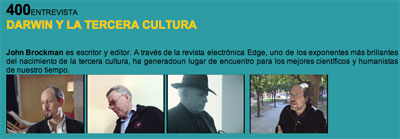
Click for information on "Darwin Y La Tercera Cultura" on Redes TV
Click here for a 2-minute tv clip

Las nuevas lecturas del 'Quijote' copan los actos de Kosmopolis
Israel Punzano — Barcelona
EL PAÍS - Cultura - 04-12-2005
Cervantes was not the the only protagonist of the second day of Kosmopolis. Also debated was the influence of Darwin's theory of the natural selection in the advances of diverse scientific disciplines, that include evolutionary biology to neuroscience to cosmology. In this colloquy, which also covered the future of the humanism, were the cosmologist Lee Smolin, the biologist Robert Trivers and the neurocientist Marc Hauser. The presentation of the event was Eduard Punset and the moderator was John Brockman, who is know for spreading scientific publications. Smolin emphasized the importance of the investigations of Darwin in the later development of Einstein's theory of the relativity and wondered if we were prepared to accept a world without absolute laws, where everything changes. Hauser pointed out that the revolution of Darwin's revolution was also about morality, as it counters the rationality of Kant and the predominance of emotions in Hume.

Brockman: "Hoy la cultura es la ciencia, los intelectuales de letras estan desfasados"
Justo Barranco — 05/12/2005 — Barcelona
"The thinkers of the third culture are the new public intellectuals" as "science is the only news"... "Nobody voted the electricity, the Internet, the birth control pill, or for fire. "The great inventions that change everything involves technology based on science "... "It is critical to participate in the discussion of such questions today as the culture is science."

TRIBUNA: JOHN BROCKMAN
La tercera cultura en Kosmopolis
John Brockman
EL PAÍS - 05-12-2005
In terms of science, the third culture is front and center: geneticist J. Craig Venter is attempting to create synthetic genes as an answer to our energy needs; biologist Robert Trivers is exploring the evolutionary basis for deceit and self-deception in human nature; biologist Ian Wilmut, who cloned Dolly the sheep, is using nuclear transfer to produce embryonic stem cells for research purposes and perhaps eventually as cures for disease; cosmologist Lee Smolin researches the Darwinian evolution of universes; quantum physicist Seth Lloyd is attempting to build quantum computers; psychologist Marc D. Hauser is examining our moral minds; and computer scientists Sergey Brin and Larry Page of Google are radically altering both the way we search for information, as well as the way we think.

CULTURA
Kosmopolis, literatura a la ultima
Eva Belmonte
December 3, 2005
Kosmopolis 2005. Celebration of International of Literature in the Center of Contemporanea Culture of Barcelona (CCCB).
...The relation between science and the third culture was another one of the subjects of debate of this Celebration of Literature. Four personalities of the scientific world participated in the Third Culture event. They are Robert Trivers, John Brockman, Marc Hauser and Lee Smolin. They demonstrated that Literature is not is not just the province of the old school of the humanities culture.

 Can a person be considered cultured today with only slight knowledge of fields such as molecular biology, artificial intelligence, chaos theory, fractals, biodiversity, nanotechnology or the human genome? Can we construct a proposal of universal knowledge without such knowledge? The integration of "literary culture" and "scientific culture" is the basis for what some call the "third culture": a source of metaphors that renews not only the language, but also the conceptual tookit of classic humanism
Can a person be considered cultured today with only slight knowledge of fields such as molecular biology, artificial intelligence, chaos theory, fractals, biodiversity, nanotechnology or the human genome? Can we construct a proposal of universal knowledge without such knowledge? The integration of "literary culture" and "scientific culture" is the basis for what some call the "third culture": a source of metaphors that renews not only the language, but also the conceptual tookit of classic humanism
The New Humanists
SALVADOR PÁNIKER
A polifacética figure
Brockman and the New Intellectuals
Interview
"Science won the battle"
SALVADOR LLOPART
"¿Qué queda del marxismo? ¿Qué queda de Freud? La neurociencia le ha dejado como una superstición del siglo XVIII, de ideas irrelevantes"

...there is a deep relation between Einstein's notion that everything is just a network of relations and Darwin's notion because what is an ecological community but a network of individuals and species in relationship which evolve? There's no need in the modern way of talking about biology for any absolute concepts for any things that were always true and will always be true.—Lee Smolin
...what I'm interested in is how science can now come together with moral philosophy and do some interesting work at the overlap areas. This is not to say that science takes over philosophy, by no means. It works together with philosophy, to figure out what the deep issues are, what the overlapping areas are, and how we can meet together.—Marc D. Hauser
I believe that self-deception evolves in the service of deceit. That is, that the major function of self-deception is to better deceive others. Both make it harder for others to detect your deception, and also allow you to deceive with less immediate cognitive cost. So if I'm lying to you now about something you actually care about, you might pay attention to my shifty eyes if I'm consciously lying, or the quality of my voice, or some other behavioral cue that's associated with conscious knowledge of deception and nervousness about being detected. But if I'm unaware of the fact that I'm lying to you, those avenues of detection will be unavailable to you. —Robert Trivers
TRIVERS, SMOLIN, HAUSER,: "DARWIN Y LA TERCERA CULTURA" IN BARCELONA
 Last year Edge received an invitation from Juan Insua, Director of Kosmpolis, a traditional literary festival in Barcelona, to stage an event at Kosmopolis 05 as part of an overall program "that ranges from the lasting light of Cervantes to the (ambiguous) crisis of the book format, from a literary mapping of Barcelona's Raval district to the dilemma raised by the influence of the Internet in the kitchen of writing, from the emergence of a new third culture humanism to the diverse practices that position literature at the core of urban creativity."
Last year Edge received an invitation from Juan Insua, Director of Kosmpolis, a traditional literary festival in Barcelona, to stage an event at Kosmopolis 05 as part of an overall program "that ranges from the lasting light of Cervantes to the (ambiguous) crisis of the book format, from a literary mapping of Barcelona's Raval district to the dilemma raised by the influence of the Internet in the kitchen of writing, from the emergence of a new third culture humanism to the diverse practices that position literature at the core of urban creativity."
Something radically new is in the air: new ways of understanding physical systems, new focuses that lead to our questioning of many of our foundations. A realistic biology of the mind, advances in physics, information technology, genetics, neurobiology, engineering, the chemistry of materials: all are questions of capital importance with respect to what it means to be human.
Charles Darwin's ideas on evolution through natural selection are central to many of these scientific advances. Lee Smolin, a theoretical physicist, Marc D. Hauser, a cognitive neuroscientist, and Robert Trivers, an evolutionary biologist, travelled to Barcelona last October to explain how the common thread of Darwinian evolution has led them to new advances in their respective fields.
The evening was presented by Eduard Punset, host of the internationally-viewed Spanish-language science television program Redes, and a best-selling author in Spain. A Redes television program based on the event was broadcast throughout Spain and Latin America.
The house was packed. The Barcelona press was present (see El Pais, La Vanguardia, El Pais, El Mundo, and a cover story in "Culturas", the magazine fo La Vanguardia).
I believe that self-deception evolves in the service of deceit. That is, that the major function of self-deception is to better deceive others. Both make it harder for others to detect your deception, and also allow you to deceive with less immediate cognitive cost. So if I'm lying to you now about something you actually care about, you might pay attention to my shifty eyes if I'm consciously lying, or the quality of my voice, or some other behavioral cue that's associated with conscious knowledge of deception and nervousness about being detected. But if I'm unaware of the fact that I'm lying to you, those avenues of detection will be unavailable to you.
ROBERT TRIVERS: DECEIT AND SELF-DECEPTION
(ROBERT TRIVERS:) Why do I talk about, or wish to talk about, deception and self-deception in the same breath? Because I think you miss the truth about each if you are not conscious of the other and the relationship between the two. If by deception you only think of conscious deception, where you're planning to lie or aware of the fact that you're lying, you will miss all the lying that goes on that the individual is unaware of, and this may be the larger portion of lies and deception that is going on.
Conversely, if you think about self-deception without comprehending its connection with deception, then I think you'll miss the major function of self-deception. In particular, you'll be tempted to go the route that psychology went a hundred years ago or so and think of self-deception as defensive: I'm defending my tender ego, I'm defending my weak psyche. And you will not see the offensive characteristic of self-deception.
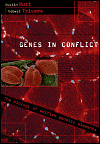 What do I mean by that? I mean that I believe that self-deception evolves in the service of deceit. That is, that the major function of self-deception is to better deceive others. Both make it harder for others to detect your deception, and also allow you to deceive with less immediate cognitive cost. So if I'm lying to you now about something you actually care about, you might pay attention to my shifty eyes if I'm consciously lying, or the quality of my voice, or some other behavioral cue that's associated with conscious knowledge of deception and nervousness about being detected. But if I'm unaware of the fact that I'm lying to you, those avenues of detection will be unavailable to you.
What do I mean by that? I mean that I believe that self-deception evolves in the service of deceit. That is, that the major function of self-deception is to better deceive others. Both make it harder for others to detect your deception, and also allow you to deceive with less immediate cognitive cost. So if I'm lying to you now about something you actually care about, you might pay attention to my shifty eyes if I'm consciously lying, or the quality of my voice, or some other behavioral cue that's associated with conscious knowledge of deception and nervousness about being detected. But if I'm unaware of the fact that I'm lying to you, those avenues of detection will be unavailable to you.
Regarding the second argument, it is intrinsically difficult, and mentally demanding, to lie and be conscious about it. The more complex in detail the lie—the longer you have to keep it up—the more costly cognitively. I believe that selection favors rendering a portion of the lie unconscious, or much of the knowledge of it unconscious, so as to reduce the immediate cognitive cost. That is, with self-deception you'll perform better cognitively on unrelated tasks that you might have to do moments later than if you had just undergone a lot of consciously mediated deception.
Let me step back and say a word or two about the underlying logic. First of all, we understand that if we are making an evolutionary argument in terms of natural selection, we are talking about benefits to individuals in terms of the propagation of their own genes, and there are innumerable opportunities in nature to gain a benefit by deceiving another.
However, the reverse is true for the deceived.
The deceived is typically losing knowledge or resources or whatever, resulting in a decrease in the propagation of their genes. So you have what we call a co-evolutionary struggle: with natural selection improving deception on the one hand, and improving the ability to spot deception on the other.
Now let me just say that deception is a very deep feature of nature. At all levels, all interactions, e.g. viruses and bacteria often use deception to get inside you. They may mimic your own cell surface proteins. They may have other tricks to deceive your system into not recognizing them as alien and worthy of attack. Even genes inside yourself, which propagate themselves selfishly during meiosis may do so by mimicking particular sub-sections of other genes so as to get copied an extra time, even though the rest of the genome, if you asked their opinion, would be against this extra copying.
When you turn to insects and larger creatures like those, we know that in relations between species, again there's a huge and rich world of deception. Considering insects alone: they will mimic harmless objects so as to avoid detection by their predators. Or they will mimic poisonous or distasteful objects to avoid being eaten. Or they will mimic a predator of their predator, so as to frighten away their predator. Or, in one case, they will mimic the predator that's trying to eat them, so that the predator misinterprets them as a member of their own species and gives them territorial display instead of eating them.
They will even, I have to tell you, mimic the feces, or droppings, of their predators. That's so common it has a technical term in the literature, forgive me, "shit mimics". And they come in all varieties and sizes. There are moths that look like the splash variety of a bird dropping. And you can understand from the bird's standpoint, you might have a strong supposition that this is a butterfly or a moth, but you'd be unwilling to put it to the test—especially if you have to use your beak to put it to a test.
Now when you turn to relations within species, you find a rich world that we're uncovering now of deception also. To give you two quick examples. Warning cries have evolved in many contexts to warn others of danger. But they can be used in new and deceitful contexts. For example you can give a warning cry in order to grab an item of food from another individual. The individual's startled and runs for cover, you grab the food. You can give a warning cry when your offspring are at each other's throats—they run to cover and then you separate them and protect them from each other. It has even been described that you can give a warning call when you see your mate near a prospective lover—get them dashing to safety, and then you intervene.
In this continually co-evolving struggle regarding truth and falsehood, if you will, there are situations in other creatures as well as ourselves where we have to make tight evaluations of each others' motive in an aggressive encounter. I'm lining up against Marc Hauser; how confident is he of himself? I'm courting someone; the woman is looking at me; how confident am I of myself? And so on. That allows misrepresentation of these kinds of psychological variables and you can see how self-deception can start coming in. Be more confident than you have grounds to be confident and be unconscious of that bias, the better to manipulate others.
Once you have language, that greatly increases the opportunity for both deception and self-deception. We spend a lot of time with each other pushing various theories of reality, which are often biased towards our own interests but sold as being generally useful and true.
Let me just mention a little bit of evidence—and of course there's a huge amount of evidence regarding self-deception, from everyday life, from study of politics and history, autobiography, et cetera. But I just want to talk about some of the scientific evidence in psychology. There's a whole branch of social psychology that's devoted to our tendencies for self-inflation. If you ask students how many of them think they're in the top half of the class in terms of leadership ability, 80 percent say they are. But if you turn to their professors and ask them how many think they're in the top half of their profession, 94 percent say they are.
And people are often unconscious of some of the mechanisms that naturally occur in them in a biased way. For example, if I do something that is beneficial to you or to others, I will use the active voice: I did this, I did that, then benefits rained down on you. But if I did something that harmed others, I unconsciously switch to a passive voice: this happened, then that happened, then unfortunately you suffered these costs. One example I always loved was a man in San Francisco who ran into a telephone pole with his car, and he described it to the police as, "the pole was approaching my car, I attempted to swerve out of the way, when it struck me".
Let me give you another, the way in which group membership can entrain language-usages that are self-deceptive. You can divide people into in-groups or out-groups, or use naturally occurring in-groups and out-groups, and if someone's a member of your in-group and they do something nice, you give a general description of it—"he's a generous person". If they do something negative, you state a particular fact: "in this case he misled me", or something like that. But it's exactly the other way around for an out-group member. If an out-group member does something nice, you give a specific description of it: "she gave me directions to where I wanted to go". But if she does something negative, you say, "she's a selfish person". So these kinds of manipulations of reality are occurring largely unconsciously, in a way that's perhaps similar to what Marc Hauser in his talk was saying about morality.
A new world of the neurophysiology of deceit and self-deception is emerging. For example, it has been shown that consciously directed forgetting can produce results a month later and they are achieved by a particular area of the prefrontal cortex (normally associated with initiating motor responses or overcoming cognitive obstacles) suppressing activity in the hippocomapus, the brain region in which memories are stored. So there is clear evidence that one part of the brain has been co-opted in evolution to serve the function of personal information suppression within self.
What I want to turn to very briefly is the relationship between self-deception and war. Now war, in the sense of battles between large numbers of soldiers, is an evolutionarily very recent phenomenon. A raid, where you run over to another group, kill off a number of individuals, and run back, is something we share with chimpanzees. And that has a long history and is much more likely to be constrained by rational considerations.
But warfare as we experience it now is a ten thousand, (plus or minus a few thousand) year old phenomenon. Not an awful lot of time for selection. And not much selection necessarily on those who start the wars. There may be a lot of selection in the civilian population or the soldiers, but it's not necessarily true that those who start stupid wars end up with as as great a decrease in surviving offspring (and other kin) as one would have wished.
Wars also tempt us easily to self-deception for other reasons. There is often very little overlap in self-interest between your group and another group, in contrast to activities within the group. There is also low feedback from members of an outside group. There's greater ignorance.
And so war is a particular situation where self-deception is expected to be both especially prominent and especially harmful in its general effects.
Let us use the most recent war—the current war launched by my own country, the United States in 2003 against the country of Iraq—to see one simple illustration of how deceit and self-deception is a useful concept in thinking about war. It has been said that the first casualty of war is the truth, but we know regarding the Iraq war that the truth was dead long before this war started. We know the thing was conceived and promulgated based on a lie. The predator, the U.S., saw an opportunity to leap on a prey, and decided almost immediately, within days of 9/11, and certainly within a couple of months, to prepare and launch this war.
Now what's the significance of that fact? Well, one significance of it is, psychologists have shown, very nicely I think, for 20 years now, that when we are considering an option—whether to marry Susan, or to go to the University of Bologna instead of Barcelona, or whatnot—we are much more rational, we weigh options, and we are even, if anything, slightly depressed. But once we decide which way to go, we act as if we want all the cells in our body rowing in the same direction. If it's Susan we're going to marry, we don't want to hear about Maria or some of Susan's less desirable side. If it's Barcelona we're going to, that's the best university to go to and to hell with Bologna.
Now the point about this war is that there was no period of rational discussion of the pluses and minuses. The United States decided—at least a small cabal within it, including the President, decided—to go to war almost instantaneously. They immediately went into the implementation stage—your mood goes up, you downplay the negatives—after all, you have made your decision—and you do not wish to hear contrary opinions. Especially you do not wish to hear contrary opinions if the real reasons for going to war can not be revealed and the whole public pretense is a lie.
Thus, all planning for the aftermath was dismissed because it greatly increased the apparent expense and difficulty and suggested greatly diminished gains from the endeavor. This, of course, implicitly called into question the entire enterprise, so rational planning was dismissed. And witness the dread effects, a continuing bloodbath unleashed on an innocent population.
One other comment: self-deception can not only get you into disastrous situations, but then it gives you a second reward and that is, it deprives you of the ability to deal with the disaster once it's in front of you. And what could be more dramatic than what happened in the first month after the U.S. arrived in Baghdad—the complete looting of the country, 20 billion dollars of resources destroyed, priceless cultural heritage destroyed—all of that and the U.S. sat around and sucked its thumb. Did nothing to deal with it. And has been dealing with an escalating disaster ever since. A blood-letting of dreadful proportions, and still blind about what to do.
Well, I'll just summarize these thoughts by saying that there's good news and there's bad news. The good news is, we do have it in our grasp at last to develop a scientific theory of deceit and self-deception, integrating all kinds of information, but at least sticking this phenomenon out in front of ourselves and studying it objectively. The bad new is that the forces we're dealing with—that is, of deceit and self-deception—are very powerful.
ROBERT TRIVERS' scientific work has concentrated on two areas, social theory based on natural selection and the biology of selfish genetic elements. He is the author of Social Evolution, Natural Selection and Social Theory: Selected Papers of Robert Trivers; and coauthor (with Austin Burt) of Genes in Conflict: The Biology of Selfish Genetic Elements. He was cited in a special Time issue as one of the 100 greatest thinkers and scientists of the 20th Century.
Robert Trivers's Edge Bio Page
...there is a deep relation between Einstein's notion that everything is just a network of relations and Darwin's notion because what is an ecological community but a network of individuals and species in relationship which evolve? There's no need in the modern way of talking about biology for any absolute concepts for any things that were always true and will always be true.
LEE SMOLIN: COSMOLOGICAL EVOLUTION
(LEE SMOLIN:) I'm a theoretical physicist, and I'm here to talk about natural selection and Darwin. The main thing that I'll have to communicate is why somebody who thinks about what the laws of nature are has something to say about Darwin and the impact and the role of Darwin in our contemporary thinking over all fields.
But as a way of getting into that, I want to say something—and you're going to hate me for this—about John. When John talks about the Third Culture, what he has done, besides create the idea, is create a group of people. I don't know if it's a community, there are very close friendships in it, many of which—in my case they are with people whom I met through John. This conversation that he talks about is a real conversation, which, at least as far as I know, was not happening and would not be happening were it not for John.
 I think it is not so usual that John appears with the people whom he talks about and writes about and it is wonderful to be here with him. So I wanted to say ‘thank you' publicly because when I started to think about Darwinism, I didn't know any biologists and I didn't know any psychologists—the academic world is very narrow—and I didn't know any artists or digerati. It is because of this involvement that I met many of the people I admired and whose work has inspired me.
I think it is not so usual that John appears with the people whom he talks about and writes about and it is wonderful to be here with him. So I wanted to say ‘thank you' publicly because when I started to think about Darwinism, I didn't know any biologists and I didn't know any psychologists—the academic world is very narrow—and I didn't know any artists or digerati. It is because of this involvement that I met many of the people I admired and whose work has inspired me.
Now I want to make a claim and my claim is that while Darwin's ideas are certainly completely absorbed and verified within biology, the whole impact of Darwin's ideas is as still yet to be absorbed and felt and the impact is going to happen in my field of theoretical physics and cosmology and I see it happening in other fields –mathematics, social fields, and so forth. Also I want to make a hypothesis about why—and I'll speak about my field because I don't have any rights to speak about another field, but I think the resonances and the similarities are there.
In my field, two things happened in the 20th century that we're absorbing. One of them is Einstein and the revolution of physics started by Einstein, both relativity theory and quantum theory. And I'm going to claim in my brief time—I'm not going to have time to fully justify—that the main development and the main meaning of Einstein's contribution is closely related to the main meaning of Darwin's contribution. At least I'll say why in a few minutes.
The other thing that's happened in my field, and this has been accelerating really for the last five years—I can't see the audience, so I don't know if any of my friends who are physicists here in Barcelona are here in the audience, but I think they will agree that a very strange thing has happened to our field, which is that we used to think that the purpose of theoretical physics was to understand what the laws of nature are—to learn the laws of nature—and we're not done with that. But what we've discovered on the way is that we really have to answer a different question—and for our field a very new question—which is, why these laws and not other laws?
I don't actually believe it's going to work all the way through, but the most successful approach to putting all the laws together and unifying physics is string theory and in the last few years we've learned that there are an infinite number of these theories, and the best we can do looking for a unified theory so far is to have an infinite list of theories, one of which might describe our universe. So the question has gone from, what are the laws? to, why these laws and not other laws? Now I think that the only rational way to approach that question is through Darwin's thinking, that is, through evolution by natural selection.
If I had been an educated person rather than a narrowly-educated person in science, I would have known the quotation that I'm going to read to you, which is from the 1890s from the American philosopher Charles Pierce, who was one of the founders of the philosophical school called ‘pragmatism.' Already in the 1890s he was worrying about the question of, why these laws, which shows that sometimes philosophers really are a century ahead of the scientists.
He wrote—and I'll read it slowly so that a translator can get it:
"To suppose universal laws of nature capable of being apprehended by the mind and yet having no reason for their special forms but standing inexplicable and irrational is hardly a justifiable position." He's saying, it's not enough to know what the laws are, you want to ask why these laws, and just to say ‘these are the laws, tough,' is irrational and unjustifiable. He says: "Uniformities are precisely the sorts of facts that need to be accounted for. Law is par excellence the thing that wants a reason." And now here his thesis is this: "The only possible way of accounting for the laws of nature, and for uniformity in general, is to suppose them the results of evolution." By which, from the context, we know it's evolution by natural selection because he was fully absorbing the impact of Darwinism and that's a lot of what his philosophy and the American Pragmatists' philosophy was about.
In my own work, I began to worry about this problem about 15 years ago—why these laws and not other laws—and I went looking for a method to attack that problem because there's another side to that problem, which is that the laws we happen to have are very special. The laws we happen to have have a number of free constants that can be freely adjusted and about 25 years ago, Martin Rees and colleagues—these are great cosmologists and astrophysicists—began to realize that if you varied these numbers—these numbers refer to things like the mass of the elementary particles, the mass of the electron, the mass of the proton, the strengths of the different forces—the world we live in would fall apart.
Imagine that the universe can be set up by a dial—by a machine with a set of dials where you dial these constants. If you go away—in any direction—from the settings of the dials that we have, there's no more stars, there's no more hundred-something nuclei which are stable, there is just hydrogen. There's no structure, there's no energy, the world is just dead internal equilibrium.
So the fact that we live in a world which is as complex as it is, which has stars that live for billions of years, which enables life to evolve on planets, which is a process that takes hundreds of millions to billions of years, is due to these constants being finely-tuned—the dials being precisely tuned. They were worried by that and most of the people who found it are sort of liberal British Anglicans, and they have an answer that vaguely has something to do with God, or is something which is logically equivalent to God. And I was disturbed by that, and was looking for an alternative which would be a scientific explanation of how the dials got turned.
At about that time, somebody gave me a book by Richard Dawkins and I started to read it and it opened up my eyes to the kinds of explanations which are possible in biology. I copied it and I made a little cosmological theory that I don't have time to tell you about, but I might in the discussion discuss, in which these dials get tuned by a process which is just like natural selection.
It works better than the theory that it was made by God or is logically equivalent to made-by-God in that—and I think that this is characteristic of biology and Darwinian thought/Darwinism—The process of natural selection produces not just what we see, but a whole very complicated set of interrelations among the different species and among the individuals of the species which leads to predictions that these guys can test. Similarly, the style of Darwinian thought and cosmology and physics has led to predictions that we could test. That impressed me very deeply and I started to look into it more and, as I started to look into it more, I began to see a connection with what really was the field I was trained in, which is relativity and quantum theory.
Roughly speaking the connection is the following—and I'm just going to say some key words and define them and key statements and then, if people want, I can elaborate on it—What did Einstein do, in one sentence? Before Einstein—and what this has to do with is the nature of space and the nature of time—physics, which was based on Newton's physics, was formulated the following way: there's a fixed absolute space, it's eternal, it goes on forever, it was always there, and particles come and move around in this space, and they have all their properties defined with respect to that space.
The space never changes. Similarly, time is absolute, flows whether anything's happening or not, the same way: in a certain sense, space and time are outside the phenomena that we observe and prior to it. And Newton believed that for a good reason, which is, he believed that space was really God's way of sensing his creation. These were really theological ideas for Newton and they became how people did science.
Einstein replaced that with another idea, which is much more common-sense, which is that what space is is a system of relations amongst things in the world. Where this pen is in space is not some absolute thing that only God can see, it's where it is relative to the glass, the bottle, Mark here, and so forth. So space has no meaning apart from a network of relationships and time is nothing but change in that network of relationships. And that was an idea that some philosophers—of course we scientists don't pay attention to philosophers, I said—but some philosophers, like Leibnitz and Mach had been arguing for against the success of Newton's physics.
But it was Einstein who first took these ideas and made them into science, and made them into science which, as far as we know, is true, is much better science than the previous Newton science. So the changes from a world in which things exist against an absolute preexisting framework to a world which is nothing but a network of relations, where change is nothing but change in those relations.
Now here's something that's fascinating: we draw pictures in our work—when I work on the theory of space-time and quantum space—we draw pictures which are networks of relations and how they change in time and our pictures look just like pictures of ecological networks that these people study. Or the Internet. Or networks of people in interaction, in social interaction. And we began to notice that: why do our pictures look the same as these pictures from biology and social theory and the Internet and so forth? I think the reason is that there is a deep relation between Einstein's notion that everything is just a network of relations and Darwin's notion because what is an ecological community but a network of individuals and species in relationship which evolve? There's no need in the modern way of talking about biology for any absolute concepts for any things that were always true and will always be true.
That what I think is important about Darwin and, again, why I think that it's closely related to Einstein's ideas. It's just the start of what I hope is a conversation.
Let me close by saying what's the scariest idea for me because these are really revolutionary ideas and that means that they're scary to those of us who think about them. We look forward to the generation to whom they will not be scary, which will mean that the revolution is over and we can go and have fun—not that we don't have fun, but they can take over.
The scary thing is that if the laws evolve, what does that really mean? If what we're used to thinking of as laws which are absolutely true, true for all time—the phrase 'God-given' comes to mind because that's how the founders of modern physics like Newton thought about them. If laws instead become, as Pierce said, explainable through a process of evolution, then that means time is very real, in a way that it is not in other representations of physics.
But it's also very scary because we're used to thinking of laws as absolute and if laws evolve, then at least I and the people I work with get very confused. What does it mean? Is there nothing? What is guiding the evolution? Are there just other laws, which you guys don't have to worry about because you have our laws to hold things steady, but when our laws start to evolve, is there anything under anything / everything? Or is it possible that people in the future, when this revolution that Einstein started is over, will be perfectly comfortable living in a world described the philosopher Pierce in which there is nothing to laws but this temporary momentary result of an on-going process of evolution.
LEE SMOLIN, a theoretical physicist, is the founding member and research physicist at the Perimeter Institute in Waterloo Canada. He is the author of The Life of The Cosmos, Three Roads to Quantum Gravity, and the recently published The Trouble With Physics: The Rise of String Theory, The Fall of a Science, and What Comes Next.
...what I'm interested in is how science can fuse with and energize moral philosophy to create some powerful new ideas and findings at the interface. This is not to say that science will take over philosophy. It this new enterprise works at all it will be through a deep collaboration, working to find out the origins of our moral judgments, and how they figure in our ethical decisions and moral institutions.
MARC D. HAUSER: MORAL MINDS
(MARC D. HAUSER:) I want to echo one of Lee's comments about John, and say thanks for a slightly different, but related reason. What I believe John has allowed many of us to do, which is exciting, is to communicate our passion to a broader audience, escaping academia to exchange with interested professionals and others from a broader slice of mental life. This not only enriches understanding at a broader level, but also allows for a more interesting dialog. So thank you John.
Today, I want to engage you in a game that I hope will bring to life my thinking in the last few years. Here is the game: I want you to turn to your neighbor and pair up into a team—okay, you're a pair now. Please pair off with somebody. One of you will be designated the donor in this game and the other person is the receiver. Please chose a role, either donor or receiver. Please pair of as I really need your data, I'm an experimentalist. Okay, here is the game. It's going to be played once. I'm giving— play along with me—each donor ten euros. The game starts in the following way: the donor is going to turn to the receiver and offer some proportion of that ten euros—one, two, up to ten. The receiver will respond by either accepting the offer or rejecting it. If the receiver accepts, he or she gets what was offered and the donor gets what's left; if the receiver rejects, nobody gets any money. So now, donor, make an offer to the receiver, and receiver, respond.
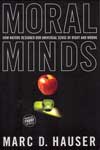 Okay. Let me collect some of the data by asking you to raise your in hands in the following way: of the donors, how many offered between one and three euros? Raise you hands. How many offered between four and six euros? How many offered between 7 and 10? Only a few very generous people, and most of you offered in the four to six range. Now, how many of the receivers rejected their offers? Keep your hands up—of those with your hands up, how many of you got offers of one to three euros? One to three euros? Small numbers? Small offer? How much were you offered? Uno. Okay, good. Now what I want you to do with me is, think through the logic of the game as if you were an economist. If you were trying to maximize your returns, donors should have given the lowest offers possible, and they should have been thinking that the receivers should accept any offer, because one euro is certainly better than zero euros. You didn't have anything to begin with, so one's better than nothing; two's better than nothing; and so is three.
Okay. Let me collect some of the data by asking you to raise your in hands in the following way: of the donors, how many offered between one and three euros? Raise you hands. How many offered between four and six euros? How many offered between 7 and 10? Only a few very generous people, and most of you offered in the four to six range. Now, how many of the receivers rejected their offers? Keep your hands up—of those with your hands up, how many of you got offers of one to three euros? One to three euros? Small numbers? Small offer? How much were you offered? Uno. Okay, good. Now what I want you to do with me is, think through the logic of the game as if you were an economist. If you were trying to maximize your returns, donors should have given the lowest offers possible, and they should have been thinking that the receivers should accept any offer, because one euro is certainly better than zero euros. You didn't have anything to begin with, so one's better than nothing; two's better than nothing; and so is three.
But it turns out that when this game is played, in many many different countries, the typical offer is exactly in the range seen here: about 4, 5, or 6 euros—it's much more than if you were trying to maximize your own returns. And yet we seem to make this calculation very quickly, spontaneously, almost without thinking. That's example number one. Keep in mind.
Here's example number two. I want you to imagine that you are watching a train moving down a track, out of control. It's lost its breaks. If the train continues, it will hit and kill five people. But you are standing next to the train tracks, and you can flip a switch and turn that train onto a sidetrack, where there's one person. Now the train will kill that one person. Here's the question: is it permissible—morally permissible—for you to flip the switch, causing the train to kill one but save five. If you think yes, raise your hand. If you think no, raise your hand. Ok, most of you think it is permissible.
Now, second example: here comes that train again, it's going to kill the five if it keeps going. You are standing next to a very heavy, fat person, and you can throw them onto the tracks, killing them, but the train will stop before the five. Is it morally permissible to throw the fat person? Yes? We've lost half of you! Or more. Okay, what happened? Why do so many of you switch from a permissible to a forbidden judgment?
Here is the idea that I want to give you tonight, in the next few minutes. There has been a long history—a very old tradition—about the sources of our moral judgments. Where do they come from? Many moral philosophers, legal scholars, think that the way that we deliver a moral judgment, like you just did, comes from reasoning. It comes from thinking about the principles, maybe utilitarian (more saved is better than less saved). You work through the principles in a conscious, reasonable, rational way. This was certainly a view that someone like Kant was very much in favor of; how you deliberate with your moral judgments. Now opposing that view — diametrically opposed — was a view that dates back at least to Hume, which is that when we give a moral judgment, we do so based on our emotions. It just feels wrong, or it feels right, to do something, and that's why we do it, that's why we say it's morally right or morally wrong.
What I want to argue for you today is that both of these views, which have dominated the entire field of moral philosophy, are wrong, at least in one particular way. What you just did tonight is an example of why it's wrong. You delivered those moral judgments quickly, probably without reasoning, and without consciously thinking about principles. And if I were to ask you, as I have asked literally thousands of people, on the Internet, in small-scale societies like the Mayans and hunter-gatherers of Africa, people deliver exactly the same judgments that you did tonight, but are incapable of justifying why. Typically they say it’s a hunch or a gut feeling. So for example, let me illustrate by telling you about my father’s response to these cases. He was a distinguished physicist. But I am not picking on the physicists. When I first presented him with these moral dilemmas, the ones you just answered, he said, yes, you can flip the switch, turning the train onto the side track; he said, yes, you can push the fat man on to the train. I said, but Dad, really? He answered "Of course, it's still five versus one." He was following good utilitarian guidelines.
And now I give him case number 3.
You are a doctor in a hospital and there are five people in critical care. Each person needs an organ to survive. The nurse comes to the doctor and says, doctor, there's a man who has just walked into the hospital, completely healthy, coming in for a visit. We can take his organs and save the five. Can you do that, Dad? He immediately replies "No, you can't just kill somebody!" I then say "But you killed the fat man five seconds ago." He then volleys back "Okay, you can't kill the fat man." "But what about the switch?" I say. Defeated, he replies "Okay, not the switch either." And the whole thing unravels because there is not a consciously accessible set of principles that people can recall and use to justify what's going on. And it's not based on emotion. It's based on a calculus—that the mind has, that it evolved to solve particular kinds of moral dilemmas. And it's not learned, either; it's there in place early in development.
If I have been sufficiently clear this far, you may have already figured out where I am going, and the connections I wish to make with another discipline. The core of my argument for moral judgment derives from an argument that the linguist Noam Chomsky developed almost 50 years ago concerning the nature of language, its representation in the mind and its normal functioning in every human. The idea here in a nutshell is that the way our moral sense works is very much like the way language works. There is a universal set of moral principles that allows the establishment of a set of possible moral systems. In this sense, perhaps this provides some convergence with what Lee said just a few seconds ago. In the same way that you might want to ask about possible universes, I want to ask the question about possible moral systems—that the mind is constraining the range of possible variation.
So the deep aspect of Chomsky's thinking about language, which I think is directly translatable into the way we think about morality, and the way we do the science, is by imagining that humans are equipped with, born with, a set of universal principles. What culture can do is change things locally—like a parameter—there are switches. Once you turn something on, things can change.
Let me try to give you a concrete example of some work that a student of mine just recently did. There's a population of people in Panama, Central America, called the Kuna Indians. There is one part of their range that is very remote, and this is where we worked. They live in a quite simple type of society, including small scale agriculture and fishing. We went there recently and gave them moral dilemmas exactly like the ones you just answered. They weren't about trolleys, they were about wild animals. So in one example, there are crocodiles coming to eat five people in the river; you're in a canoe, you can move those crocodiles off to where they will kill one. Is it permissible? The Kuna said it was, virtually every single person we asked. Here’s the second case: you can throw somebody into the river so that the crocodiles will eat him, and save the five. Is that permissible? No. They're showing the same parallel system of psychology where an intended harm—using someone as a means to a greater good is less permissible than a foreseen consequence that causes the same harm. So in the switch case of a train, you foresee the consequence, but you are not intending the harm as a means to the greater good. The Kuna are sensitive to this distinction, but here's where the cultural aspects move in to make this case more interesting: the Kuna Indians are much more willing to say that it's permissible to throw the fat man in front of the crocodiles than we are in our society. They have an unstated policy—a social behavior of high levels of infanticide. Killing, as a part of society, is much more common. And that's the way in which culture can potentially change the dynamics of how the judgment gets made. In other words, we will see a universal principle such as the means versus side effect distinction, but culture can change how much more impermissible the means based harm is when contrasted with the foreseen side effect.
At this point this is still looking relatively abstract and theoretical and what I'm interested in is how science can fuse with and energize moral philosophy to create some powerful new ideas and findings at the interface. This is not to say that science will take over philosophy. It this new enterprise works at all it will be through a deep collaboration, working to find out the origins of our moral judgments, and how they figure in our ethical decisions and moral institutions. Let me end with a few more cases to make this all a bit more concrete.
Consider a disorder that people are aware of, acutely aware of, in many societies. It's called psychopathy—people who are known for massive killings. They kill, often with no regret: they don't feel guilt, they don't feel shame, and they don't feel empathy. Now people have described that as a problem of lacking any moral sense. I think that's completely the wrong interpretation. What psychopathy is, is a case where they have completely intact moral knowledge. They would judge the cases I just gave you like everybody else in the room. What makes them moral monsters is that they lack the kinds of emotions that we have to prevent them from doing horrible things. They don’t have braking emotions. On this view, emotions don’t dictate our moral judgments, but they do guide our moral behavior, how we act. We are now engaged in a collaborative project, working to actually test psychopaths, to see whether that is in fact the case. It is too early to tell, but stay tuned.
The second part of the story is to use, as John mentioned a few minutes ago, some of the modern techniques in the neurosciences where you can image the brain, attempting to understand which parts of the brain are active, how they are engaged when we come to our moral judgments, and how they resolve conflict.
To sum up, we're in an extremely exciting phase now where a set of questions that were forever the providence of moral philosophy and law are now coming directly into contact with the sciences. This is exciting because both areas are working together and it may have direct implications for the law, and the extent to which formal institutions like law and religion penetrate our evolved moral sense.
MARC D. HAUSER, an evolutionary psychologist and biologist, is Harvard College Professor of Psychology, Biological Anthropology, and Organismic & Evolutionary Biology, and Director of the Cognitive Evolution Laboratory. He is the author of The Evolution of Communication, Wild Minds, and the recently published Moral Minds: How Nature Designed Our Universal Sense of Right and Wrong.

THE SELFISH GENE: THIRTY YEARS ON
Thursday 16 March 2006
6.45pm to 8.15pm
The Old Theatre (Old Building, LSE, Houghton Street, London WC2A 2AE)
It is thirty years since The Selfish Gene revolutionised our understanding of living things. Since then, Richard Dawkins' pursuit of the implications of science has informed areas as diverse as biology, psychology, philosophy and religion. His work has made an outstanding contribution to the understanding of science in society; and it has shown how science deepens our appreciation of the natural world.
At this event, Darwin@LSE, in collaboration with OUP, brings together leading intellectuals to explore these insights — and to make their own distinctive contributions to this fertile field.
Helena Cronin
Darwin@LSE
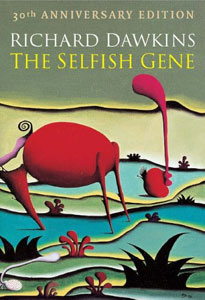

Speakers
Daniel C Dennett (Tufts)
Author of Darwin's Dangerous Idea; Freedom Evolves; Breaking the Spell
'The view from Dawkins' mountain'
Sir John Krebs, FRS (Zoology, Oxford)
'From intellectual plumbing to arms races'
Matt Ridley
Author of The Red Queen; The Origins of Virtue; Genome
'Selfish DNA and the junk in the genome'
Ian McEwan
Booker Prize winner and author of Enduring Love; Amsterdam; Saturday
'Science writing: Towards a literary tradition?'
Richard Dawkins, FRS (Oxford)
Author of The Selfish Gene; The Blind Watchmaker; The Ancestor's Tale.
'Afterword'
Chair: Melvyn Bragg
Broadcaster, writer and novelist
Organiser
Helena Cronin
Founder and Director of Darwin@LSE and author of The Ant and The Peacock.
|
Quicktime streaming audio [1hr.22 min]
(double-click image to begin) |

HELENA CRONIN launched and runs Darwin@LSE. She is a Co-Director of LSE's Centre for Philosophy of Natural and Social Science. She is the author of The Ant and the Peacock: Altruism and Sexual Selection from Darwin to Today, which was chosen as one of The New York Times' nine best books of the year for 1992, and co-editor of Darwinism Today, a series of short books by leading figures in the field of evolutionary theory. Each title is an authoritative pocket introduction to the Darwinian ideas that are setting today's intellectual agenda.


MELVYN BRAGG is a broadcaster, writer and novelist. He presents In Our Time for BBC Radio 4, a series where he and his expert guests discuss the history of ideas, and explore subjects in culture and science. He presented Start the Week between 1988 and 1998. In his 1998 series On Giant's Shoulders he interviewed scientists about their eminent predecessors, and from 1999 to 2001 he presented The Routes of English, a series celebrating 1,000 years of the spoken language.
As well as presenting for Radio 4, he is Controller of Arts for London Weekend Television and is the presenter of The South Bank Show. In 1998 he was made a life peer (Lord Bragg of Wigton). He has written 19 novels, the latest of which is Crossing the Lines.
MELVYN BRAGG: Introduction
They are in you and me; they created us, body and mind; and their preservation is the ultimate rationale for our existence. They have come a long way, those replicators. Now they go by the name of genes, and we are their survival machines.
In 1976, a young zoology lecturer at Oxford University published his first book, from which those words are taken. Powerfully encapsulating a gene's-eye view of life, The Selfish Gene rapidly became deeply influential both within biology and associated disciplines, and in wider intellectual debate.
Thirty years and over a million copies later, The Selfish Gene has come to be seen as one of the defining books of the twentieth century. To commemorate this thirtieth anniversary, Oxford University Press has published a sparkling new edition, with a fresh introduction by the author and an extensive collection of reviews that are testimony to the book's importance and influence.
And more … Today also sees the publication of another OUP book: Richard Dawkins: How a scientist changed the way we think. It is edited by Alan Grafen and Mark Ridley, both former students of Richard's. The book is a collection of essays by scientists, philosophers and writers, which reflects on Richard's contribution and influence as scientist, rationalist, writer and public intellectual, in areas such as biology, philosophy, evolutionary psychology, artificial life and debates on religion.
Our event today is the launch of this lively and wide-ranging collection. Tonight, Darwin@LSE and OUP have brought together some of these and other intellectuals with Richard, to explore these insights further and to make their own distinctive contributions.
So … welcome, everyone, to 'The Selfish Gene: Thirty years on'.

[MELVYN BRAGG:] Our first speaker is DANIEL DENNETT. A professor at Tufts Universit
y, Dan is an outstanding polemicist and one of those all-too-rare philosophers who takes science, particularly Darwinian theory, seriously. His books include Brainstorms, Brainchildren, Elbow Room, Consciousness Explained, Darwin's Dangerous Idea and — a new book, published this week — Breaking the Spell, an original and comprehensive explanation of religious belief.
Dan's talk takes 'The view from Dawkins' mountain'.
DANIEL DENNETT: 'The view from Dawkins' mountain'.
Thank you very much.
When I first read The Selfish Gene — it was not in '76, it was a few years later — I was struck by the very first paragraph, and by one of the chief sentences in it — not quite the sentence that Melvyn Bragg just read, but another very similar sentence:
We are survival machines, robot machines, blindly programmed to preserve the selfish molecules known as genes.
And then the author went on to say,
This is a truth which still fills me with astonishment.
Thirty years on I think the question that can be raised is, are we still astonished by this remarkable inversion, this strange inversion of reasoning that we find in this claim?
When I read the book it changed my life. I was a Darwinian, but I didn't understand evolutionary theory at all well, and I thought after 30 years I should go back and re-read the book again. I was a bit afraid — I'd read parts of it many times, because I'd assigned it to my students in many courses — philosophy courses, even. I wondered if re-reading the whole book I would have one of those disappointing experiences where you think, well, yes, this was a young man's book, and this was very exciting at the time, but I wonder how well it holds up.
So I thought I would put it to as stern a test as I knew, and so last June I took it with me, the more recent edition, on a two-week trip to the Galapagos, where I spent a week on a wonderful three-masted schooner, the Sagitta, retracing Darwin's footsteps with some excellent evolutionary biologists, who were there for the World Summit of Evolution. That's a pretty good test of a book. That's where I reread the book, and it came through with flying colors. It was a wonderful accompaniment to that wonderful and amazing week.
When I thought about which features of the book I would talk about tonight, knowing who the others were who were going to be speaking about it, I realized that I should perhaps stick to some of the grander, larger, more philosophical themes and leave some of the wonderful details to people who are more expert in those.
And I also thought, on rereading the book, that the late Steve Gould was really right when he called Richard and me Darwinian fundamentalists. And
I want to say what a Darwinian fundamentalist is. A Darwinian fundamentalist is one who recognizes that either you shun Darwinian evolution altogether, or you turn the traditional universe upside down and you accept that mind, meaning, and purpose are not the cause but the fairly recent effects of the mechanistic mill of Darwinian algorithms. It is the unexceptioned view that mind, meaning, and purpose are not the original driving engines, but recent effects that marks, I think, the true Darwinian fundamentalist.
And Dawkins insists, and I agree wholeheartedly, that there aren't any good compromise positions. Many have tried to find a compromise position, which salvages something of the traditional right-side-up view, where meaning and purpose rain down from on high. It cannot be done. And the recognition that it cannot be done is I would say, the mark of sane Darwinian fundamentalism.
How on earth is it possible to adopt such a position? Evolution itself seems to be such a mindless and cruel thing. How can such heartless culling produce the magnificent designs that we see around us? It seems just about impossible that such a simple mechanical sieve could produce such amazing design in the biosphere. One of the key elements in The Selfish Gene, one that has always struck me as particularly valuable to me, strengthening my resolve in my own work, and also showing the way, is what I'm going to call by the rather bizarre name of "mentalistic behaviorism".
First I want to remind you of what Francis Crick called Orgel's Second Rule. "Evolution is cleverer than you are." Now what Crick meant by this jape, of course, was that again and again and again evolutionists, molecular biologists, biologists in general, see some aspect of nature which seems to them to be sort of pointless or daft or doesn't make much sense — and then they later discover it's in fact an exquisitely ingenious design — it is a brilliant piece of design — that's what Francis Crick means by Orgel's Second Rule.
But notice that this might almost look like a slogan for Intelligent Design theory. Certainly Crick was not suggesting that the process of evolution was a process of intelligent design. But then how can evolution be cleverer than you are?
What you have to understand is that the process itself has no foresight; it's entirely mechanical; has no purpose — but it just happens that that very process dredges up, discovers, again and again and again, the most wonderfully brilliant designs — and these designs have a rationale. We can make sense of them. We can reverse-engineer them, and understand why they are the wonderful designs they are.
And what this suggests is that it would help us to understand how this is possible if we could break all this brilliant design work up, into processes which we could understand the rationale of, without attributing it to the reason of some intelligent designer.
In other words what we need is this weird thing that I'm calling "mentalistic behaviorism". Now to many the idea of mentalistic behaviorism would seem to be a contradiction in terms. Classical psychological behaviorism is profoundly and explicitly anti-mentalistic. So what on earth could mentalistic behaviorism be? It could be exactly what Richard writes about in The Selfish Gene. How on earth can a gene be selfish? It doesn't even have a mind. It is just a bunch of information in the genome; how could it be selfish?
And what Richard showed, patiently, vividly, clearly, again and again, is if you treat it as if it had a mind, if you treat it mentalistically, you can characterize and make sense of the interactions, the dynamics of the processes that produce the effects that strike us as so intelligent. What we can then see is that these processes are arms races. Not just arms races between armies of intelligent people, but arms races between trees, and between bacteria, and between any form of life you want to name. We can watch an arms race generate more and more design, more exquisite solutions to problems, in ways that are strikingly similar to the more intelligently (but not very intelligently) guided arms races that give us the metaphor in the first place.
Also we find bargains struck, wonderfully intelligent bargains struck, for instance, between fruit-producing plants and omnivorous animals that carry the fruit off and pay for this high-energy fruit by distributing the seeds with their fertilizer at some distance from the tree, just to give one vivid case.
Many wonderful bargains, many ploys and counter-ploys which can be described in this mentalistic language at the same time that one rigorously insists: these things don't have minds, they are just mechanical processes, they are simply structures that have effects in the world that invite this particular metaphorical — but quite rigorously metaphorical — interpretation.
I have recently hit upon a way of characterizing what a virus is, which I like, and which I see a lot of evolutionary biologists like too: a virus is a string of nucleic acid with attitude! Of course it doesn't have a mind, but it has attitude. What does that "attitude" mean? It means that it behaves in such a way that it promotes its own replication, more than its rivals promote their own replication. That's what it is to be a virus.
Now I want to return to the quote I began with — "We are survival machines, robot vehicles, blindly programmed to preserve the selfish molecules known as genes" — because I want to talk about the other philosophically brilliant contribution in The Selfish Gene.
The first one is the pioneering clear articulation of mentalistic behaviorism and the defense of it. We can use selfish gene talk because we know how to translate that into terms that are purely behavioristic. But now I want to concentrate on another word in that phrase, "the selfish molecules known as genes." That, I think, is a nice example of Richard's writing skill. The first time he describes them, he calls genes selfish molecules, but later in the book, once we've gotten used to this way of talking, he shows that that's actually not quite what he is talking about. He's saying something much more subtle and much more interesting. What a philosopher would say is that a gene, it turns out, is a type, not a token.
What's a token? A token is an individual word — like the word "gene" up there on the screen behind me, a token that is made of nothing but shadow against a light background. Some tokens are made out of ink, some are made out of plastic letters and so forth — it's a physical object, it's like a molecule. But what Dawkins was drawing attention to was that the concept of gene that really does the work is the concept of a type, not a token. Here he says:
What I am doing is emphasizing the potential near-immortality of a gene in the form of copies as its defining property.
In other words he was saying something quite remarkable. He was saying that genes are like words, or like novels, or like plays, or melodies!
Now of course one of the famous (and most embattled) chapters in The Selfish Gene, one that I have spent a lot of time articulating and defending and trying to extrapolate further, is the chapter on memes. And there he said memes are like genes. What I want to point out, if it isn't already obvious, is that earlier in the book he said that genes are like memes! He said that genes are information structures that have many tokens, many physical tokens, and it's the information that you're really talking about when you're talking about the gene.
Now this of course was not entirely original to Richard. It was also stressed by George Williams, for instance, in his own work which was one of the inspirations for Richard. In other words, the hox genes are like the Romeo and Juliet memes! There's many copies of them, we can recognize them, we can see the role that they play in many different contexts. And they are all related not only by similarity but by having been copied and copied and copied, having all been replications coming from earlier instances.
Here on the screen is a diagram of the tree of life. It may not look like a tree to you, because you're not used to seeing trees from this angle — this is a bird's-eye view of a tree. You're looking down from above. You see the main trunk right in the middle there. This diagram is already out of date; I've had some interesting discussions with evolutionary biologists in the last two weeks and I've learned that some of them would draw the lines rather differently now. But it shows the three main branches of the tree — the bacteria, the archaea, and the eukarya, and of course we're on this lower eukaryote branch, and there we are, Homo — and the artist has put two other close cousins on the tree of life on this map — Coprinus and Zea.
What are those? Mushrooms and corn — our close cousins! Now one of these species, Homo sapiens, is exceptional: of all the species on the planet, it is the only species that has evolved that can understand that it's one of the fruits on the tree of life. We are unique in that regard. It is human language and culture that has made this possible. Not just our brain power, but the fact that we have a division of labor — because we have language and culture we can fill our brains with the fruits of the labors of everybody else on earth, not merely those who are our ancestors. Tonight we celebrate one of its most brilliant creations, The Selfish Gene.
Thank you very much.
 [MELVYN BRAGG:] Thank you very much.
[MELVYN BRAGG:] Thank you very much.
Our next speaker is SIR JOHN KREBS. A Fellow of the Royal Society and until last year a Royal Society Research Professor in Oxford's Department of Zoology, John is a highly distinguished biologist. He is one of the founding fathers of behavioural ecology, having co-edited the leading textbooks on the subject; and, with Richard, he has co-authored some classic papers in evolutionary thinking. Having been head of the Natural Environment Research Council (NERC) and of the Food Standards Agency, he is now Principal of Jesus College, Oxford.
John's talk is entitled 'From intellectual plumbing to arms races'.
SIR JOHN KREBS: 'From intellectual plumbing to arms races'
Thank you very much, Melvyn. I've got half as much time as Dan, so I'm going to have to talk twice as fast — or say half as much.
I was thinking, in this brief presentation, of how I should characterize Richard and his contribution, and hence my title, which I'll explain in a moment. But when I had almost worked out what I was going to say, I happened to go into the men's loo in the Department of Zoology, and there were some graffiti which gave me a different characterization of Richard. The question was this: What's the difference between God and Richard Dawkins? The answer below was:
"God is here but everywhere; Dawkins is everywhere but here."
Richard does travel around quite a bit.
Also of course the challenge of giving a very short talk is the one that Mark Twain summarized in the famous phrase, "If I'd had more time I'd have written a shorter letter. "
But first let me talk about Richard as an intellectual plumber. I first came across the notion of an intellectual plumber when I was sitting in my then Oxford College, Pembroke, next to Simon Blackburn, the philosopher now at Cambridge. I turned to him and asked, "What's the point of philosophy anyway, Simon?"
And he said, "Well, think of it this way, John. You're just a biologist, you sometimes have leaks in your thinking, and what you need is an intellectual plumber to patch up those leaks, and that's what philosophy will do for you. "
This is one way of describing Richard. He is indeed an intellectual plumber, and if anybody has leaks in their scientific thinking, be it about evolution or about any other aspect of biology or science in general, Richard's intelligence and razor-sharp analysis will detect the leak and carefully fix it for you.
And he also expresses it beautifully, and one of my favorite quotes from Richard's writing is not out of The Selfish Gene but from the book River Out of Eden, in which he says, talking about cultural relativism:
Show me a cultural relativist at thirty thousand feet and I'll show you a hypocrite. Airplanes are built according to scientific principles and they work. They stay aloft and they get you to a chosen destination. Airplanes built to tribal or mythological specifications such as the dummy planes of the Cargo cults in jungle clearings or the bees-waxed wings of Icarus don't.
That's a beautiful deconstruction of cultural relativism.
But — you might say, supposing Richard was wrong? Well, here I'm tempted to quote Lord Carrington, when asked what would happen if Margaret Thatcher was run over by a bus. And his reply was, "It wouldn't dare."
But I want now to move on from Richard as an intellectual plumber to talk about another aspect of Richard's contribution to biology, which is about a really original idea, a really original way of looking at a very familiar phenomenon.
Now ideas of course never come out of a vacuum. So The Selfish Gene, a highly original book, by everybody's reckoning, was born out of a particular zoological environment.
Richard was a student at Oxford in the 1950s and early '60s, which was a center of neo-Darwin in biology. People like Niko Tinbergen, David Lack, E. B. Ford, had already begun to articulate the debate about levels of natural selection: does selection act to the level of the group, the individual, or the gene? It was also an environment in which there'd been huge success at popularizing biology, in particular behavior. For example, in the writings of Niko Tinbergen and Desmond Morris, who was also associated with the department.
But to see just how radical Richard's ideas were in this overall context, let's look at his writing about communication. And that's what I want to talk about for the next few minutes.
What do you think the essence of communication is? Whether it's communication amongst human beings, or amongst other animals on the planet, or amongst plants? Well, at the time when Richard entered into this field, ethologists, information theorists, social psychologists, and others, all agreed that the essence of communication is transfer of information. That's what it's all about. And those who thought more specifically about animal behavior and evolution saw the whole process by which animal communication has developed by natural selection as one in which the efficiency of information transfer is increased.
Richard's supervisor, the Nobel-prize winning Niko Tinbergen, made a very famous film called "Signals for Survival," which won all sorts of international prizes, and the opening phrase of that film, which is all about animal communication, is a memorable moment, with Niko standing there in a colony of herring gulls in the North of England, and as he talks to the camera he raises his fist and he says, with a Dutch accent, "When I do this, you know what I mean. "
In other words, it's clear that communication is about transferring information. And Niko himself summarized communication by saying:
"One party, the actor, emits a signal, to which the other party, the re-actor, responds, in a way that the welfare of the species is promoted."
Absolutely wrong.
You can see already why it's wrong; it's a species welfare-oriented view. And here's how Richard defines communication a few years later:
"Natural selection favors individuals who successfully manipulate other individuals. Whether or not this is to the advantage of the manipulated individuals. Selection will also work on individuals to make them resist manipulation. But actors do sometimes succeed in subverting the nervous systems of re-actors. As adaptation to do this are the phenomena we see as animal communication."
In other words, Richard reframes the whole of thinking about communication. It is not about information transfer, but about manipulation. It is about an arms race between manipulators and recipients of manipulation. And so influential is that idea, that in a recent monograph on animal communication by two American scientists, they start the history of the subject with Richard's paper.
Let me just make three comments as I move towards the end.
The first thing you may ask if you think about communication as manipulation, how on earth could manipulation succeed? Surely reactors, over evolutionary time, would develop the capacity to resist manipulation.
Before you get too seduced by that thought, think of your own senses, and the way they can be manipulated. Otherwise, why is it that men are influenced by motor cars with semi-naked women draped over them? It's manipulating the senses, persuading men that they might indeed attract semi-naked women of a certain kind if they bought that particular make of car. [I own a BMW and I can confirm that it doesn't have this effect.] Think of people who respond to pornographic images, flat images of color, but are sufficiently aroused by them to think of them as real sexual stimuli.
In a more sophisticated and perhaps less blunt way, think of the writing of Keats in his "Ode to a Nightingale" — the opening phrase —
"My heart aches and a drowsy numbness pains my sense as though of hemlock I had drunk."
The nightingale’s song is making him drowsy and numb as though he'd drunk hemlock.
But there's another factor why signals might be manipulative. Think of how signaling might start — the reactor anticipating the behavior of the actor, and that very anticipation creating the basis for signals that manipulate.
The second point I want to make is that this idea about communications manipulation becomes all the more troubling when you think that each individual can play the role of actor or re-actor. So we're not talking about evolution between individuals, but evolutionary interactions between roles. And this is an example in the way in which, as Dan has already articulated, jumping out of the mind set of thinking of the individual as the unit of evolution enables you to free your thoughts and be creative.
And finally, my third point here is this. If communication is the result of an arms race between manipulation and resistance, what's the end point? And here Richard had further insight. The kind of end point you would expect depends on the degree of conflict of interest between the two roles. In cases where the conflict is very strong, like males attracting females when the females are reluctant to mate, the arms race between manipulation and resistance results in an escalation. And that's why you get brilliantly elaborate, vocal, visual, and other signals associated with sexual displays.
On the other hand, if the conflict of interest between the roles is minimal, as it might be between members of a pair who have already mated, then the evolutionary process will lead to a reduction in the visibility, the amplitude, of the signal. And that dichotomy in the nature of communication is still one that stands to be investigated by biologists.
So in summary, Richard's writing about communication transformed our thinking about not just animal communication, but, I believe, about communication in general.
And a final comment: people sometimes say to me, what was Richard doing before he wrote The Selfish Gene? What was he known for. And the answer is, Richard was known for his organ before he wrote The Selfish Gene.
There's nothing personal, Richard, you understand. But Richard did invent a device for event-recording with a computer. This was in the very early days of computing. It's hard to imagine that what you now have in a laptop took a room as big as the average academic's office to process information and store it. And Richard invented the so-called Dawkins Organ, which was a device for recording data by pressing keys and that went straight into a computer.
The other particular thing that Richard did early in his career was to study the development of pecking behavior in chicks. When I came to write my own thesis, I read Richard's thesis as an example of how it should be done. And I was struck by a sentence in the very first Chapter, in which under "methods" it said, "The chicks were tested in Paris. And I thought, my God, this man's got real style. It was only about ten minutes later that I realized that it was a misprint for "The chicks were tested in pairs. "
Thank you.
[MELVYN BRAGG:] Thank you.

And now to MATT RIDLEY. 23 pairs of chromosomes, together with a doctorate from Oxford University, equipped Matt for a career as a top-rank science writer. He has worked for The Economist, the Daily Telegraph and the Sunday Telegraph. His books — The Red Queen, The Origins of Virtue, Genome, Nature via Nurture — have sold over half a million copies and been short-listed for six literary prizes; and in 2004 he won the American National Academies Book Award. He is the energetic founding chairman of Newcastle-upon-Tyne's International Centre for Life, which is highly regarded for its research in genetics.
Matt will talk about 'Selfish DNA and the junk in the genome'.
MATT RIDLEY: 'Selfish DNA and the junk in the genome'
Thank you very much, Melvyn.
Good evening; it's a huge honor to be here. I'm only here because I intercepted an invitation for Mark Ridley. Just to be clear, the excellent book about Richard is edited by Alan Grafen and Mark, not by me, although I do have a chapter in it, just to confuse people. We have, Mark and I have had our Y chromosomes analyzed by Brian Sykes and we have the same Y chromosomes haplotypes, so he'd say the same thing as I'm going to say anyway. After all, we are supposed to believe in genetic determinism.
What I want to talk about tonight is a throwaway remark in The Selfish Gene, which I think was not only prophetic but in a sense made the book much more literal than it otherwise is. At the time, in the early 1970s, it had just been discovered that genomes have a lot more DNA in them than is necessary for coding for proteins. And this was a big puzzle. Richard suggested a solution to this, which turned out to be mostly true, and was completely original.
The remark is found on page 47 of the first edition of The Selfish Gene, and it goes:
Biologists are wracking their brains trying to think what useful tasks this apparently surplus DNA in the genome is doing. But for the point of view of the selfish genes themselves there is no paradox. The true "purpose" of DNA is to survive, no more no less. The simplest way to explain the surplus DNA is to suppose that it is a parasite, or at best a harmless but useless passenger hitching a ride in the survival machines created by other DNA.
And as a classic of the argument in The Selfish Gene, what he's doing is saying cui bono, who benefits. Is it possible that perhaps this stuff is there not for the good of the species, but for the good — not even for the good of the whole genome, but for the good of the bits of DNA itself. He's turning the world upside down.
Just to recount the history of why this is an interesting question, by 1971 the phrase the C-value paradox had been coined for this problem, that nuclear genomes vary enormously in size, up to 300,000-fold, but the number of proteins made from them doesn't vary nearly as much.
Some species have enormous genomes and produce no more proteins than others. The idea was beginning to be abroad in the late '60s, early '70s, that this might just be junk — that an awful lot of the DNA in the genome might stand for nothing; it might have no purpose.
And in a lecture at MIT in 1972 Crick said, What is all this DNA for? Is it junk or is it an evolutionary reserve? Still thinking, though, in terms of what's it for in terms of the organism. And in 1978 Tom Cavalier-Smith suggested that perhaps it's there to support the rest of the DNA, to place the genes in the right parts of the nucleus, to spread the genes out, and things like that. And that's an idea that I'll come back to in a minute, because it has a second history. But it's in 1980 that the idea of selfish DNA is coined in two papers in Nature by Doolittle and Sapienza and Orgel and Crick, arguing that perhaps most of, or some of this DNA is simply selfish DNA, that it's there because it's good at getting itself there. It's good at replicating itself, it's good at copying itself. They were quite explicit, they said this idea is not new, it's sketched briefly but clearly by Dawkins in his book The Selfish Gene. There's no question that this originated as an idea with Richard. By the way, — in 1982 the first computer virus was created, the Elk Cloner virus — and that of course has an interesting parallel with the argument that I'm talking about.
Just to illustrate what we're talking about — genome size bears very little relation to the complexity of an organism; two creatures like a puffer fish and a zebra fish have very different size genomes, even though they look very similar.
From this end of the telescope, human beings look like they have quite a big genome, but if you turn the telescope around and look from another direction, the human genome looks rather a small one, compared with that of grasshoppers, which is at least three times as large, or deep-sea shrimps, which have ten times as much DNA as us.
Salamanders get even bigger, and the king of the genomes in the animal kingdom at least, is the marbled lung fish. Some people say amoebae have larger genomes at 500 gigabases, but they're almost certainly polyploid, as are lilies, which also have very big genomes. This is a perfectly ordinary diploid genome in the marbled lungfish, and it has as much digital information in it as about ten British Museum reading rooms.
So what's it all for? Well, it does appear that Richard was partly wrong. It does appear that the genome size is under selection, and that it's linked to the size of the cell. The bigger the nucleus the bigger the cell, it's a pretty good rule. And there's all sorts of evidence to suggest that animals are optimizing the size of their genomes, so parasites often minimize the amount of junk in their genomes in order to shrink themselves.
Malaria parasites have very little junk in their genomes, and very small cells. At the other extreme, ciliates have very large cells, and they achieve this with small genomes by making a huge macronucleus in which they put sort of working copies of all their genes in multiple numbers. They are an exception that proves the rules; they have a small genome but a large cell but only because they make a special sort of working nucleus that's a whole lot bigger.
And high-metabolism animals, like bats, and birds, have got rid of quite a lot of the junk in their genome, in order to be able, it appears, to have small blood cells with larger surface areas. A lesser horseshoe bat like this has a genome less than two gigabases, compared with three gigabases for us. Why the lungfish, the marble lungfish, has such a gigantic genome is not clear, but it does look like it may be something to do with having very big cells, in order to be able to store glycogen when it estivates during a drought, when it disappears into the mud and lives there for six months off its glycogen reserves. That's a possibility. But one of the strongest pieces of evidence that genome size is not — that it's not possible simply to expand your genome at length by letting parasites run riot is the ALU sequence, which is one of the commonest sequences in our genomes, which has appeared in the last 30 or 40 million years. Mice don't have it, but our genome is not bigger than mice. In other words it's come at the expense of another sequence, rather than added to it.
Just in passing, it does seem that big genomes go with small brains. This is particularly true in amphibia, where — in frogs and salamanders, the larger the genome the smaller the brain. A frog has about five gigabytes and a comparably large brain; a salamander has about 30 gigabytes and a smaller brain, and a mudpuppy has an 85- gigabase — sorry, I keep saying byte, I mean base — gigabase genome, and has an extremely small brain. Human beings luckily have larger brains than frogs. There are two reasons for this: the bigger your genome the slower you are at duplicating yourselves, so the harder it is to grow a big brain by multiplying cells. And also it's harder to fit the same number of neurons in your head if neuron bodies are bigger.
How much of the human genome might be selfish DNA? Well, what we think of the genomes consisting of is genes; well, there is the proportion of our genome that actually consists of real protein-coating genes, sequences that direct the manufacture of proteins themselves. One and a half percent. Add in another three and a half percent for all the control sequences, all the functional DNA that seems to be under very strong purifying selection.
That's where all the promoters and enhancers and switches that control the expression of the genes is. We've only got to five percent and we've got all that we need to build and run a human body. Eight percent consists of retro-viruses. 450,000 copies of the retroviruses, complete or incomplete, in our genomes. They're there because they're good at being there; they're simply left over from infections in the past, with viruses that are good at stitching copies of themselves back into our genes. There's three percent transposons — these are just cut-and- paste sequences that are good at moving around the genome. Many more of them in plants and fruit flies, but fewer in us.
But the really interesting ones are the LINEs: long interspersed nuclear elements. Or autonomous retroposons. These are sequences that are several thousand base pairs long, they're transcribed, two proteins are made from them, the proteins bind to the messenger RNA and take it straight back into the nucleus, make a DNA copy, and stitch it back into the genes. That's all they ever do.
They are as clear a definition as you can get of a selfish gene, they are simply copying themselves and spreading themselves around the nucleus. The SINEs are very similar, there's 13 percent of our genomes consist of them. The ALU that I mentioned is one of these. The only difference is that they parasitize the LINEs. They don't make their own machinery for copying themselves, they use the LINE machinery. These are lesser fleas on greater fleas.
All that gets you to about half the human genome. What's left? Well, there's introns — gaps inside genes — there's simple sequence repeats, the bits we use for DNA finger printing and things like that, segmental duplications, and a whole bunch of other stuff. Broadly speaking, the green stuff I think is true junk DNA. In other words it doesn't matter what its sequence is. The blue stuff is the functional DNA that builds and runs our bodies. And the red stuff is there because it's good at being there. It's things that have spread at the expense of other sequences, it's selfish DNA.
Just to clarify the LINEs and SINEs, at any given time in the last 60,000,000 years there's been one different LINE that's been dominant, that's been most dominant in the human lineage, there's been 16 overall that have been rampaging through our genomes. The one that's currently doing so is called LINE 1, it's at the moment taking up about 17 and a half percent of your genome as you sit here today. Likewise the ALU sequences have gone berserk, their activity peaked about 40,000,000 years ago in the primate lineage, it's a 280-base per sequence, and it's repeated over a million times.
Now interestingly the LINEs are found in the AT-rich regions. These are where there's fewest genes — which is what you'd expect if the organism was saying, we don't like these parasites, we want to keep them out of the way of genes. But the older SINEs are actually found in the CG-rich regions, the areas where most genes are. In other words the longer a SINE has been hanging around, the more it's been recruited to areas where there are genes, so it looks like the organism has somehow co-opted some of these sequences to actually affect the expression of genes, which is an interesting case of a selfish gene being, if you like, tamed.
Just worth reminding ourselves that junk DNA has spawned a bigger industry than coding DNA already — I'm referred to DNA finger-printing — and the two people of course who made DNA a household word are, Monica Lewinsky and O.J. Simpson, if you think about it.
Ladies and gentlemen, my conclusion is that it looks like about 45 percent of the human genome is made up of what you might literally call selfish genes — sequences that copy themselves very efficiently. And that Richard's suggestion was right. However, selfish DNA can, it seems, spread at the expense of neutral junk, but doesn't seem to be able to actually expand the genome. We're not in danger of suddenly have our genomes grow bigger and bigger and bigger. And these selfish elements range from unwanted parasites to co-opted symbionts, and most of them are somewhere in between the two. Richard was absolutely right, in a very literal sense, and the genome would actually be inexplicable without the notion of the selfish gene.
Thank you.

[MELVYN BRAGG:] Our next speaker is IAN McEWAN. Ian's books have earned him
worldwide critical acclaim. Shortlisted for the Booker Prize for Fiction three times, he won the award in 1998 for Amsterdam. And many other prizes span his career, from an early Somerset Maugham Award to the triumph of a Book Critics' award. Ian is a writer who understands and respects science. His book Enduring Love draws on explicit Darwinian themes; and his latest novel, Saturday, is based on a day in the life of a brain surgeon.
His talk entitled 'Science writing: Towards a literary tradition?'
IAN McEWAN: 'Science writing: Towards a literary tradition?'
Let me start with the opening of an essay on immunology, which might entertain you. And this is in sense an appeal for a grand parlor game among those who love science.
'It is whispered in Christian Europe that the English are mad and maniacs: mad because they give their children smallpox to prevent their getting it, and maniacs because they cheerfully communicate to their children a certain and terrible illness with the object of preventing an uncertain one. The English on their side say: 'The other Europeans are cowardly and unnatural: cowardly in that they are afraid of giving a little pain to their children, and unnatural because they expose them to death from smallpox some time in the future. To judge who is right in this dispute, here is the history of this famous inoculation which is spoken of with such horror outside England'.
Well, you have probably guessed that this is Voltaire, writing in the late 1720s. Voltaire visited England — probably the only instance in recorded history when an intellectual Frenchman has come to England and been impressed by what he found. Voltaire wrote beautifully in his Lettres Philosophiques — translated as Letters from England — on religion, politics, and literature. And he also wrote about science — he attended Newton's funeral and was awed by the fact that a humble scientist was buried like a king in Westminster Abbey. But I want to afford Voltaire an important place in the library that will help us define a literary tradition of science. He wrote superb expositions, lucid expositions, on Newton's theories of optics and gravitation. They still stand today. If you want to know what Newton said you can read Voltaire, as good as anything to be found.
The atmosphere of this gathering tonight, celebrating a book written 30 years ago, really does reinforce my impression that we need a stronger sense of a scientific literary tradition. Those of us educated in a literary tradition take for granted a kind of mental map — a temporal map, really — of a literary history, a canon, a hierarchy if you like. The weight of the past, the cumulative achievements, give meaning to the achievements of the present. This canon has been vigorously challenged in the last 20 years — too male, too middle class, too white, too imperial, or whatever. But in order for it to be challenged it had to exist. One had to have Donne and Tennyson and Clough and Virginia Woolf, all placed in the firmament, waiting to be redefined, elevated further, or shot out of the sky. It seems to me that the pace of change in contemporary science, and the necessary passion for innovation, put us in danger of neglecting, or forgetting completely, what a beautiful and intricate tapestry of curiosity, persistence, human weakness and inspiration a scientific literary history could represent.
One of Richard's achievements has been to extend an enjoyment of science to layman like myself. Permission has been granted, no apologies necessary. Just as we can enjoy and discuss opera, art, movies, poetry, without being composers or performers, painters, film directors or poets, so we can engage with this vast edifice, the sublime achievement of human creativity. But to move around inside this edifice, we need the temporal spaciousness of a literary past.
Here is another one for the shelf — a man has ground up some lenses, taken some water from a lake and has been looking at it carefully, with an open mind:
'I found floating therein divers earthy particles and some green streaks , spirally wound serpent wise and orderly arranged... Other particles had but the beginning of the foresaid streak; but all consisted of very small green globules joined together; and there were very many small green globules as well.... These animacules had divers colours, some being whitish and transparent, others with green and very glittering little scales...And the motion of most of these animacules in the water was so swift, and so various upwards. Downwards and roundabout, that 'twas wonderful to see: and I judge that some of these little creatures were above a thousand times smaller than the smallest ones I have ever yet seen...'
This is Leeuwenhoek writing to the Royal Society in 1674, giving the first account of, among others, spyrogyra. He wrote his observations in letters to the Royal Society over a period of 50 years. And it is no accident that he should have sent his letters there. At that time, in a small space, within a triangle between London, Cambridge, and Oxford, and within a couple of generations, there existed nearly all the world's science. Newton, Locke, (I think generally we have to include certain philosophers in here, Hume most certainly), Willis, Hooke, Boyle, Wren, Flamsteed, Halley — an incredible concentration of talent, and the core of our library — its classical moment, if you like.
A good question to ask about this tradition is, how important is it that what one reads is true? Do we exclude those who simply got it all wrong? I think we have to beware of writing a Whig history of science, a history of the victors. I think we need to remember phlogiston and the ether and protoplasm. Scientists who hurl themselves down dead alleys perform a service for everyone else — they save them a great deal of trouble.
My son, William McEwan, last year completed an undergraduate biology course at UCL. When he was studying genetics, he told me he was advised to read no papers written before 1997. One can see the point of this advice. In the course of his studies, estimates of the size of the human genome shrank by a factor of three. Such is the headlong nature of contemporary science. But if we understand science merely as a band of light moving through time, advancing on the darkness, and leaving darkness behind it, always at its best only in the incandescent present, we turn our backs on a magnificent and eloquent literature, an epic tale of ingenuity propelled by curiosity.
Another consideration I think for the literary tradition has to be style. Not every scientist or science writer is a stylist. How about this? You will guess the author, of course:
'Individuals are not stable things, they are fleeting. Chromosomes too are shuffled into oblivion, like hands of cards soon after they are dealt. But the cards themselves survive the shuffling. The cards are the genes. The genes are not destroyed by crossing over, they merely change partners and march on. Of course they march on. That is their business. They are the replicators and we are their survival machines. When we have served our purpose, we are cast aside. But genes are the denizens of geological time: genes are forever.'
I raise my hat to that lovely phrase — "shuffled into oblivion". The analogy with cards — the hand being the information, the cards themselves as the genes — is precise and informative — true eloquence. The Selfish Gene would have to have a central place in our tradition, as would many other of Richard's books. In particular, Unweaving the Rainbow has a powerful appeal to the literary imagination.
There is no time to discuss the nineteenth century's contribution — Darwin's Origin, and of course, The Expression, or Huxley's "On a Piece of Chalk". And when we come to the present, our parlor game intensifies, for we are wallowing in riches. The Selfish Gene initiated a golden age of science writing. With a fine sense of literary tradition, Steven Weinberg in his book Dreams of a Final Theory, revisited Huxley's famous essay in order to make the case for reductionism. Among many other 'classics' I would propose E. O. Wilson on the beauties of the Amazon rain forest, and on the teeming microorganisms in a handful of soil, Steven Weinberg again on the aesthetics of scientific theories, David Deutsch's The Fabric of Reality, Matt Ridley, unweaving the opposition of nature and nurture. And recently, too Dan Dennett, always conscious of Hume as well as Dawkins, laying out for us the memetics of faith.
In fact, I'll end with a consideration of religion, because a very important part of Richard's work has been to address it. He has refused to gloss over the innate contradictions of reason and faith. None of us, I think, in the mid-'70s, when The Selfish Gene was published, would have thought we'd be devoting so much mental space now to confront religion. We thought that matter had long been closed. Here is another bit of prose that I would want carved into my library — perhaps over the door as you go in. This is a man who's just been threatened with indefinite imprisonment and torture, unless he signs on the dotted line.
'...having before my eyes and touching with my hands the Holy Gospels, swear that I have always believed, do believe, and with God's help will in the future believe all that is held, preached and taught by the Holy Catholic and Apostolic Church... I must altogether abandon the false opinion that the sun is the centre of the world and immovable, and that the earth is not the centre of the world and moves and that I must not hold, defend or teach in any way whatsoever, verbally and in writing the said false doctrine…'
Now, in 1632 Galileo may or may not have whispered as he signed, "but it moves", but his confession serves to remind us that open-minded rational enquiry will always have its enemies. We can take nothing for granted, for totalitarian thinking, religious or political is always with us in some form or other. For this reason alone, a scientific literary tradition has its uses. I would also like to think that the spirit of, "but it moves" lives on in Richard's work.
Ian McEwan's contribution Copyright © 2006 by Ian McEwan. All rights reserved.

[MELVYN BRAGG:] Thank you very much.
And now we come to RICHARD DAWKINS for an afterword.
In one way there's nothing to be said, because a great deal has been said, and unless you're living on Mars you know a great deal about Richard Dawkins, but I think he deserves to be set up like everyone else. It's a dead hand to say he needs no introduction; he does need no introduction, but here's a short one.
Richard has done more than anyone to clarify one of the most fundamental and enduring ideas in all of science — the theory of evolution by natural selection. In The Selfish Gene and, not least, The Extended Phenotype, he showed how evolution could be understood as the differential success of genes in making their way down the generations by means of adaptations. Adaptations being the familiar 'design features' of living things: eyes, wings, brains, fins. From this gene's-eye view of evolution, all the numerous, often previously disparate studies of living things come together. Genetics, game theory, population biology, phylogeny, development, animal behaviour — all become mutually transparent.
As a bonus to experts and lay-readers alike, he has also made these dramatic developments accessible to a wider public in his string of international bestsellers, so lucid and so readable, as Ian has told us. This year marks not only the thirtieth anniversary of The Selfish Gene but also the twentieth anniversary of The Blind Watchmaker and the tenth of Climbing Mount Improbable. These and other memorable titles — River Out of Eden, The Ancestor's Tale — have all been praised both for their scientific insights and their brilliant literary style. As a result, Richard has the rare honour of being a Fellow both of the Royal Society and of the Royal Society for Literature.
In sum, Richard Dawkins is widely regarded as one of the most influential thinkers and writers in the world today. And it is my pleasure to invite him to provide an afterword to this evening.
Richard Dawkins.
Richard Dawkins' Edge bio page
RICHARD DAWKINS: 'Afterword'
This is of course a wonderful occasion for me. I'm very moved and very grateful, not just to Helena and the LSE and to the OUP for organizing it, to the other speakers, and to Melvyn Bragg for chairing it.
I'm sometimes asked if there's any unifying philosophy in all my plumbing activities, and I find it quite hard to answer. I suppose I'm a lover of explanation. I love to reduce complex mysteries by means of simple explanations. And I suppose that makes me a reductionist, but the word means so many different things, and is to some people a dirty word. It's one thing to reduce, in the sense of trying to find simple explanations for complex phenomena, and in that sense I'm proud to be a reductionist.
But if it's taken to mean reducing in the sense of demeaning, or underestimating, the beauty, the complexity, of that which we're trying to explain, then I would not own up to it. I want to do full justice to the complexity of that which we're trying to explain — while all the time seeking the simplest possible explanation for it. So in that sense I am a reductionist; I'm a materialist. As to whether I'm a determinist, I'll let you know when I've decided.
This is not just an anniversary of several books, as Melvyn has said, it's also the launch of the book edited by Alan Grafen and Mark Ridley. I can't actually bring myself to say the title; modesty forbids. But it is a collection of essays and I'm very very grateful to all the authors — 25 of them — of this collection.
Dan Dennett's contribution to this book of essays is called "The Selfish Gene as a Philosophical Essay," and it begins: "Probably most scientists would shudder at the prospect of having a work of theirs described as a philosophical treatise. You really know how to hurt a guy. Why don't you just say you disagree with my theory, instead of insulting me?"
Well I think one respect in which I am philosophical is this: although I'm very interested in the way life is, I'm also fascinated by the question "Are there aspects of life that just had to be so?"
For example, it's a matter of fact that the genetics that we know is digital, both at the Mendelian level of the independent assortment of genes in pedigrees, and also at the Watson and Crick level of the digital information within each gene. That's a fact. But is the digitalness of genetics just a fact, or is it something that had to be so, for life to work at all?
Whether you call such an approach philosophical or not, that's what I'm interested in. And my suspicion is that genetics did indeed have to be digital, in order at least for evolution by natural selection to work, and I further suspect that evolution by natural selection is also a necessary condition for all of life, wherever life may be found anywhere in the universe. This is my Universal Darwinism claim, and it's the one that Dennett was quoting as getting me into trouble with a fellow biologist for being too philosophical.
Now if you take your science as narrowly evidential, you'll say something like, "Since you've never seen life on another planet other than this one, how can you possibly say anything about the way life might be universally, on other planets.?" On the face of it that sounds like a reasonable complaint, but on the other hand there surely must be some things that theory tells us must be so. And it can't be right to rule out of bounds everything that we can't see with our own eyes.
The extraterrestrial perspective, by the way, is the inspiration for choosing the Desmond Morris painting "The Expectant Valley," which was on the original hardback edition of The Selfish Gene and has been revived in the 30th anniversary retro edition.
So what are the general principles of life, wherever life might be found? I just want to suggest some candidates, as a sort of stimulus to get other people thinking of others. First, Darwinism itself. I've mentioned that. I think it's universal. Can't prove it, but I think it is. Second, digital genetics, with very low mutation rate. Does it have to be DNA? Presumably not. Does it have to be a polynucleotide? Possibly not. Does it have to have a triplet code? Almost certainly not. Et cetera; those are the kinds of questions I'm trying to ask.
Does it have to be one-dimensional? (The DNA code is a one-dimensional string of digits.) Or could it be two-dimensional; could it be a two-dimensional array? I suspect that it probably could. Could it be three-dimensional? Almost certainly not, because a three-dimensional code is very hard to read out of. But there does have to be something three-dimensional, and in our form of life it's provided by proteins. Proteins are the three-dimensional executives which are specified by the one-dimensional genetic code and which in their turn specify the whole of embryology and hence the rest of life.
Sexual recombination. In our form of life this could be said to be a prerequisite for the existence of what we call species — not in the boring taxonomist's sense, but in the sense of an entity which has a gene pool in which information is passed on.
Multicellularity. Life as we know it on this planet is either small or is built up from large numbers of small units, which we call cells. Is this something that had to be so? Or could one imagine a life form which was large, and yet not cellular?
There are lots more questions of that general type, which I haven't got time to go into. But every time I meet a biochemist, the first question I always ask them is, would you please devise for me an alternative biochemistry? And see how different it is possible to be and still, at least in theory, work.
Next question might be, does the information have to be molecular at all? Dan Dennett's already referred to memes. This is not something that I've ever wanted to push as a theory of human culture, but I originally proposed it as a kind of — almost an anti-gene point, to make the point that Darwinism requires accurate replicators with phenotypic power, but they don't necessarily have to be genes. What if they were computer viruses? They hadn't been invented when I wrote The Selfish Gene so I went straight for memes, units of cultural inheritance.
I want to say a little bit, which I actually also said in the new preface to the 30th anniversary edition, so I won't spend long on it — about the title The Selfish Gene. I don't think it's a great title. I'm quite pleased with some of my other titles, but I don't think this is one of my best. It can — it has — given rise to misunderstanding.
The best way to explain it is by correctly locating the emphasis. If you emphasize "selfish," then you will think the book is about selfishness. But it isn't, it's mostly about altruism. The correct word of the title to stress is "gene," and that's not because I ever thought that genes are deterministic in the sense that is politically objectionable to some people; it's because of a debate within Darwinism.
The central debate within Darwinism concerns the unit that is actually selected, the kind of thing which becomes more or less numerous in a pool of such entities. That unit will become, more or less by definition, selfish, in this sense. Altruism would then be favored at other levels. So if natural selection chooses between species, then you could write a book called The Selfish Species, and we would then expect individual organisms to behave for the good of the species. That isn't the way it is — it is in fact the selfish gene, which means that we expect, and see, individual organisms behaving for the good of their genes, which may mean altruistic behavior at the level of the individual organism. And that's quite largely what the book is about.
I can see how the title The Selfish Gene could be misunderstood, especially by those philosophers, not here present, who prefer to read a book by title only, omitting the rather extensive footnote which is the book itself.
Alternative titles could well have been The Immortal Gene, The Altruistic Vehicle, or indeed The Cooperative Gene. The book could equally well have been called The Cooperative Gene, and it would scarcely have needed to be changed at all.
One of the main points in the book is that genes in a sense do cooperate — not that groups of genes prosper at the expense of rival groups, but rather each gene is seen as pursuing its own self-interested agenda against the background of the other genes in the gene pool: the set of candidates for sexual shuffling within a species. Those other genes should be thought of as part of the climate, part of the context, part of the environmental background against which genes are selected. Rather like the weather. Natural selection under those conditions will see to it that gangs of mutually compatible genes will arise, each one selected for its capacity to cooperate with the others that it is likely to meet in bodies, which means the other genes of the gene pool of the species — that's in the case of a sexual species.
Given that natural selection for selfish genes in that sense tends to favor cooperation, we then have to admit that there are some genes that do no such thing, and work against the interests of the rest of the genome, and these are the things that Matt was talking about, the true selfish DNA. And there's a bit of a terminological problem arises here, which I think Matt glanced at.
Selfish DNA, in the sense of Orgel and Crick, and Doolittle and Sapienza is DNA which works at the expense of the rest of the genome. Selfish genes in my sense also include genes which actually cooperate — when they build bodies. Because a body is a cooperative enterprise of many genes. So they are still selfish genes in my original sense, but they're not selfish genes in the sense of Orgel and Crick. So some people have resorted to the use of the phrase "ultra selfish genes" — or "outlaw genes" — to distinguish those.

A new book has appeared, very recently, unfortunately too recently to be quoted in my preface to the new edition, by Robert Trivers and Austin Burt, called Genes in Conflict, which is the last word on this subject. Bob Trivers's name reminds me, and it's a source of particular joy, that the 30th anniversary edition has restored the original forward by him, which was in the first edition, and which was somehow cut out of the second edition.
Bob Trivers is one of the four intellectual heroes of the book, the others mentioned being Bill Hamilton, John Maynard Smith, and George Williams — there are of course many others, because I really need to stress that my book is more a summary of ideas of others, and I'd be quite embarrassed if it were thought that I were claiming them for myself — the neo-Darwinian synthesis of Fisher, Haldane, and Wright already — indeed going back as far as Weisman — I think, foreshadowed the idea of the selfish gene very explicitly.
But as I was saying, I'm delighted that Bob Trivers's original foreword is back. Not only is it a beautifully crafted introduction to the book; unusually he chose the medium of a book foreword to announce to the world a brilliant new idea, his theory of the evolution of self-deception. Which would grace any scientific paper, and I'm very grateful to him for giving permission for the original foreword to go into this anniversary edition.
One of the oddest reactions to The Selfish Gene has been the desire expressed by more than one person to un-read it. Here's the verdict of a reader in Australia, for example:
"Fascinating, but at times I wish I could unread it . . . On one level, I can share in the sense of wonder Dawkins so evidently sees in the workings-out of such complex processes . . . But at the same time, I largely blame The Selfish Gene for a series of bouts of depression I suffered from for more than a decade . . . Never sure of my spiritual outlook on life, but trying to find something deeper – trying to believe, but not quite being able to – I found that this book just about blew away any vague ideas I had along these lines, and prevented them from coalescing any further. This created quite a strong personal crisis for me some years ago."
I previously, in another book, Unweaving the Rainbow, described similar reactions. There was a man in New Zealand who said he couldn't sleep for three nights after reading it; and a teacher in Canada wrote to say that a pupil of his had come to him in tears, because reading The Selfish Gene had convinced her that life was futile and not worth living. He drew her attention to the occasion when Lenin was placed in a sealed train, in case the bacillus of Leninism should leak out when he was transported back to Russia, and he advised this young woman to show the book to none of her friends.
If something is true, no amount of wishful thinking can undo it. That's the first thing to say. But the second thing to say is almost as important. Which is that there really never was any reason for these despairing reactions at all. It is a complete misunderstanding of what science can tell us about ourselves if we conclude from it that we are somehow diminished by it, by the truth. Our life is what we make of it. No new facts about our nature can change that. And another way of putting it is, in the concluding words of the original first edition of The Selfish Gene:
"We can even discuss ways of deliberately cultivating and nurturing pure, disinterested altruism – something that has no place in nature, something that has never existed before in the whole history of the world. We are built as gene machines and cultured as meme machines, but we have the power to turn against our creators. We, alone on earth can rebel against the tyranny of the selfish replicators."
Thank you very much.
[MELVYN BRAGG:] Thank you very much. You've been generous with your applause but I'd like to thank all the speakers for their splendidly stimulating and original talks and their clarity and extraordinary concision. We are all immensely grateful to them.
And Darwin@LSE would like to thank Oxford University Press for supporting this event. And thanks to LSE Conferences and Events office, which dealt with a stampede for tickets so unprecedented that, within a few minutes, both the server and phone lines had crashed.
I'm sure I'm speaking for everyone on this platform to express our gratitude for the extraordinary efficiency and the best briefing in the world from Helena Cronin.
As one person said in reply to the standard question: "Where did you hear about this event?": "The whole world is talking about it. "
![]()
![]()
March 04, 2006
Review by Prof. Steven Pinker
To mark the 30th anniversary of Richard Dawkins's book, OUP is to issue a collection of essays about his work. Here, professor of psychology at Harvard University, wonders if Dawkins's big idea has not gone far enough.
I AM A COGNITIVE SCIENTIST, someone who studies the nature of intelligence and the workings of the mind. Yet one of my most profound scientific influences has been Richard Dawkins, an evolutionary biologist. The influence runs deeper than the fact that the mind is a product of the brain and the brain a product of evolution; such an influence could apply to someone who studies any organ of any organism. The significance of Dawkins's ideas, for me and many others, runs to his characterisation of the very nature of life and to a theme that runs throughout his writings: the possibility of deep commonalities between life and mind.
![]()
My biggest bloomer
Robin McKie
Sunday March 5, 2006
The Observer
In The Selfish Gene, Dawkins, in typical, robust style, rips up the idea of evolution as it was then understood and substitutes his vision of natural selection. Animals and plants do not use genes to self-replicate, he argues. It is the other way round. 'We are robot vehicles blindly programmed to preserve the selfish molecules known as genes,' he states. Thus the egg not only comes before the chicken, it runs the animal's entire life.
It is an intriguing thesis, one that has proved to be highly enduring and phenomenally successful, shaping a generation's thinking about the way that DNA controls our lives. I just wished someone had warned me about it at the time....
![]()
March 12, 2006
It's all in the genes
by Prof. Richard Dawkins
The Sunday Times Oxford Literary Festival starts on Friday, March 24. Previewing events at the festival, Richard Dawkins looks back at the extraordinary 30-year history of his first book, The Selfish Gene
The best way to explain the title is by locating the emphasis. Emphasise “selfish” and you will think the book is about selfishness, whereas, if anything, it devotes more attention to altruism. The correct word of the title to stress is “gene”, and let me explain why. A central debate within Darwinism concerns the unit that is actually selected: what kind of entity is it that survives, or does not survive, as a consequence of natural selection? That unit will become, more or less by definition, “selfish”. Altruism might well be favoured at other levels. Does natural selection choose between species? If so, we might expect individual organisms to behave altruistically “for the good of the species”. They might limit their birth rates to avoid overpopulation, or restrain their hunting behaviour to conserve the species’ future stocks of prey. It was such widely disseminated misunderstandings of Darwinism that originally provoked me to write the book....
[...continue]
![]()
Great minds united in an ungodly trio
The Observer's Science Editor charts Dennett's central role in the long and bitter struggle of the 'Darwin Wars'
Robin McKie, science editor
Sunday March 12, 2006
The Observer
Daniel Dennett's main claim to fame is through his membership of a triumvirate of intellectual heavyweights who have waged war on behalf of Charles Darwin and his theories. The British zoologist Richard Dawkins, based at Oxford University, and the Harvard biologist and ant expert Edward O. Wilson make up the rest of this group. Each is committed, fiercely, to the idea that evolutionary theory is sufficient to explain our world, all living things and our own species. Call in any other force to elucidate our existence and you are indulging in sheer intellectual sloppiness, they argue.
All three are fierce debaters, particularly Dennett and Dawkins, and none has been known for taking prisoners on the battlefield of biology. Many is the bloodied academic who has crossed swords with them. Not surprisingly, this ungodly crew doesn't go down terribly well with the religious right of America....
Loveable rogue, or selfish killer?
(March 21, 2006)
Roger Highfield
Genes will do whatever it takes to duplicate themselves and survive, even if the result is infanticide, murderous queens or a vicious battle of the sexes. Roger Highfield examines new evidence that reinforces Richard Dawkins' 30-year-old vision of ruthless DNA
Three decades after Richard Dawkins revolutionised our understanding of living things with The Selfish Gene, evidence has accumulated to back his cold-eyed vision of how bodies, families and society are shaped by the simple "duplicate me" message in our genetic instructions.

